
Sample Cover Letter for Any Job Application
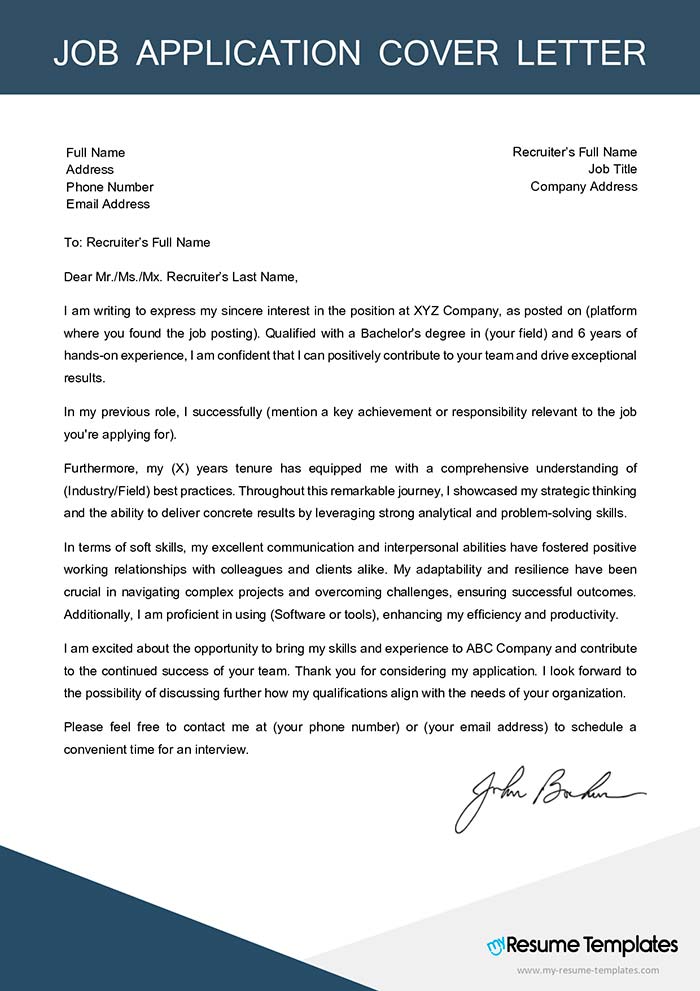
How useful was this post?
Average rating 4.9 / 5. Vote count: 54
Get this free cover letter sample for any job in Word format now
This free sample cover letter for job applications is ready to download in Word format. A well-written cover letter introduces you to potential employers, providing a glimpse into your personality, skills, and qualifications. This template helps you do that and more. Download it now!
- File format: Word (Microsoft)
- File size: 79 KB
- Ready-to-use: fast, easy, and free
According to a recent survey, 83% of recruiters agree that a cover letter with your job application is crucial even today. This official document should not be viewed as an obligation , but rather as a chance to showcase your candidacy to the hiring team.
If you’ve never included a cover letter with your job applications, you should start doing it now.
Here’s a step-by-step guide to writing a persuasive cover letter for job application . Keep reading, as we’ve also included a job application cover letter template to make it easy for you to get started.
Cover Letter example for Job Application (Text Format)
Full Name Address Phone Number Email Address
Hiring Manager’s Full Name Job Title Company Name Company Address
To: Hiring Manager Full Name, Date
Dear Mr./Ms./Mx. Hiring Manager Last Name,
I am writing to express my sincere interest in the (Job Title) position at (Company Name), as posted on (platform where you found the job posting). Qualified with a Bachelor’s degree in (your field) and 6 years of hands-on experience, I am confident that I can positively contribute to your team and drive exceptional results.
In my previous role at (Previous Company), I successfully (mention a key achievement or responsibility relevant to the job you’re applying for).
Furthermore, my (X) years tenure at (Previous Company) has equipped me with a comprehensive understanding of (Industry/Field) best practices. Throughout this remarkable journey, I showcased my strategic thinking and the ability to deliver concrete results by leveraging strong analytical and problem-solving skills.
In terms of soft skills, my excellent communication and interpersonal abilities have fostered positive working relationships with colleagues and clients alike. My adaptability and resilience have been crucial in navigating complex projects and overcoming challenges, ensuring successful outcomes. Additionally, I am proficient in using (Software or tools), enhancing my efficiency and productivity.
I am excited about the opportunity to bring my skills and experience to (Company Name) and contribute to the continued success of your team. Thank you for considering my application. I look forward to the possibility of discussing further how my qualifications align with the needs of your organization.
Please feel free to contact me at (your phone number) or (your email address) to schedule a convenient time for an interview.
Sincerely, Leah Richards
6 Steps To Crafting a Winning Cover Letter for Job Application
Recruiters are busy individuals, so they appreciate cover letters that are clear , structured, and, of course, purposeful. To ensure your application doesn’t end up in the reject pile, follow the steps below to craft a winning cover letter for job application:
1. Research the job you are applying for
Before you begin your job application cover letter, research the company or industry you are applying to. Every job has different requirements; to get noticed by recruiters, it’s crucial to comply with those conditions .
Here are a few things you need to research before starting with your job application cover letter:
- Job requirements : Read the job description to understand what recruiters seek. Highlight the essential skills or qualities so you can later integrate them into your cover letter.
- Know the company you’re applying to : Skim through the firm’s website to learn about its long-term goals and culture. If the organization you’re applying to lacks social media handles, you can inquire about them with your friends or colleagues as well.
- Identify the hiring manager’s name : Addressing the recruiters by their full name indicates that you have invested time to find out who will read your cover letter. To discover the hiring manager’s name, you can refer to the job description, search the company on LinkedIn, or even explore the company’s website.
2. Outline sections of your cover letter for job application
Breaking down your cover letter into sections makes it easier for recruiters to follow . It minimizes confusion and lets them quickly locate key information, such as your qualifications, experiences, and goals.
A compelling cover letter for job application would typically contain several sections, including:
- Comprehensive header containing your and the employer’s contact information.
- Formal salutations or greetings.
- Catchy introductory paragraph.
- Middle body: containing qualifications, skills, and experiences.
- Closing paragraph: to thank the recruiter for their time.
3. Sell your abilities in your job application cover letter
When showcasing your skills in a cover letter, it’s crucial to go beyond mere statements and provide concrete evidence to demonstrate your abilities.
An effective approach is identifying the key skills mentioned in the job description. Additionally, select specific examples from your previous experiences that align with the identified accomplishments to strengthen your stance. You can draw on instances from your previous jobs, academic projects, or even extracurricular activities.
Moreover, if you aim to add credibility to your achievements, consider quantifying them . For instance, if you improved a process, mention the percentage of improvement.
Here’s an excellent example of how to utilize the above teachings in a job application cover letter:
“ In my previous role, I spearheaded weekly team meetings, improving communication flow and collaboration among team members. This resulted in a 20% increase in project efficiency, showcasing my ability to convey complex ideas in a clear and concise manner. “
4. Mention your hard and soft skills
Your skills are valuable assets that set you apart from other candidates . Incorporating your expertise into your cover letter clearly demonstrates how you can contribute to the company’s success.
A persuasive job application cover letter example will have the below essential technical skills:
- Proficiency in programming languages.
- Data analysis.
- Know-how of Microsoft Word Suite.
- Graphic Designing.
In addition to hard skills, your soft skills also play a significant role in conveying your effectiveness in the workplace to recruiters.
As you craft your job application cover letter, consider emphasizing the following soft skills:
- Ability to convey information clearly, both verbally and in writing.
- Open to collaborating with others to achieve common goals.
- Flexible and open to change in the working environment.
- Capability to identify challenges and develop practical solutions.
5. Prove your enthusiasm to the employers
Highlighting your accomplishments and skills is crucial for a job-winning cover letter . However, another critical element in establishing credibility is expressing enthusiasm to potential employers using impactful action words.
Clearly state why you are excited about the role. Is it the chance to work with a talented team or the alignment between your skills and the job requirements? Be specific .
Here’s an example to make it more clear:
“I am genuinely excited about the prospect of contributing my skills and passion to ABC Company. I am confident that my software development and my enthusiasm for driving innovative solutions make me an ideal fit for your team.”
Moreover, you can also mention specific achievements or projects of the company that inspire you. This demonstrates that you’ve researched and are genuinely interested in the organization.
For instance, you can add:
“ The innovative projects undertaken by ABC Company, particularly the groundbreaking development of the XYZ platform, resonate deeply with my career aspirations. “
6. Close your job application cover letter with the appropriate CTA
Ending your cover letter with a compelling Call to Action (CTA) is crucial in expressing your eagerness for further discussion. Consider the following steps when crafting the ending paragraph of your job application cover letter:
- Express gratitude : Start by thanking the recruiter for their time and consideration. A simple “ Thank you for your consideration ” is a polite way to express appreciation.
- Restate your interest : Remind the recruiters that you’re genuinely interested in the job by highlighting how your skills align with what they seek.
- Showcase eagerness to discuss things further : Clearly express your readiness to discuss your qualifications and skills by providing your contact information.
For instance, you can mention:
“I am eager to further discuss how my skills and experiences align with (Company Name)’s goals. Please feel free to contact me at [your phone number] or [your email address] to schedule a convenient time for an interview.”
- Conclude with a formal sign-off : Finally, conclude your job application cover letter with a formal salutation such as “ Sincerely, ” followed by your full name.
Job Resume Template
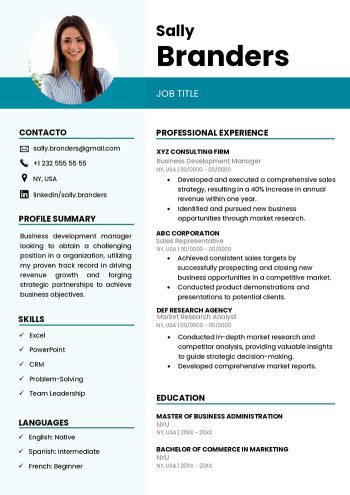
Cover Letter for Job Application Key Takeaways
- Research the company you’re applying to before crafting your cover letter.
- Divide your cover letter into five sections: header, salutation, introductory and middle paragraph, and closing body.
- Instead of mentioning your abilities, sell them to the recruiters using compelling words .
- Constantly restate your enthusiasm for the role throughout your job application cover letter.
- Conclude your cover letter by thanking the hiring manager and providing your contact information for further discussions .
Free Resume Templates to Download in Word
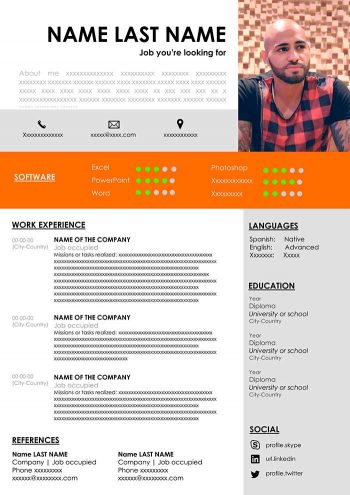

Job Application Letter
Job application letter maker.
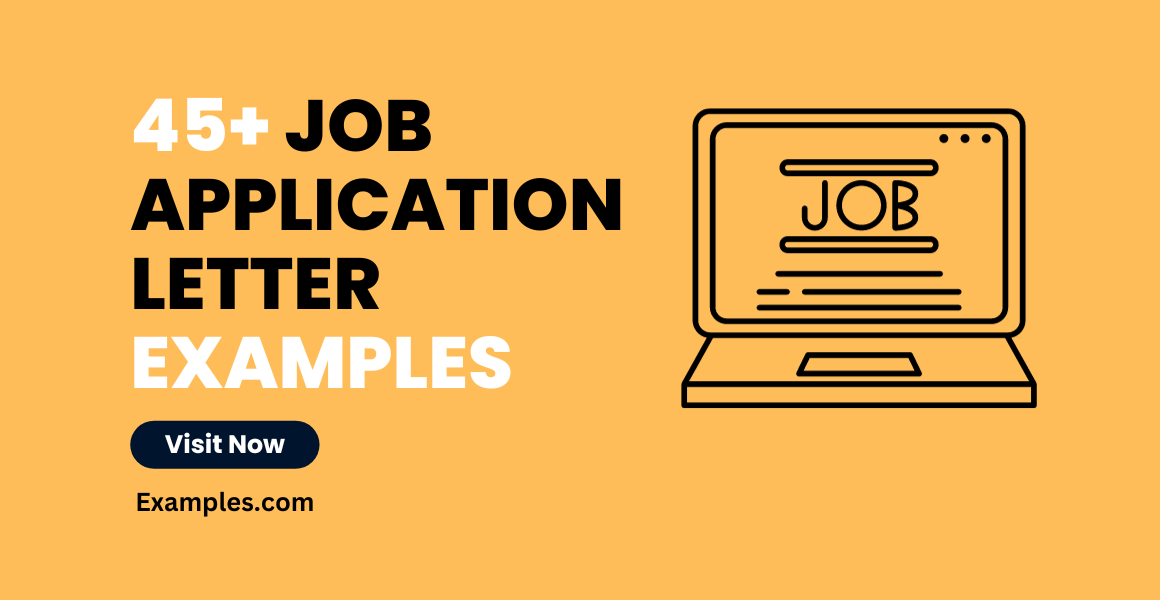
A Job Application Letter is a critical tool for making a positive first impression on potential employers. It’s your chance to showcase your skills and enthusiasm for the position. This guide, complete with letter examples , will walk you through the process of creating a compelling application letter. You’ll learn how to highlight your experiences effectively, tailor your letter to specific jobs, and stand out from other applicants. With these tips and examples, crafting a job application letter that grabs attention becomes an achievable goal.
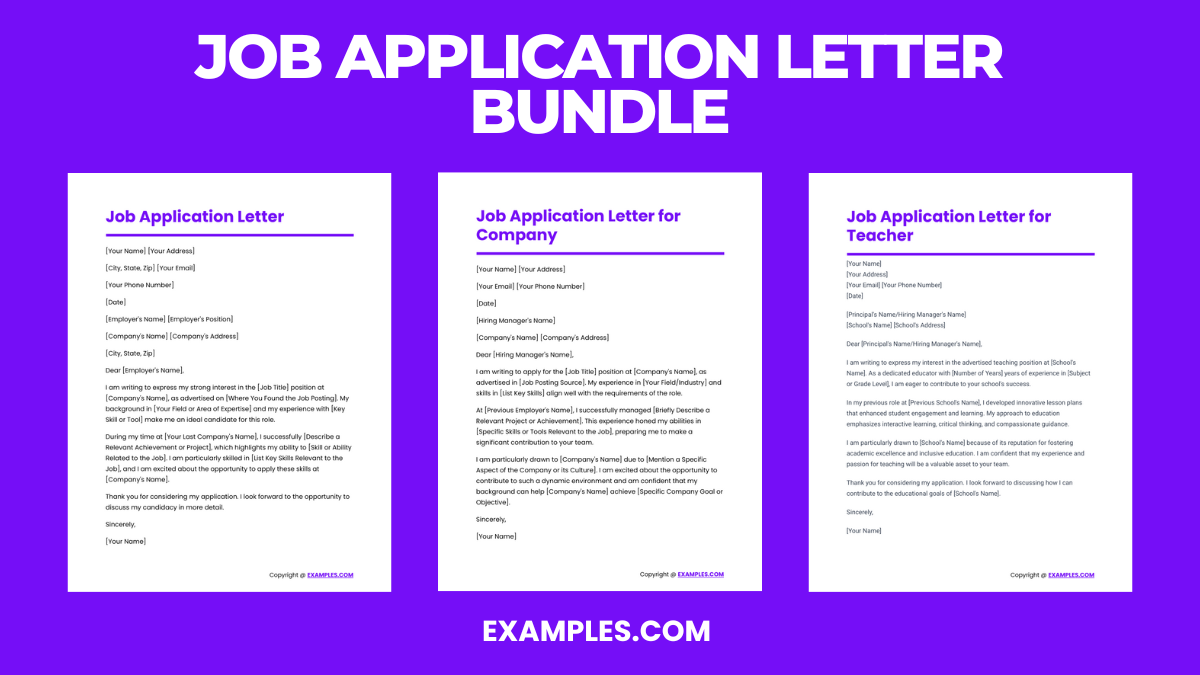
Download Job Application Letter Bundle
Before you can be considered for a recruitment interview, there are several materials that you need to hand to the employer. One of these is the job application letter. This document accompanies your resume in terms of giving information about your qualifications and other deliverable. We have come up with a list of downloadable job application letters that you can use as guides and references. Browse through them so you can come up with a well-structured, impressive and efficient job application letter.
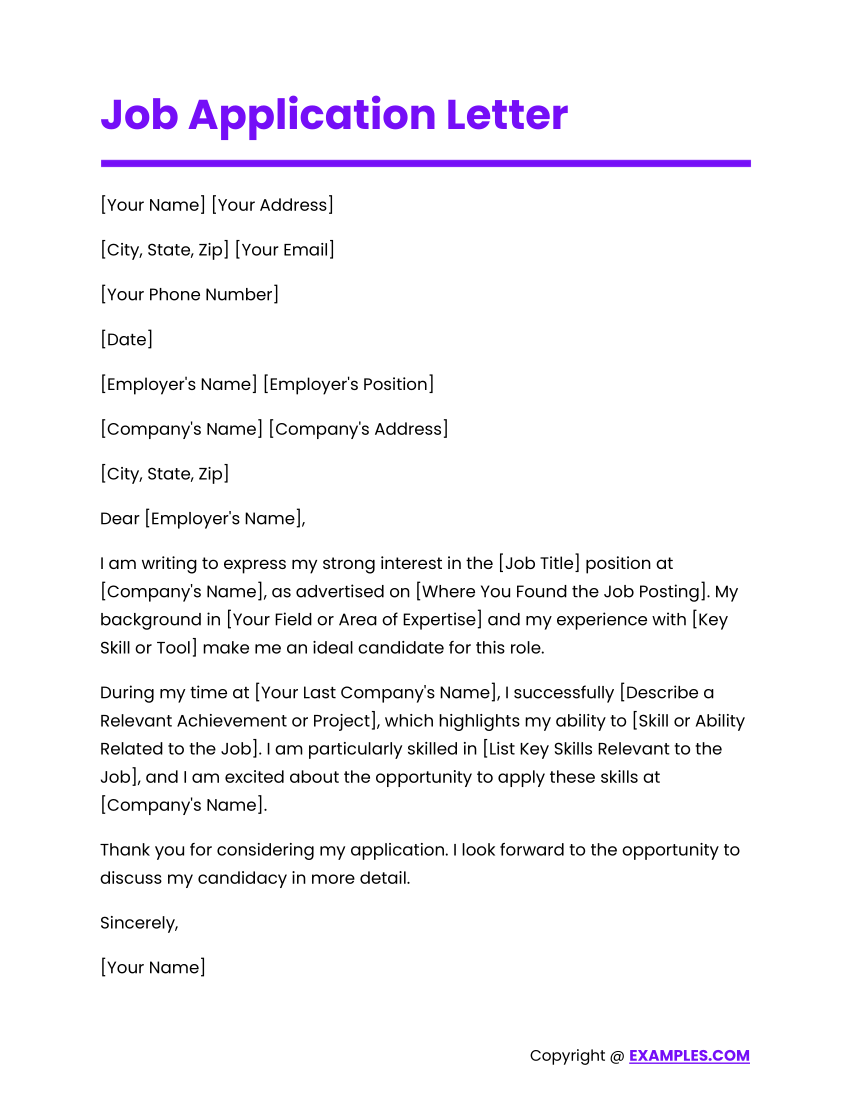
Size: 13 KB
Free Download
Job Application Letter for Company
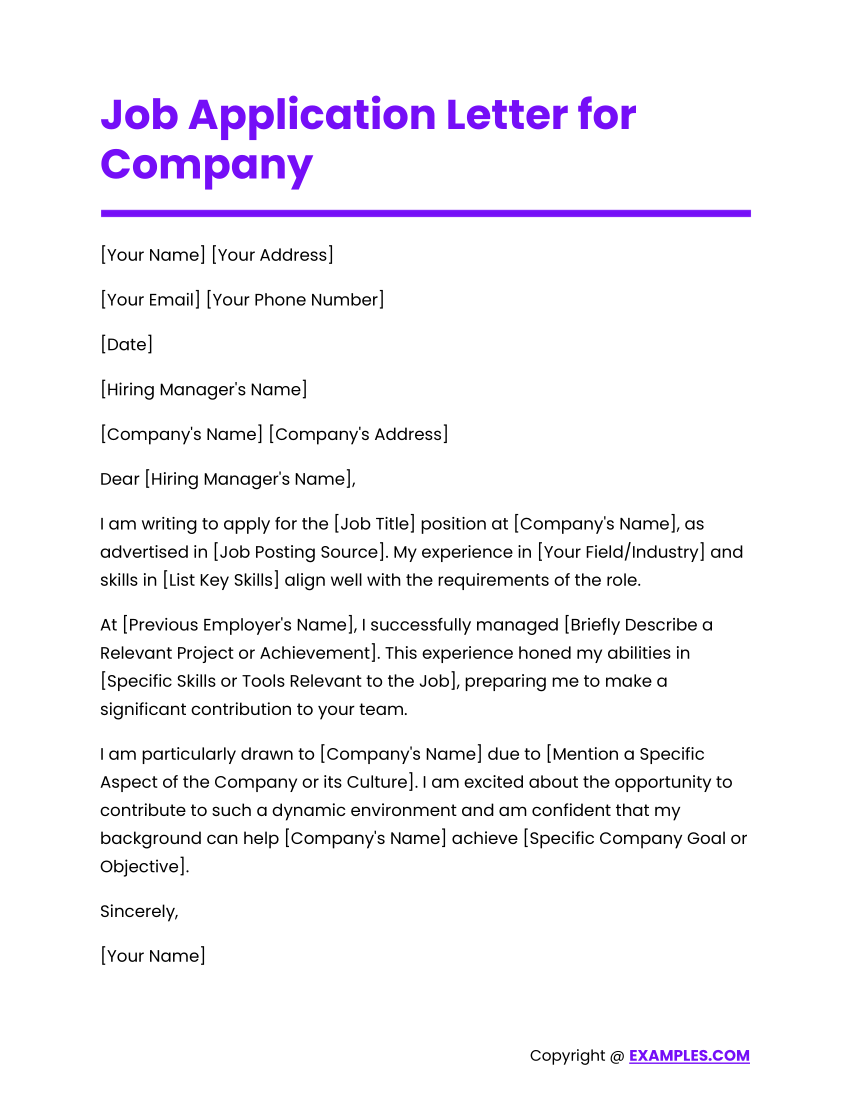
Job Application Letter for Teacher
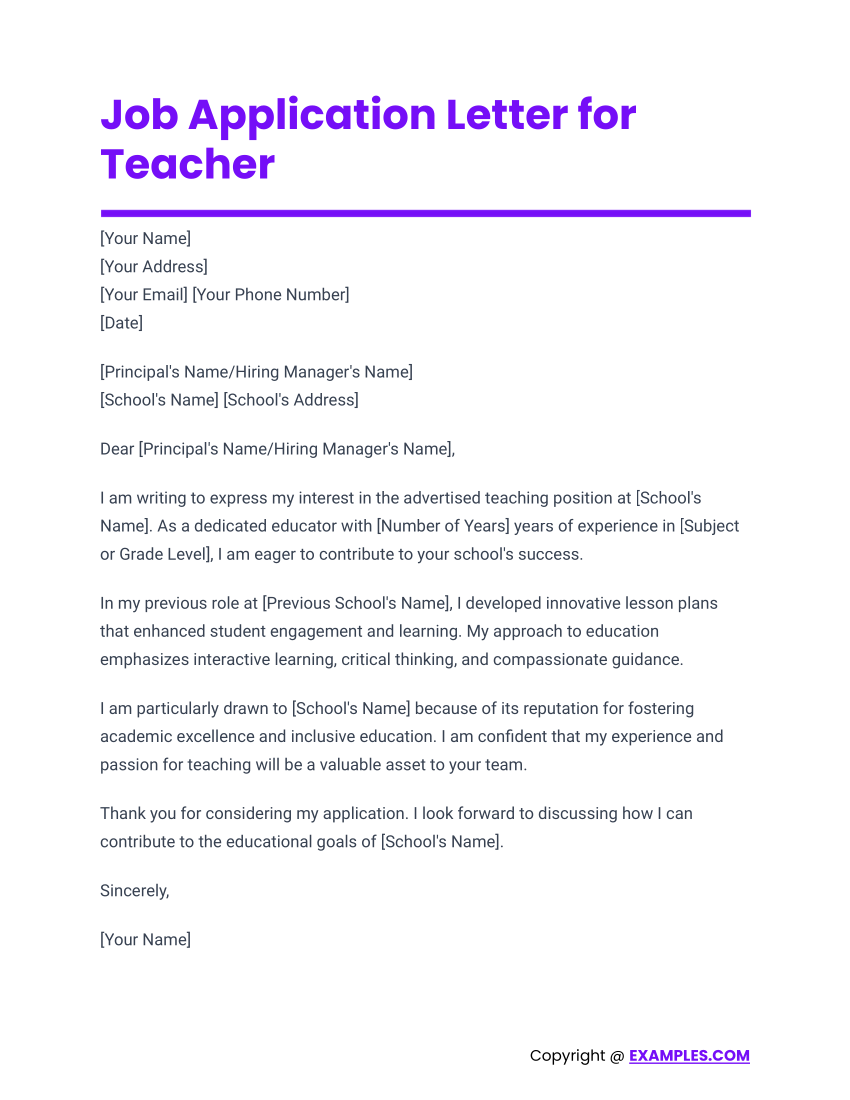
Size: 19 KB
Formal Job Application Letter Template
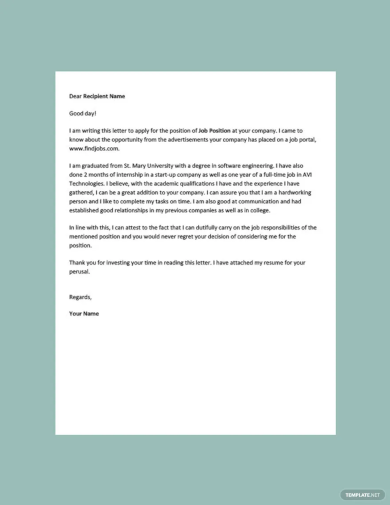
- Google Docs
Size: 59 KB
Job Application Letter for Undergraduate Student Template
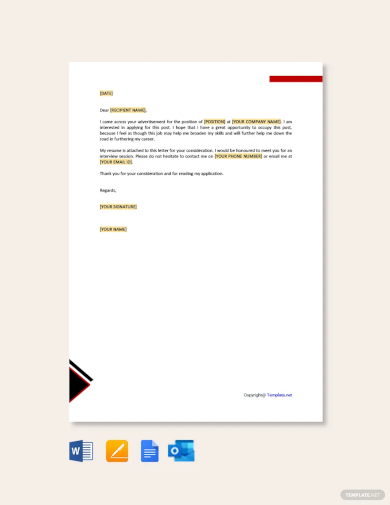
- Apple Pages
Size: 38 KB
Marketing Assistance Job Application Letter Template
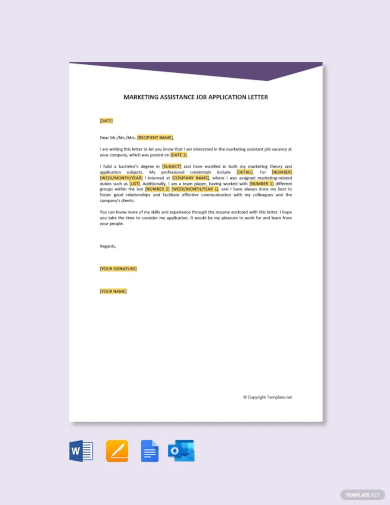
Size: 51 KB
Job Application Letter For Junior Accountant Template
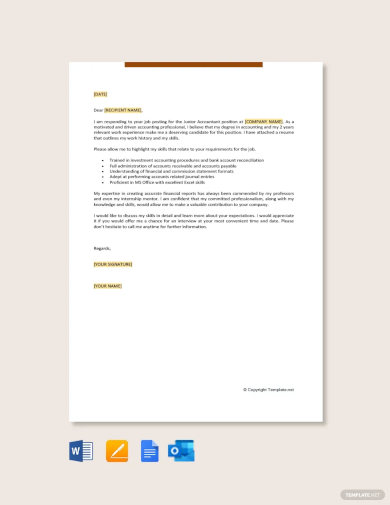
Size: 48 KB
Job Application Letter for Employment Template
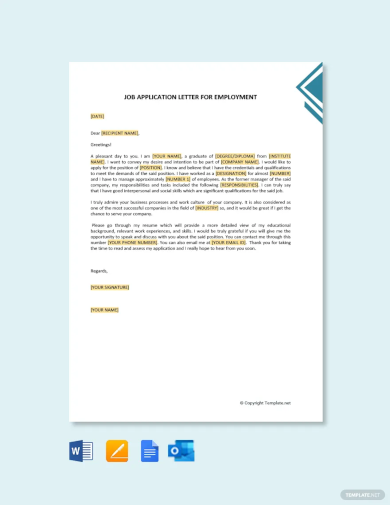
Size: 62 KB
Fresher Job Application Letter Template
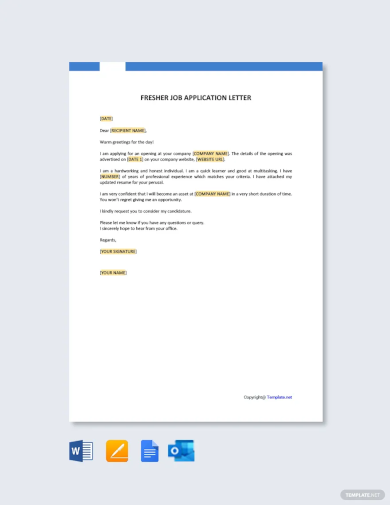
Size: 40 KB
Email Job Application Letter Template
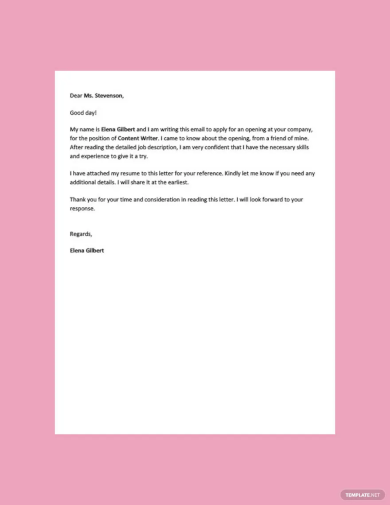
Job Application Letter for Junior Doctor Template
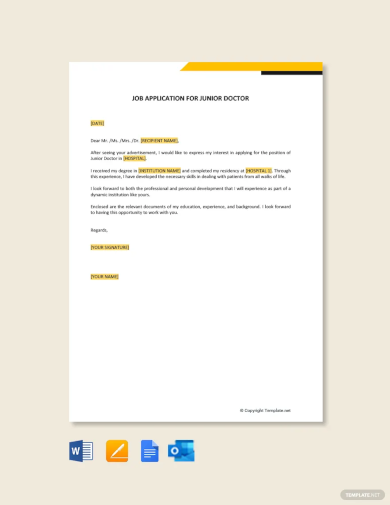
Free Job Application Letter For Accountant Assistant Template
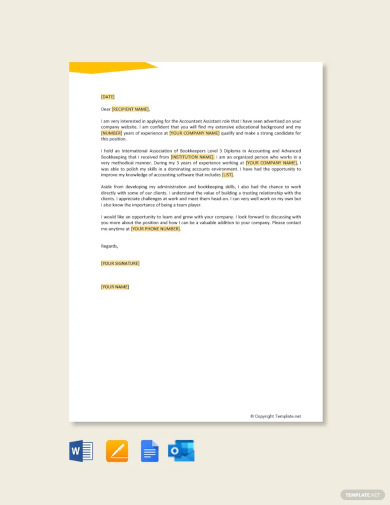
Size: 57 KB
Job Application Letter Template For Software Engineer
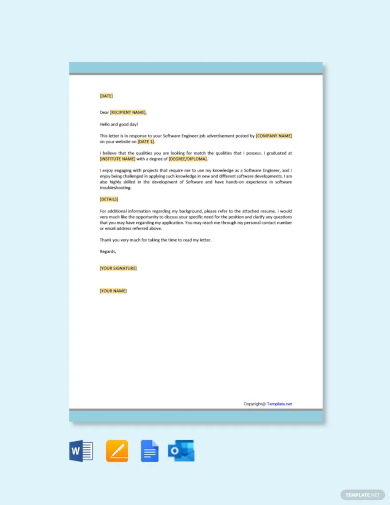
Job Application Letter Template For Assistant
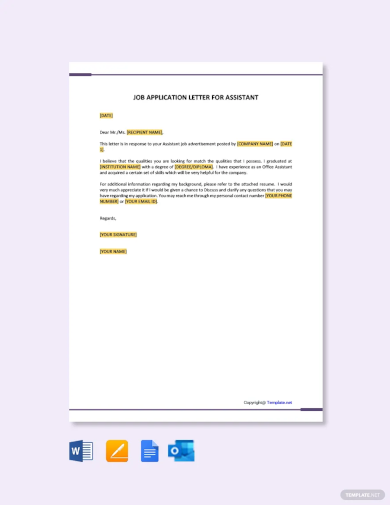
Size: 43 KB
Job Application Letter Template For Accountant
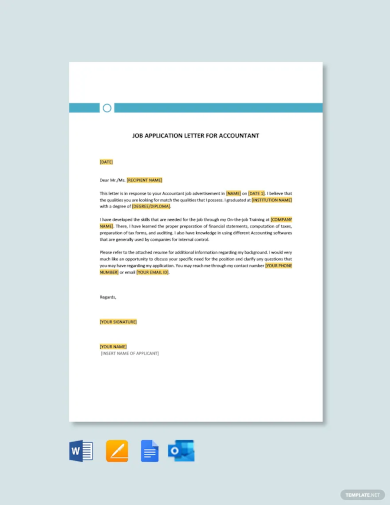
Size: 50 KB
Job Application Letter For Receptionist Template
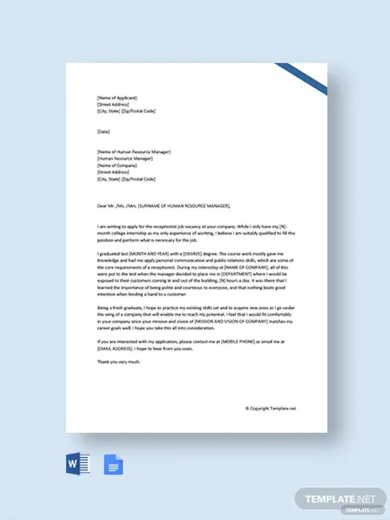
Size: 75 KB
Job Application Letter For Receptionist Position Template
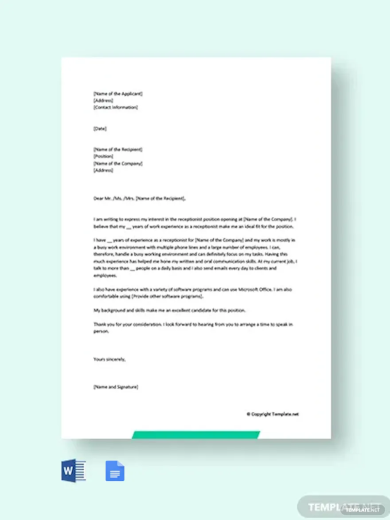
Size: 66 KB
Job Application Letter for Executive Assistant Template
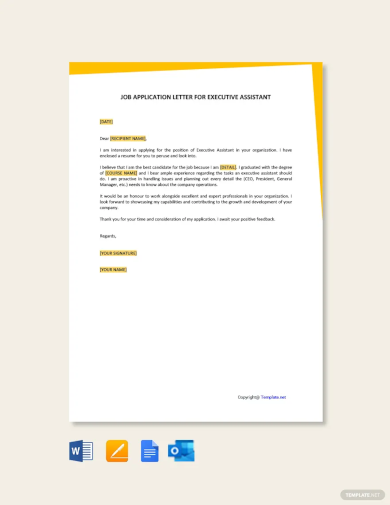
Job Application Letter for Executive Template
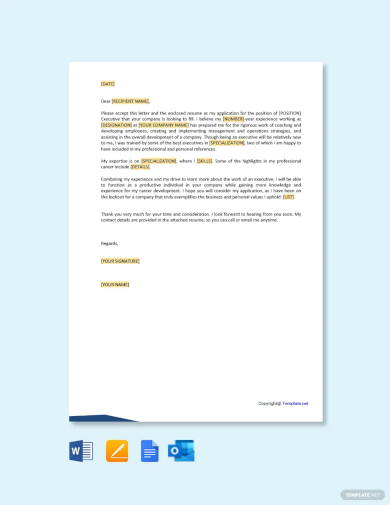
Size: 58 KB
Job Application Letter for Executive Secretary Template
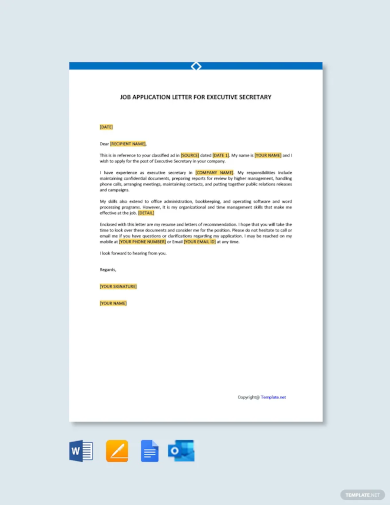
Job Application Letter For Graphic Designer Template
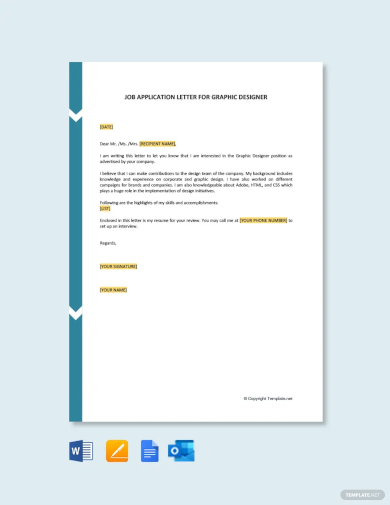
Job Application Letter for Assistant Professor Template
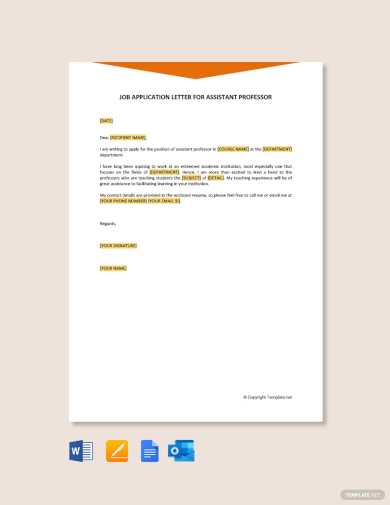
Size: 42 KB
Doctor Job Application Letter Template
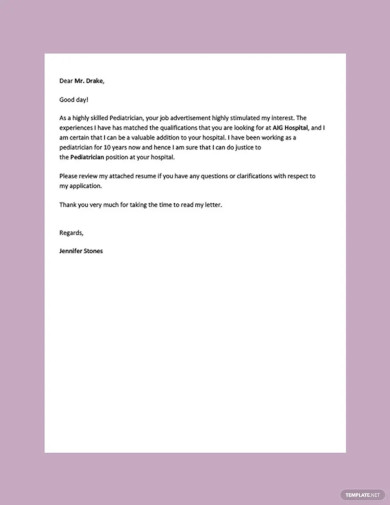
Size: 18 KB
Clerk Job Application Letter Template
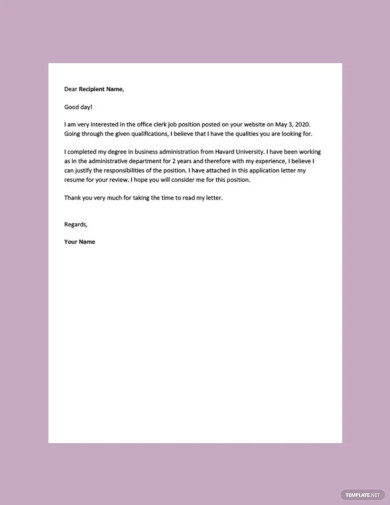
Size: 17 KB
Free Job Application Letter for Assistant Engineer Template
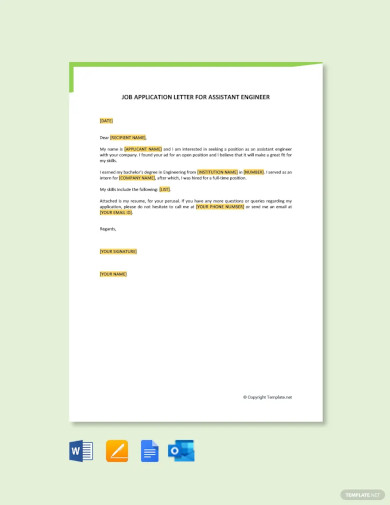
Size: 20 KB
Free Job Application Letter for Assistant Manager Template
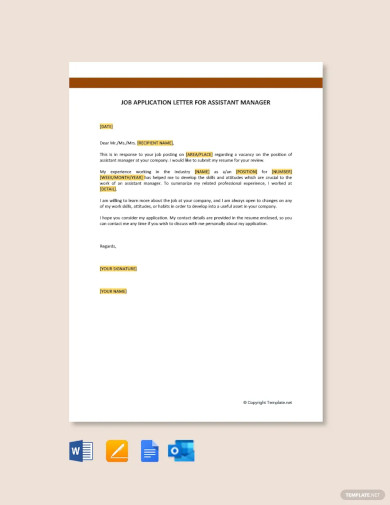
Size: 22 KB
Free Job Application Letter For Engineer Template
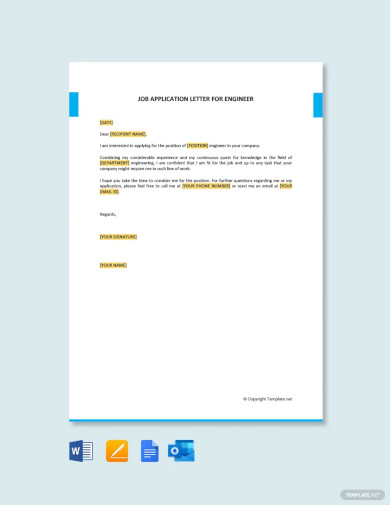
Free Job Application Letter to Marketing Manager Template
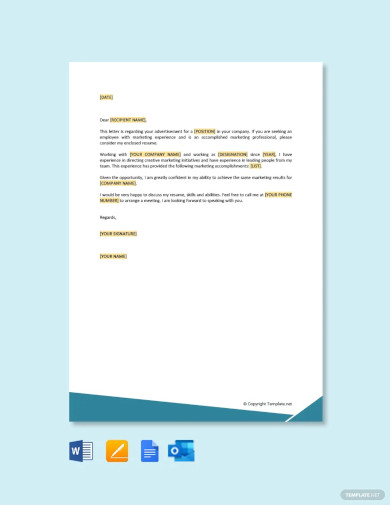
Job Application Letter – Sample and Tips Example
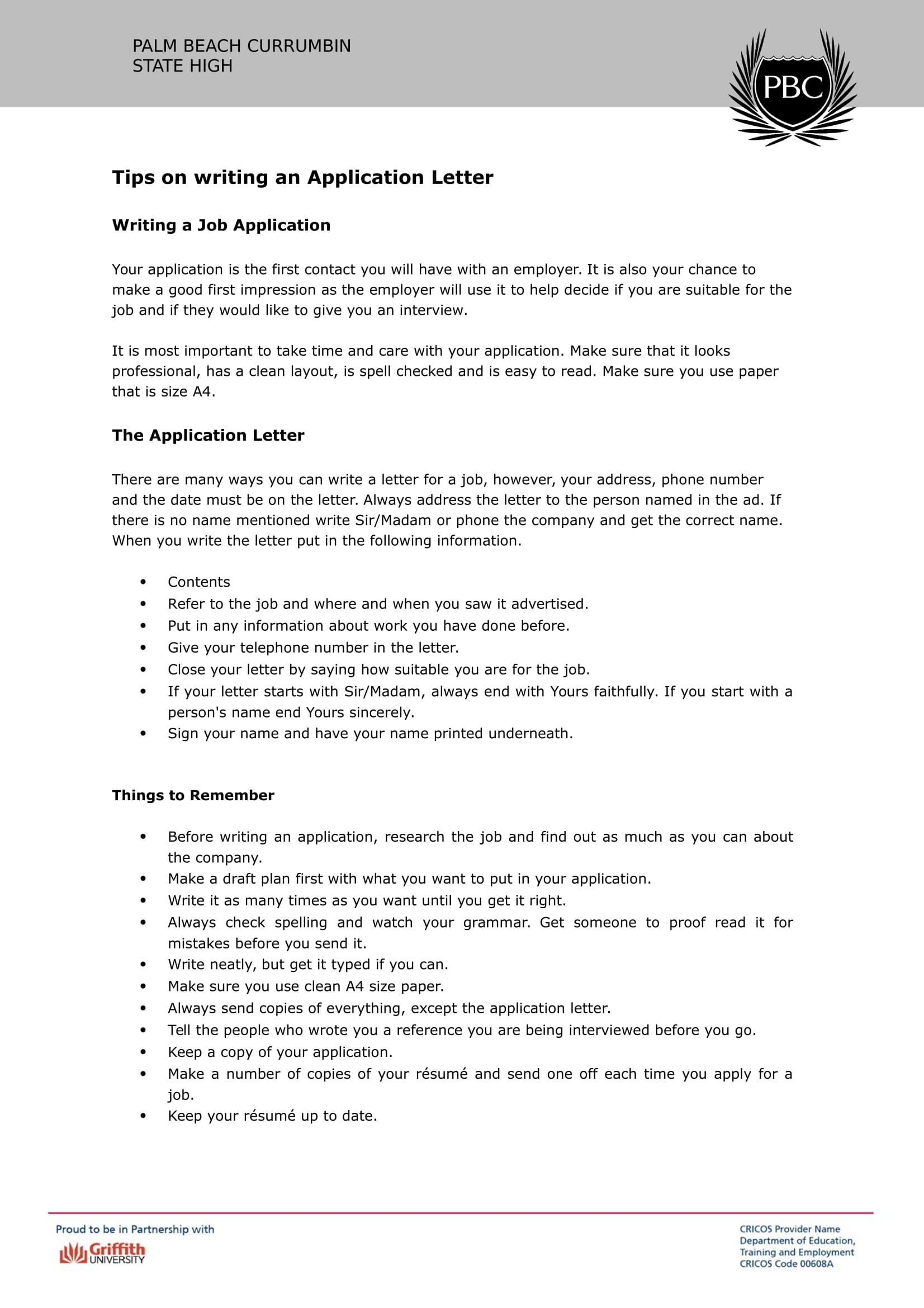
Size: 244 KB
Good Application Letter Example
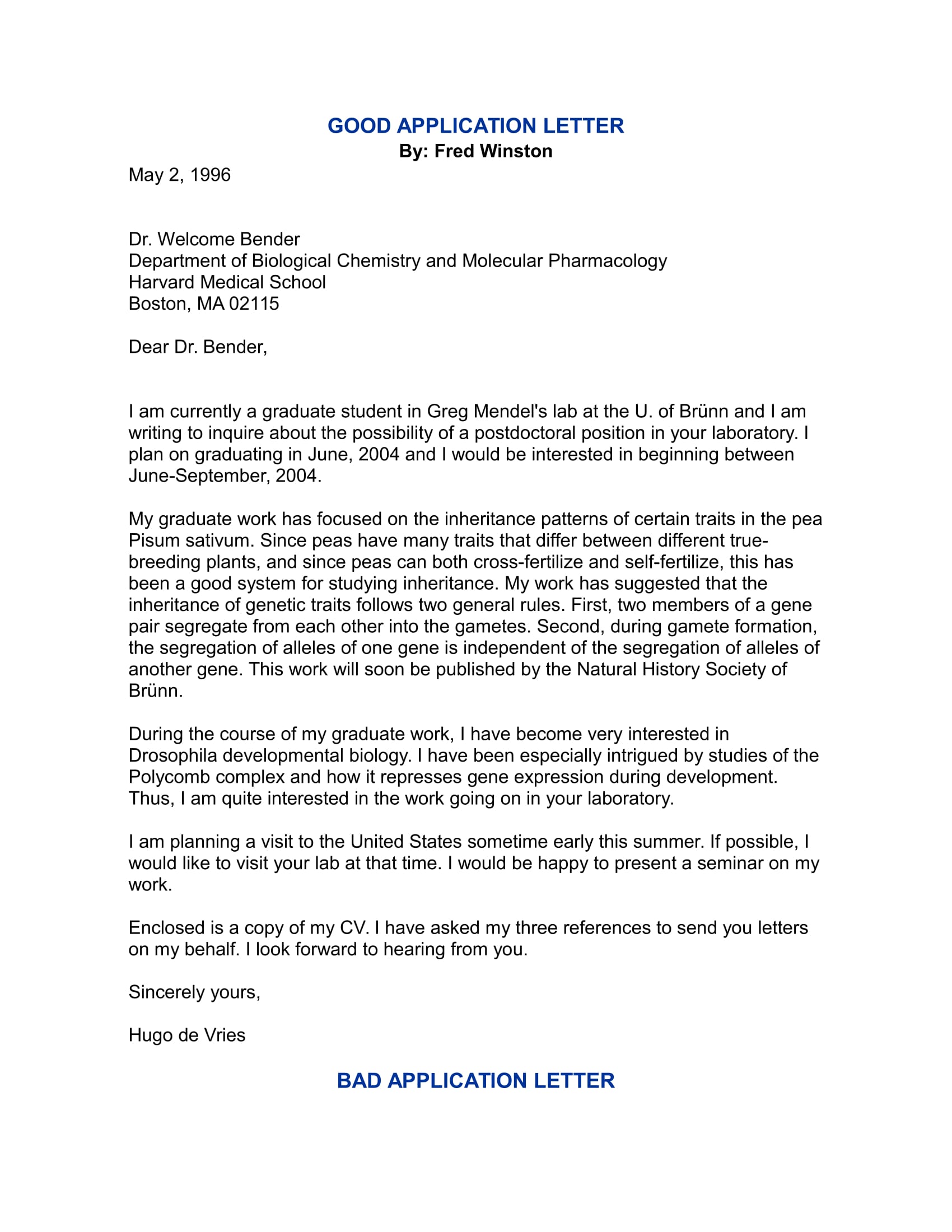
Application Letter / Cover Letter Example
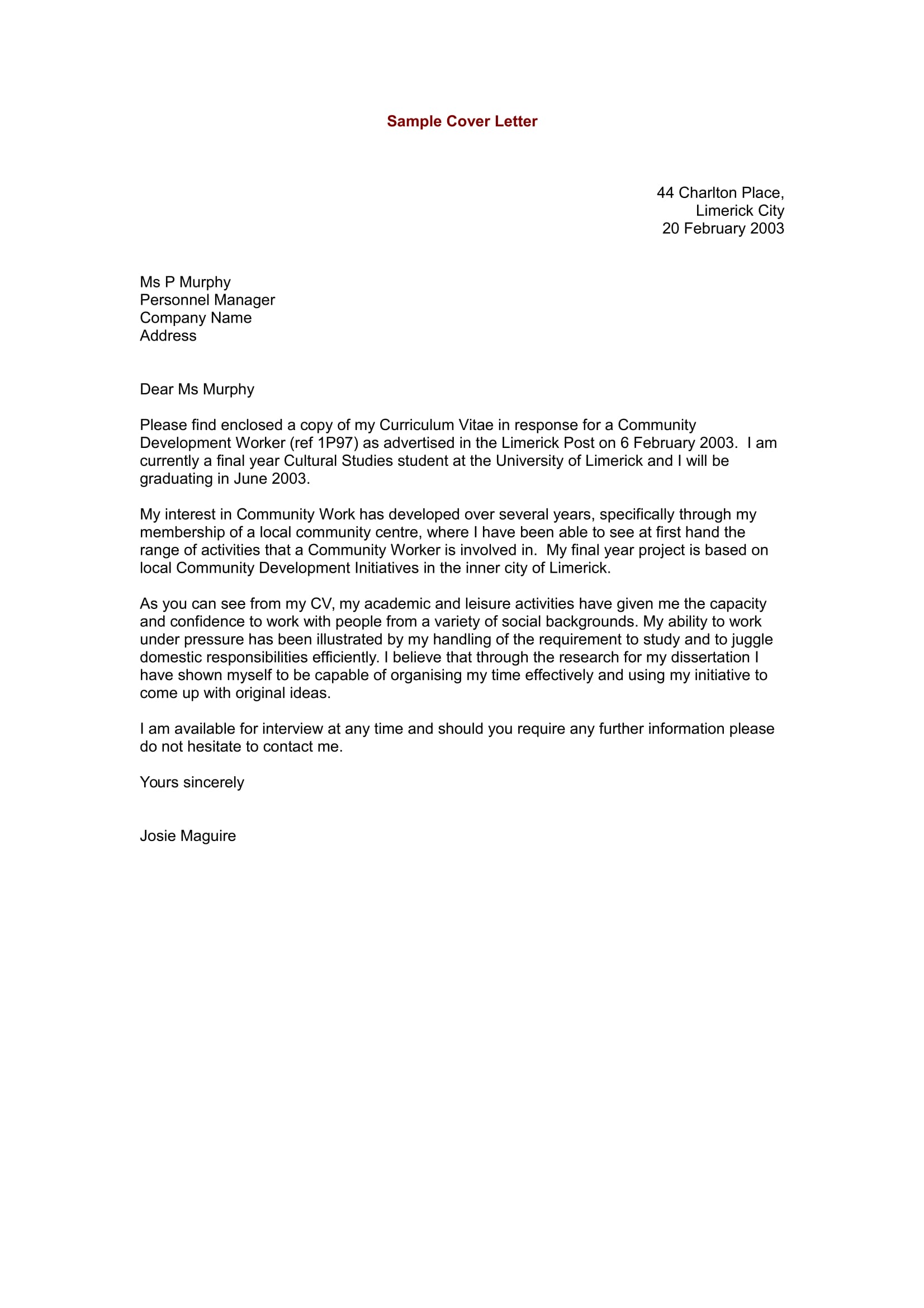
Do You Really Need a Job Application Letter?
It is already common knowledge that a resume is one of the most essential items that you need to prepare whenever you plan to apply for a job. However, it is not the only document that can affect the decisions of employers. Aside from a reference letter written by another person, you can also create another letter that can help you in your application.
A job application letter, or a cover letter , can also greatly impact the way employers look at you as a candidate. If you can create a comprehensive and strategically-formulated cover letter, then you can have higher chances of getting a call for an interview or for the next phases of the recruitment. Here are some of the reasons why we think that making a job application letter should also be prioritized whenever you plan to immerse in the processes of searching and applying for vacant job positions open for employment:
- A job application letter can help you easily target the demands of the work position. If there are already specifications with the minimum requirements of the job designation, your job application can provide information and instances that are aligned with what the company is looking for. Even if a resume can also do this, a job application letter is actually more thorough as it allows you to be more detailed when discussing your deliverable. You may also see email cover letter examples .
- A job application letter can make you more desirable as a candidate. This document does not only present your skills and potential. You can also specify the items that you know about the business and its operations. Through this, you can already discuss how you can help the business achieve its goals. If the business can create the perception that you are truly knowledgeable of the specifics of the work position and why you deserve to be hired, then more interest can be given to your application. You may also like business proposal letter examples .
- A job application letter can market your professional qualifications. The further you explain what employers can expect from you, the more they can have an overview of how you can add value to the business. This is the reason why you have to be strategic when placing information in the job application letter. As much as possible, include information that are highly-related to the work post that you are targeting and those that are directly aligned with the corporate vision, mission and objective of the company.
Cover Letter / Job Application Letter – Guidelines and Example
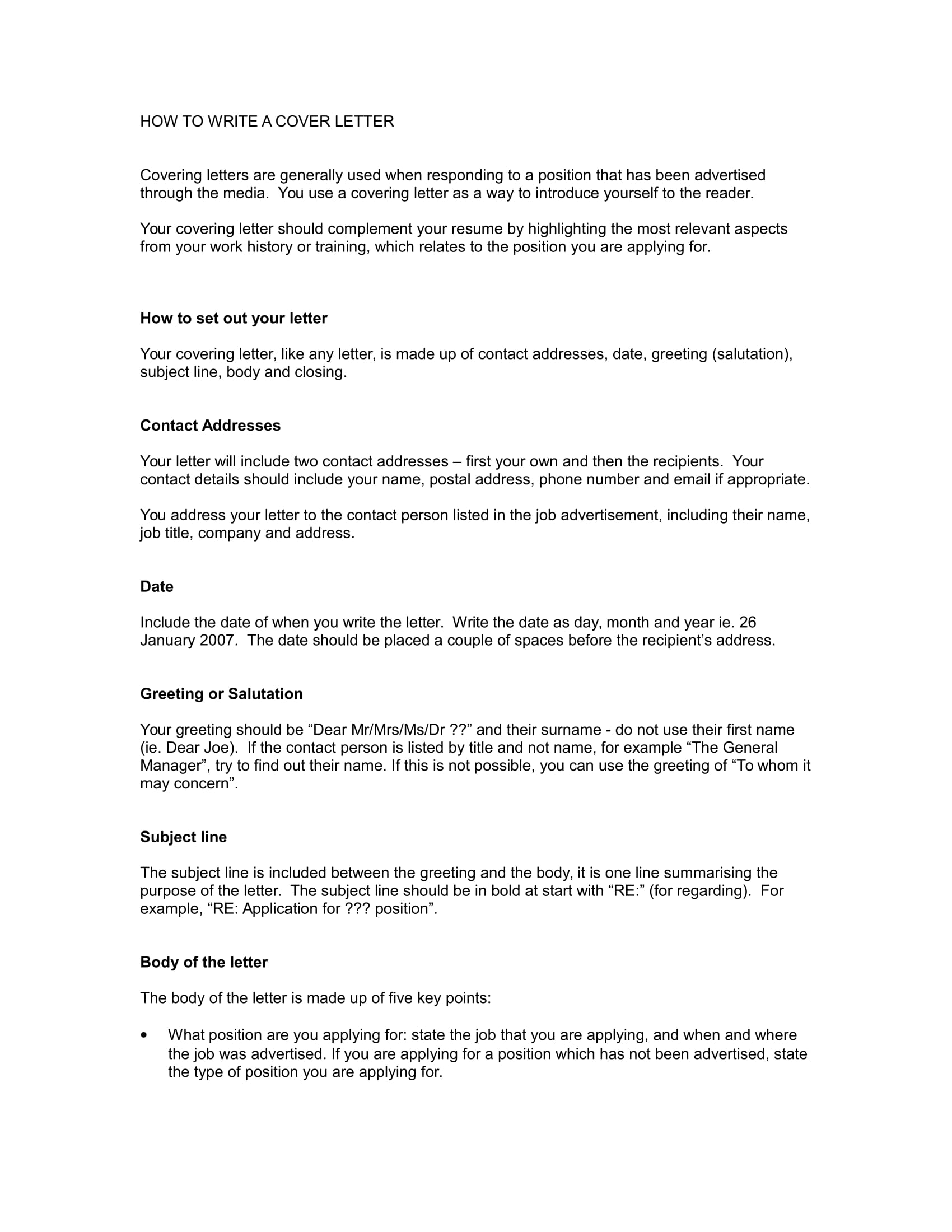
Size: 28 KB
Job Application Letter / Cover Letter Template Example
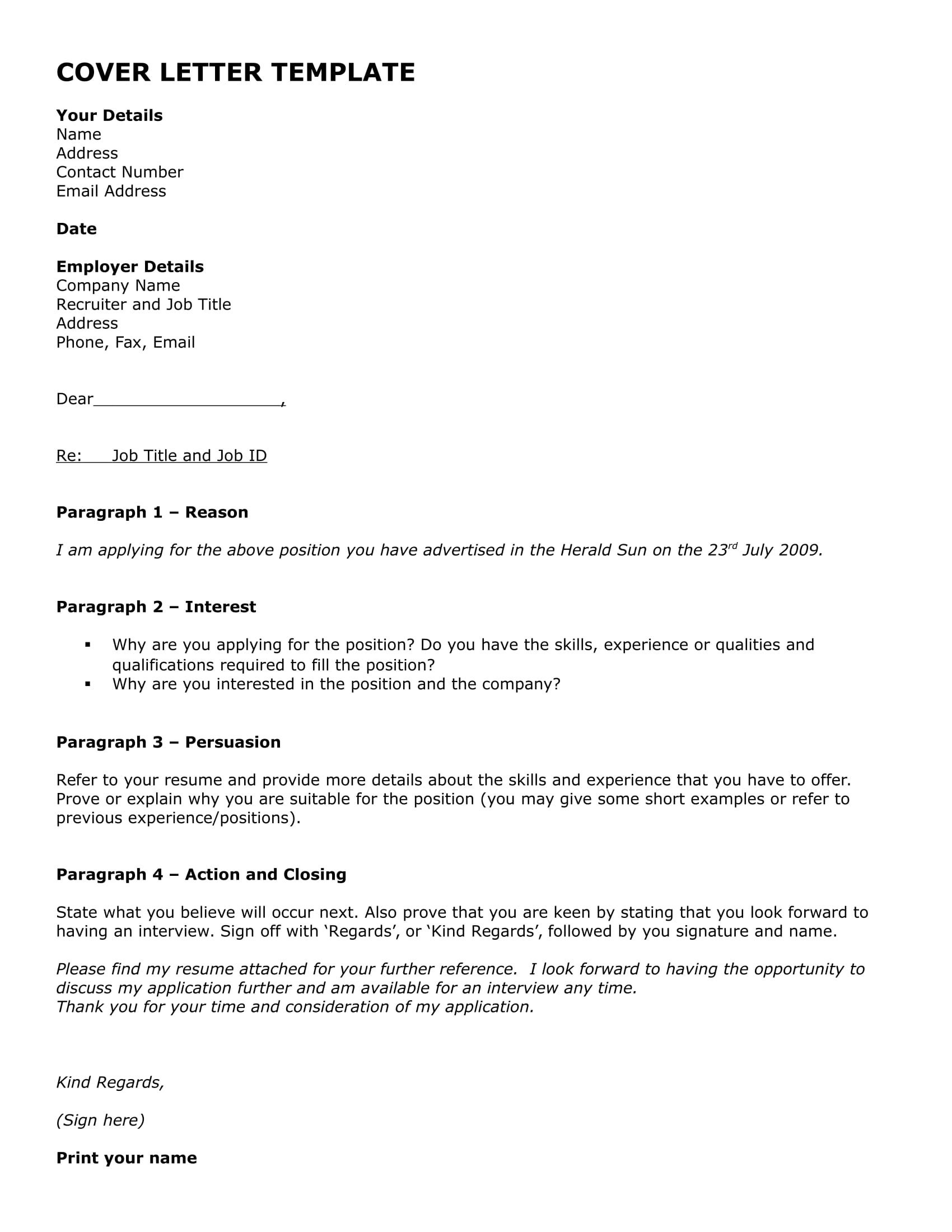
Simple Job Application Letter Example
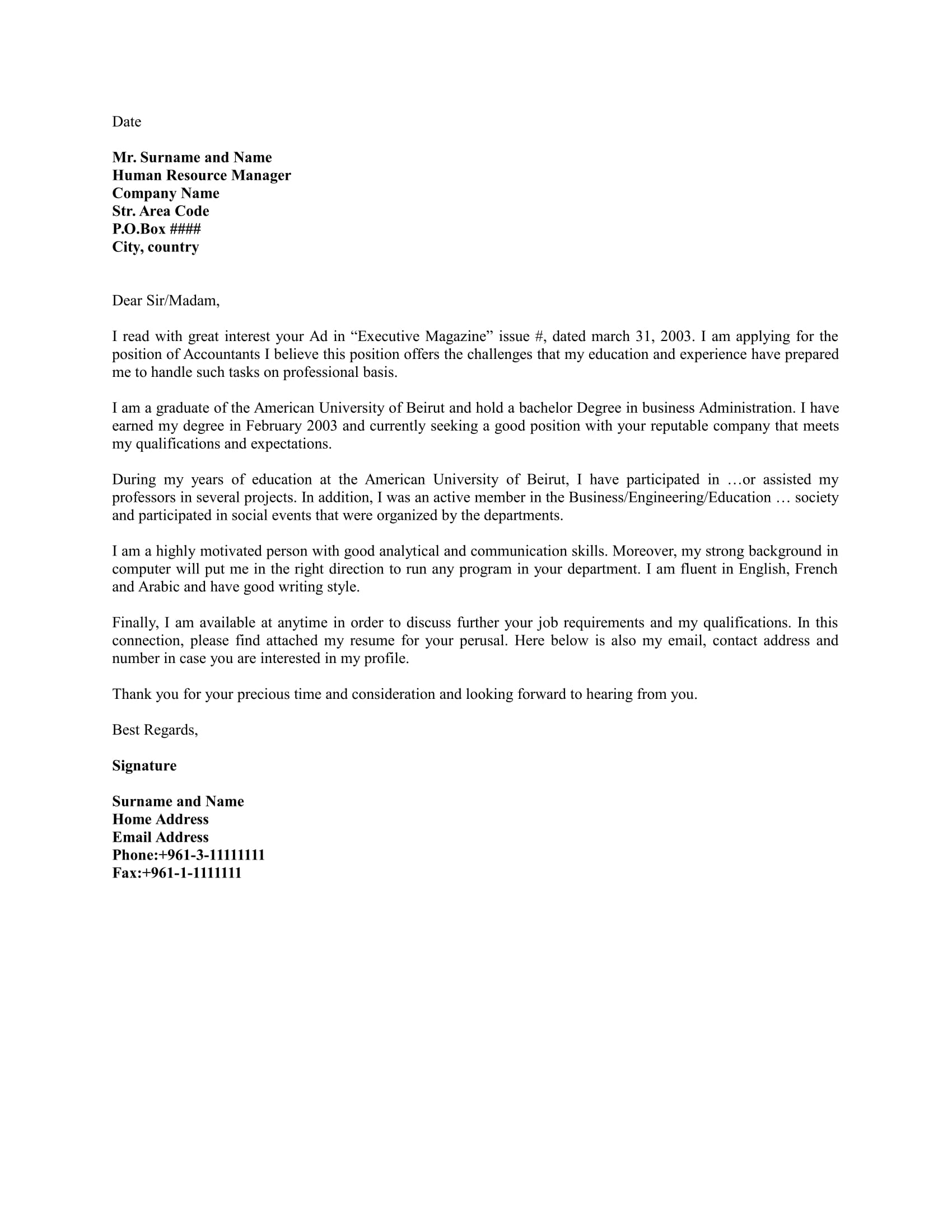
Basic Job Application Letter Example
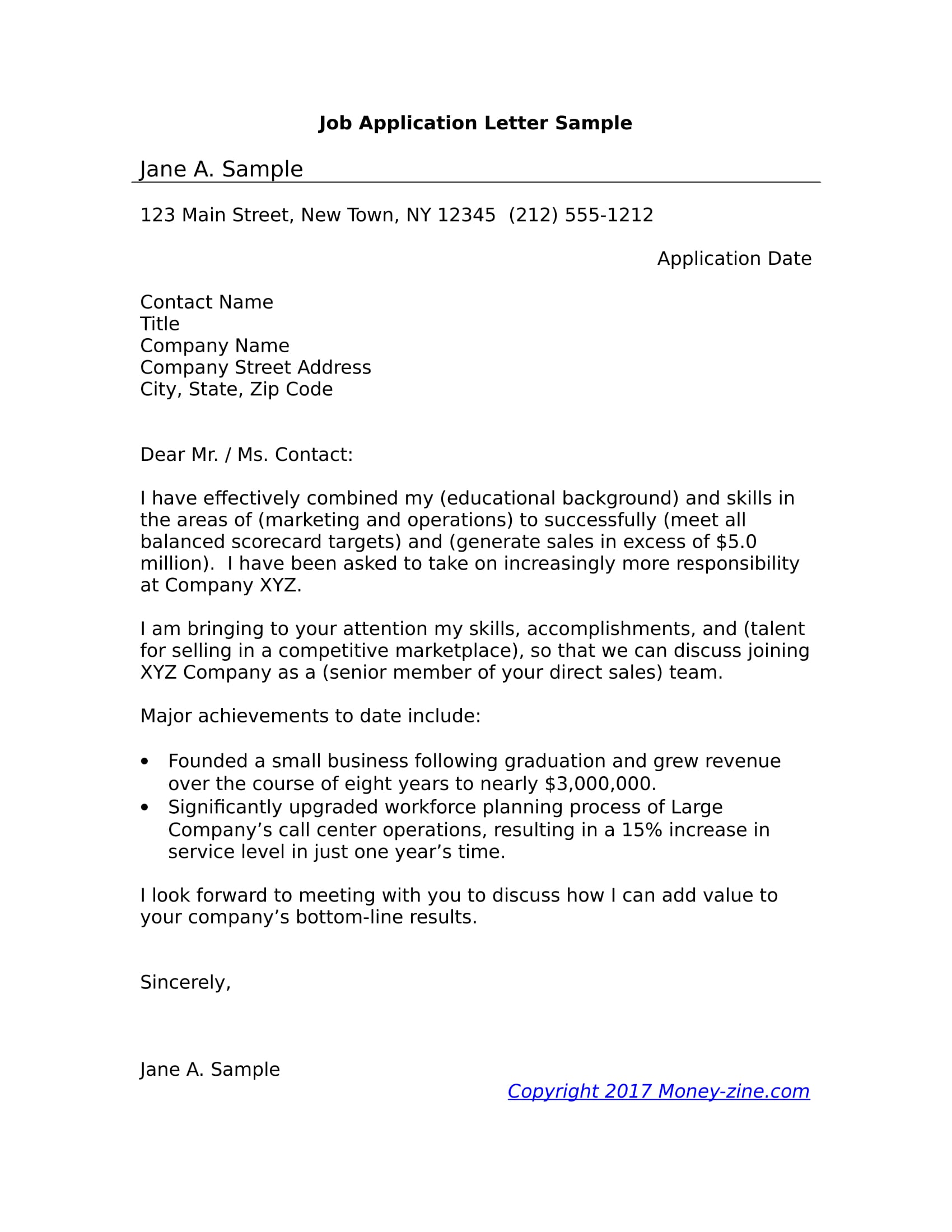
How to Prepare Yourself Before Writing a Job Application Letter
If you want to receive a job appointment letter at the end of the recruitment process, you have to ensure that all the documents that you will submit during your application are on point. The process of developing the content, discussion flow and format of your job application letter is very important.
Unlike how others think of it, a job application letter is actually not that easy to do. Yes, you can just write a letter about your desire to apply for a particular work position any time of the day. However, the question that you need to answer is whether the document that you have written can make you standout from your competitors or not. This is why you have to take your time when planning how to come up with an impressive job application letter. Here is how you can prepare yourself whenever you are already prepared to create your own job application letter:
- Understand the task that you have at hand. It is best for you to research about the development of an outstanding job application letter first before making it. The knowledge and thought that you have about this process can make it easier for you to understand what you need to write in the job application letter.
- Make sure that you will have enough relevant information about your prospective employer and the job position that you would like to be hired for. Being knowledgeable of the brand, operational needs and corporate image of the business can help you associate your skills and other qualifications in a more strategic and targeted manner.
- Think of how your job application letter can impact your chances of being noticed by employers. We never know how businesses select their new hires. Do they look at the resumes first before browsing through the job application letter, or the other way around Do they base their impressions just on your professional profile or they also keenly observe the other supplementary documents that you present? Knowing that you have developed a professional, complete and presentable job application letter can make you more confident in the processes of application which can further boost your confidence in the next phases of the recruitment.
- Gather keywords which can be used in the job application letter. These keywords must be related to the industry where the business is a part of, the demands of the work position that you are applying for, the nature of operations of the employer, and the specifics of the daily job functions expected from the work post open for employment. Remember that your job application letter does not need to be technical and full of terms and jargon. However, you should also not forget that it must be informative.
Cover Letter for Job Application Example
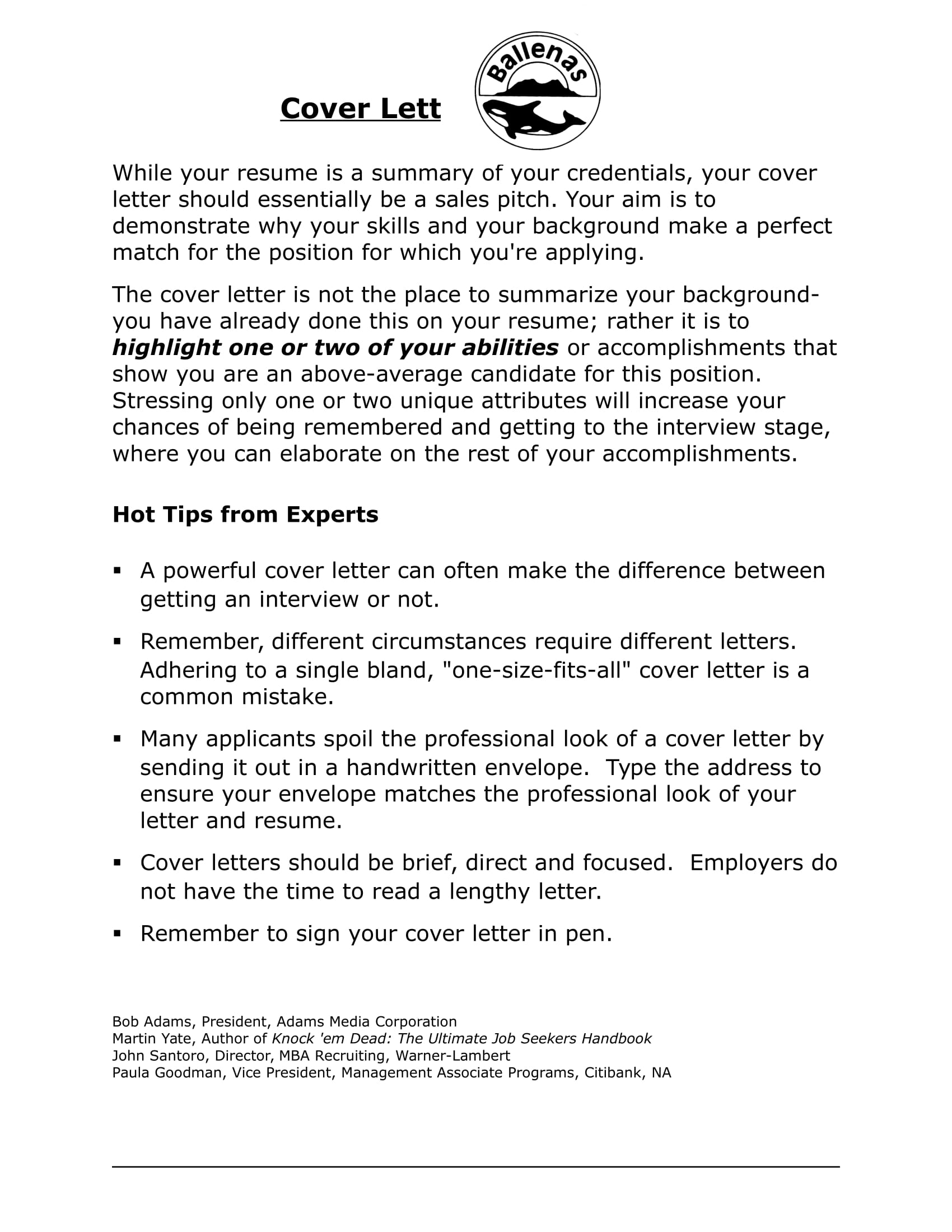
Size: 24 KB
Job Application Letter – Example
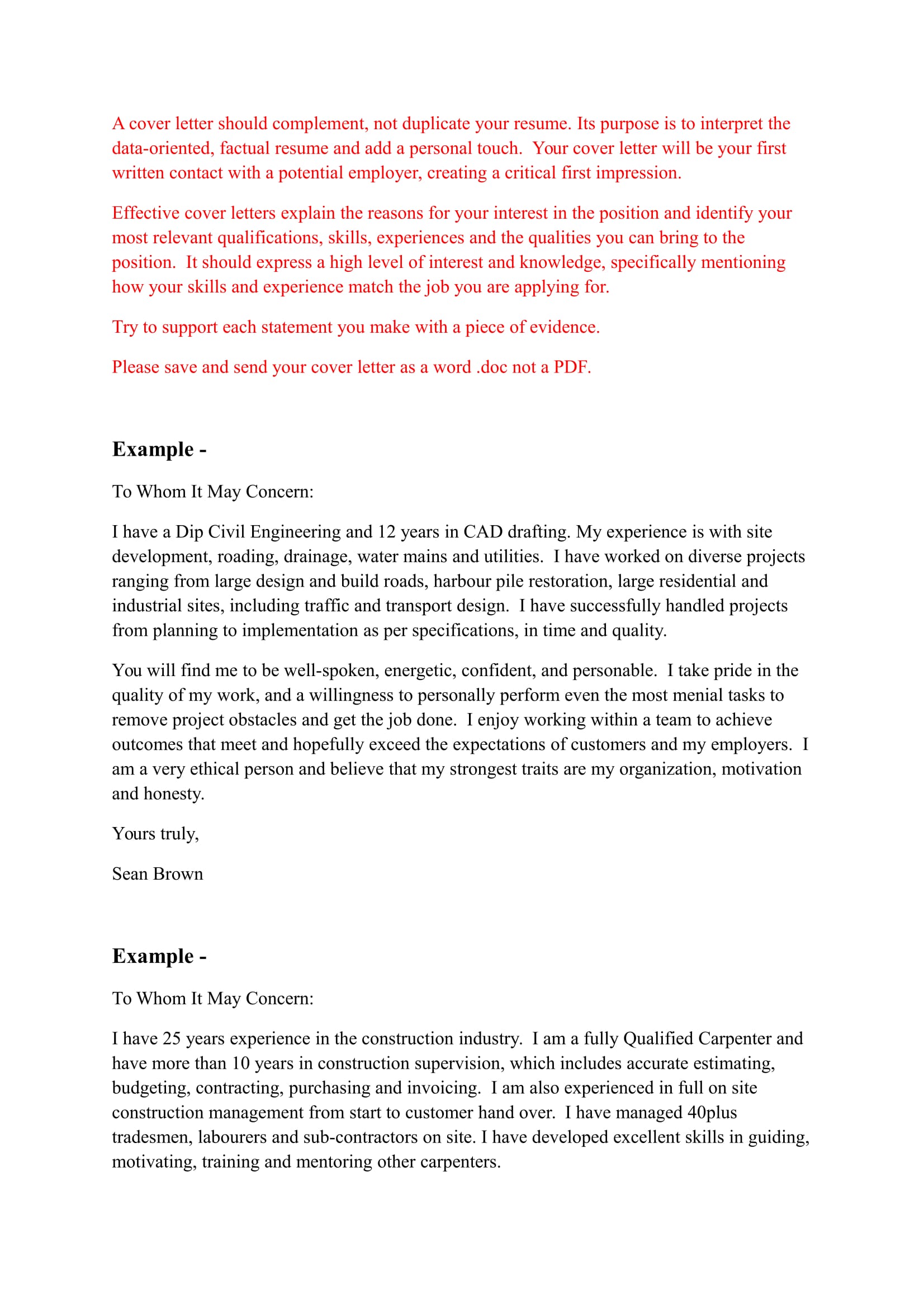
Example of a Cover / Application Letter
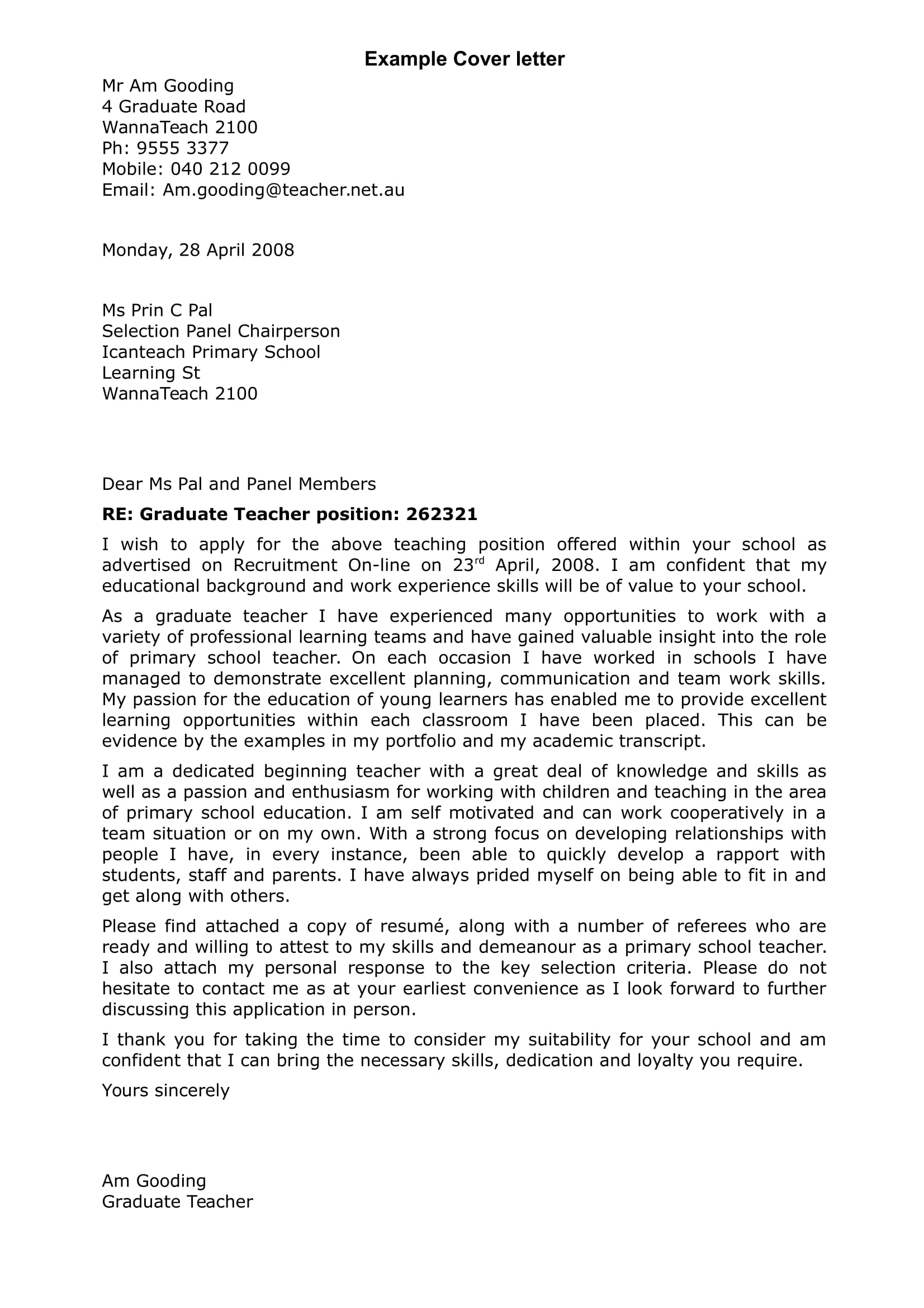
How to Impress Employers Through Your Job Application Letter
Making a job application letter is a task that you need to seriously immerse yourself into. Some people think that a job application letter is not really necessary as a resume can already present the details that the employers would like to know. However, getting higher chances of a callback does not fully rely on providing what employers need to know but also by supplying them with information that can set the standards for the other applicants. This can easily be done through the development of a job application letter that can further elaborate details that a basic resume with a generic format can’t. Listed below are some of the ways on how you can possibly impress employers once they browse through the job application letter that you have submitted. You may also see acknowledgement letter examples & samples.
- Write the letter in an engaging manner. Ensure that the employers will feel your enthusiasm about the job position that you want to have and the possibility of being a part of the company or the business. You can do this by being aware of the tone and language that you will incorporate in the letter development.
- Present yourself as a candidate who is not just equipped with all the qualifications needed by the job position, but someone who is willing to learn and consistently wants to excel and improve in his or her chosen craft. This allows the company to have an idea that you have an idea about the business and you have selected to apply there because you believe that the possible employment can result to all parties mutually benefit from and with one another. You may also like employee reference letter samples .
- Discuss the key requirements of the job position but veer away from presenting those that are already in your resume. There is no need to create a job application letter if you will just repeat what is already in your professional profile. You need to give the employers more insight of who you are and what you can provide the company with if they decide to hire you. You may also check out what is an application letter?
- Ensure that you can showcase your relevance. List a number of reasons why you are the best candidate for the work position. When stating facts about how your qualifications fit the work description, do not be boastful or overly confident. The discussion must be formal and professional so that you can also make your character shine. Employers do not just look on your professional deliverable as work ethics, character, and adaptability are also important factors that businesses look for in their possible new hires. You might be interested in thank-you letter examples.
- Focus on the formal letter format and presentation of the job application letter as much as you give focus on the document’s content. Make sure that you will come up with an organized discussion. More so, ensure that you will print the document in a clean and business-appropriate paper. If the company asks you to send it through email, do not forget to check if the job application letter has been attached in your message accordingly. You also have the option to properly format the letter in the body of the actual email.
Cover Letter Example
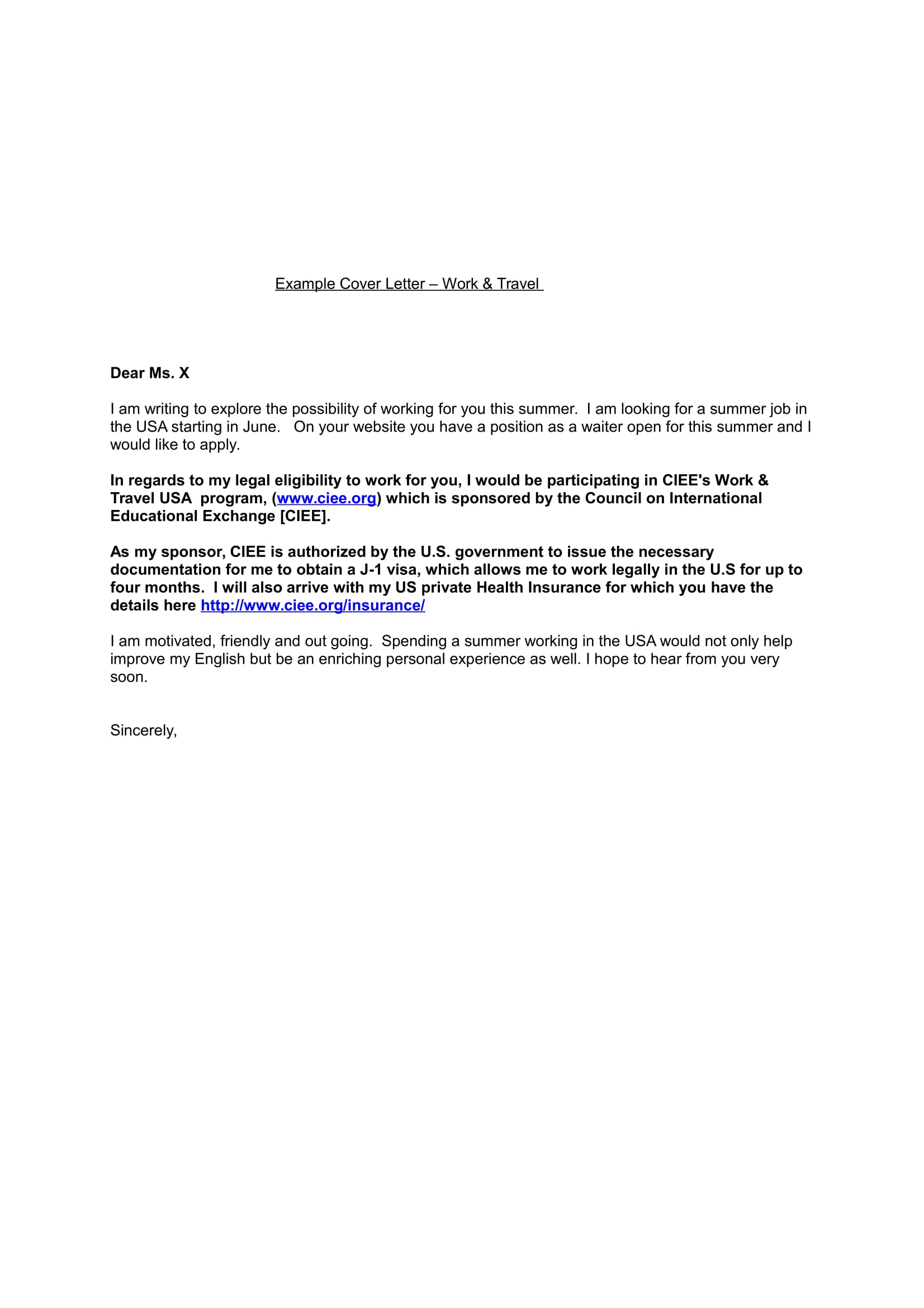
Standard Cover Letter / Application Letter Format Example
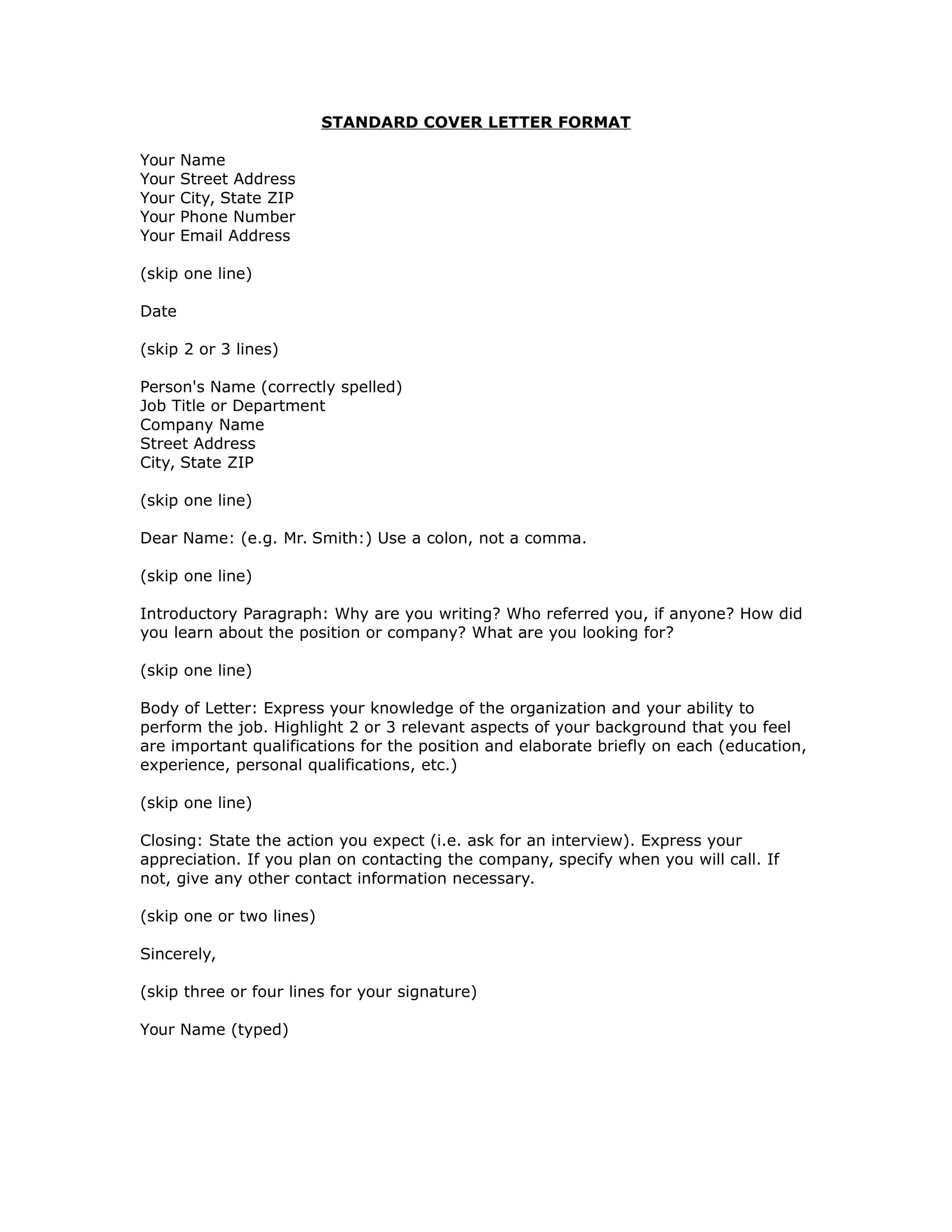
Example of a Cover Letter for Work Application
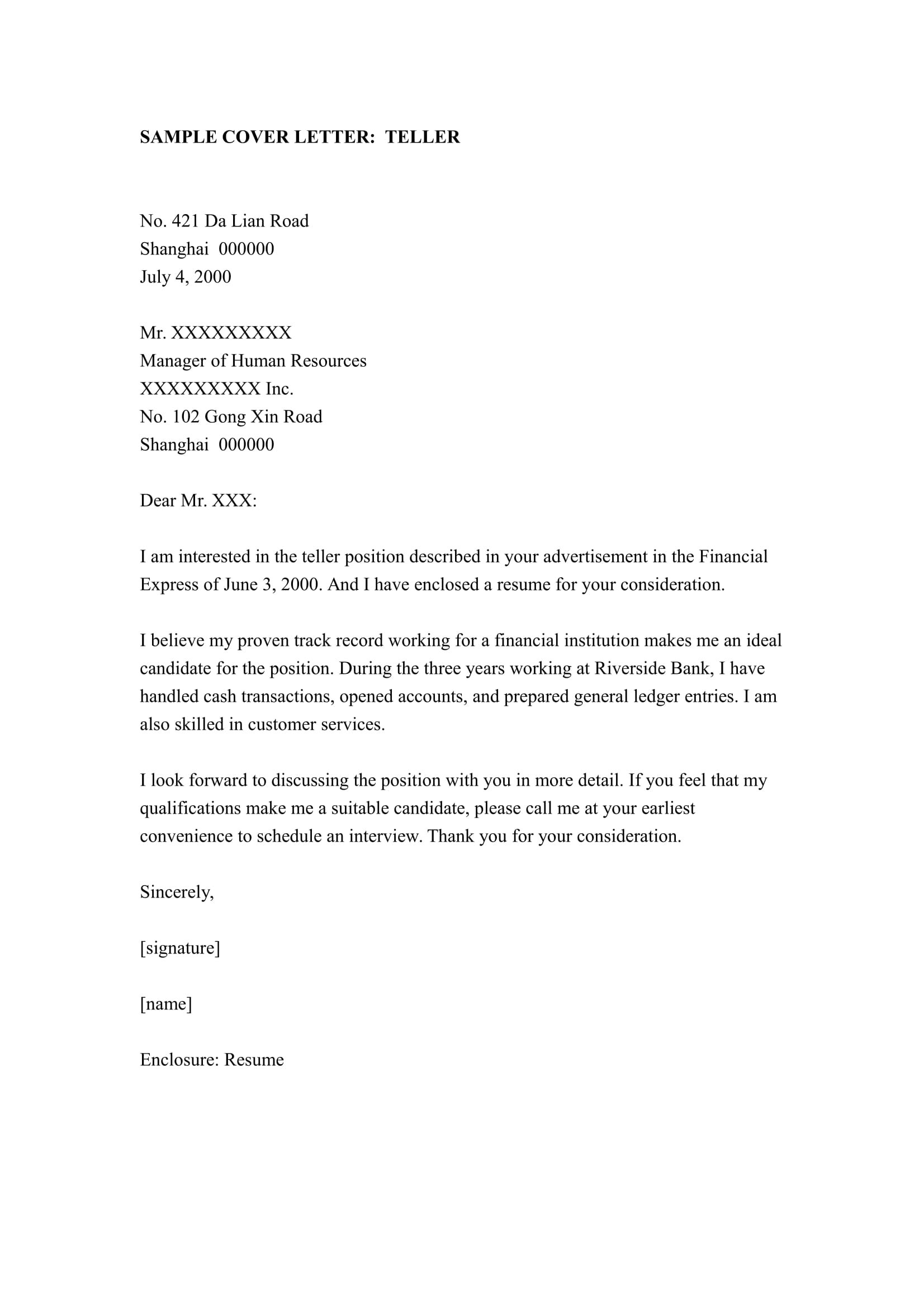
Cover Letter for Work Application Example
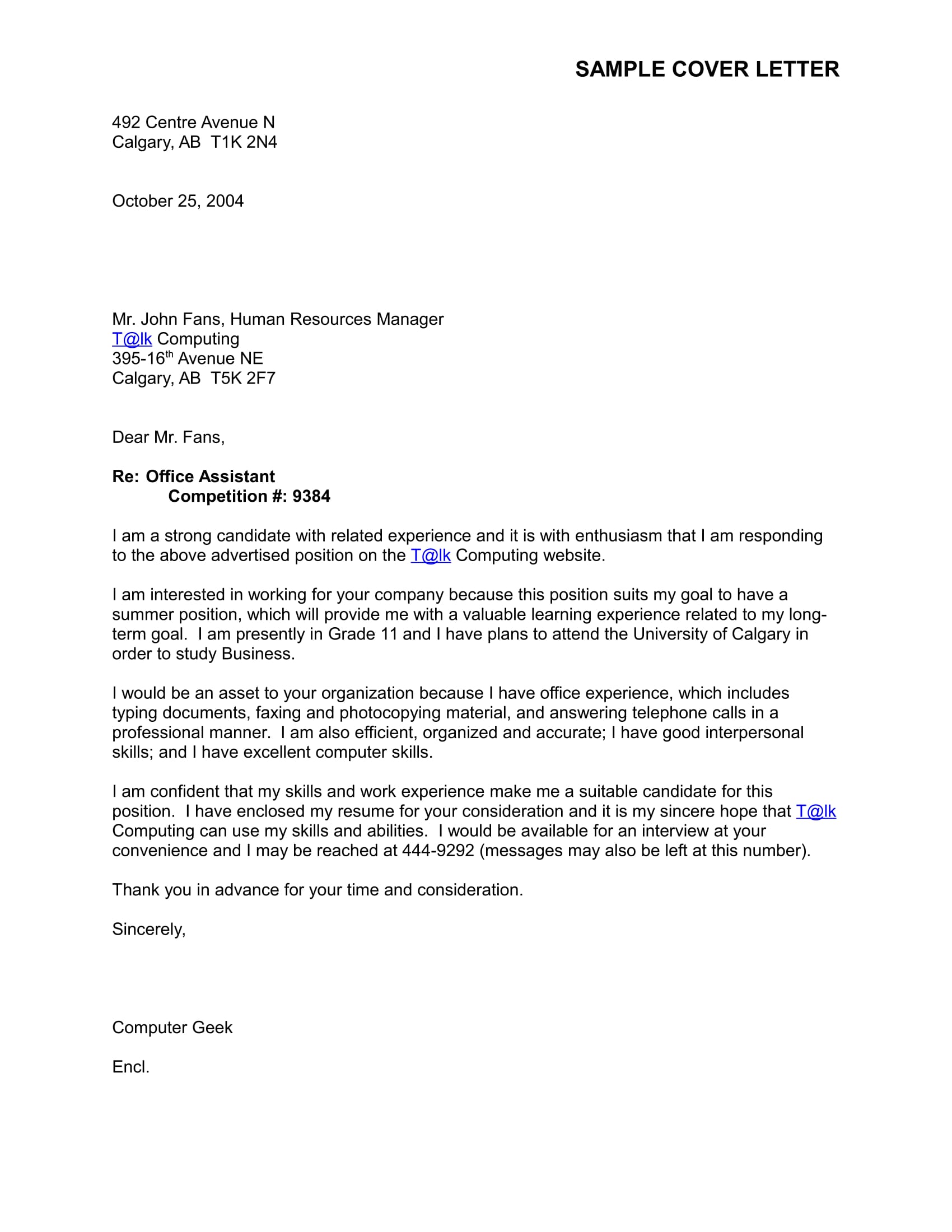
Content of a Job Application Letter
Think of your job application letter as a business proposal cover letter . The latter is used to present a blueprint or a plan that can help business transactions between corporate and/or business entities take place. The same goes with the usage of a job application letter. What do you want to present to employers? How do you want to be perceived? Do you think the content of the letter is appealing and impressive enough for an employment transaction to take place? If you can confidently answer these items, then you are on the right track.
The completion of the content in your job application letter must be highly considered. Making a comprehensive job application letter can effectively provide you with a lead advantage during the recruitment and selection process. Here are the important information that you need to include in your job application letter:
- The date when you have written and submitted the job application letter
- The name of the person to whom the job application letter is for and his or her connection to the company
- The business name and other information of the company where you are applying
- A salutation
- The job position that you are applying for
- The statement that you are a great fit for the work position
- The reason why you would like to be hired for the work post by the employer
- The relation of your professional work experiences and deliverable to your desired work position
- The supporting details that can further strengthen your qualifications
- The relevance of your professional expertise to the goals and objective of the business
- A conclusion that should appeal to the employer
- A simple statement that you will be more than willing to progress to the next phases of the hiring process
- A statement that you will be waiting for the response of the employer regarding the matter
- A message of appreciation for the employer’s effort and time to review your application
- Your contact information where the employer may reach you in the future
- A closing remark and your signature
You may also see two weeks notice letter examples & samples.
Job Application Letter for Applicants With a Gap in Career History Example
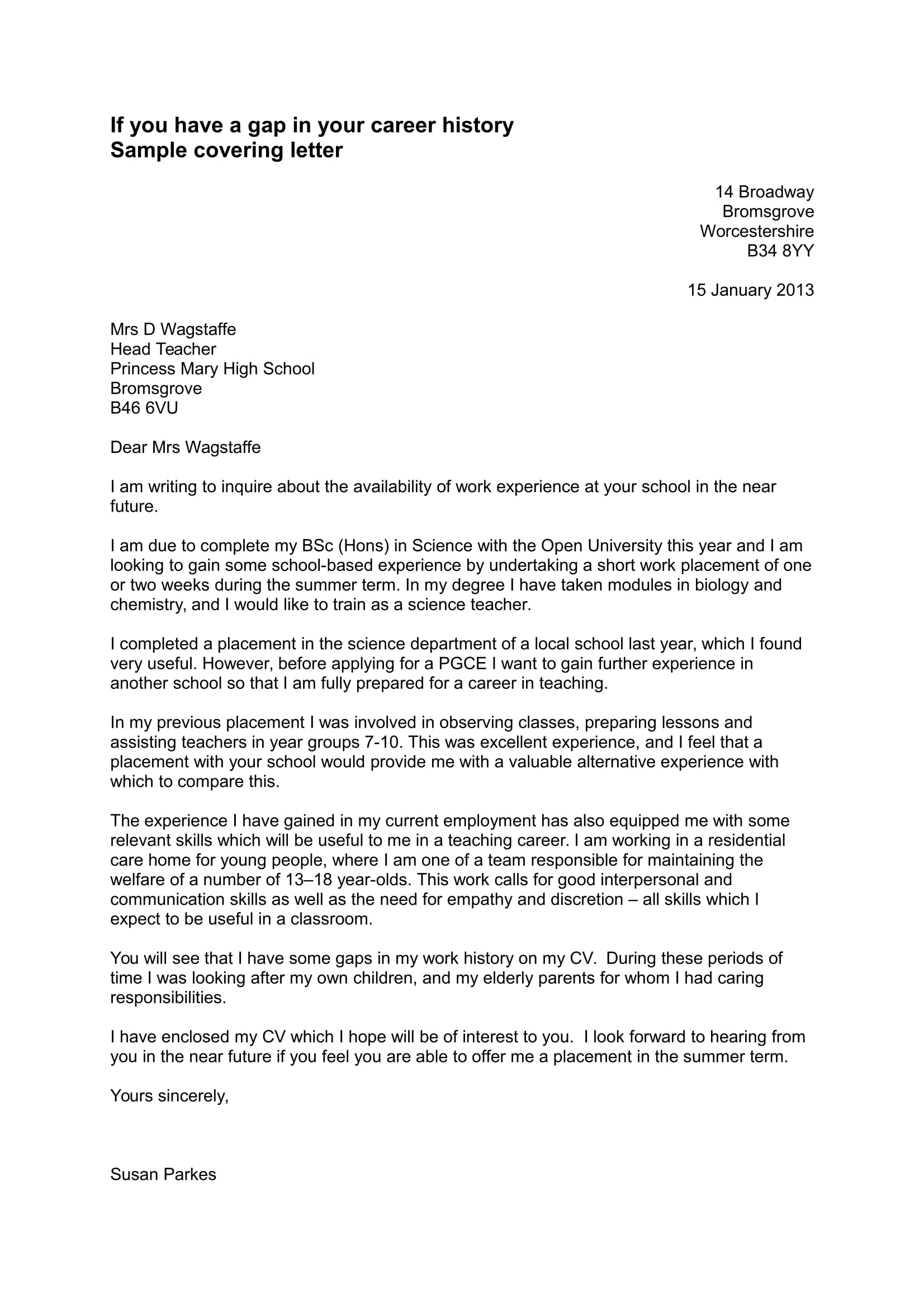
Cover Letter Layout Example
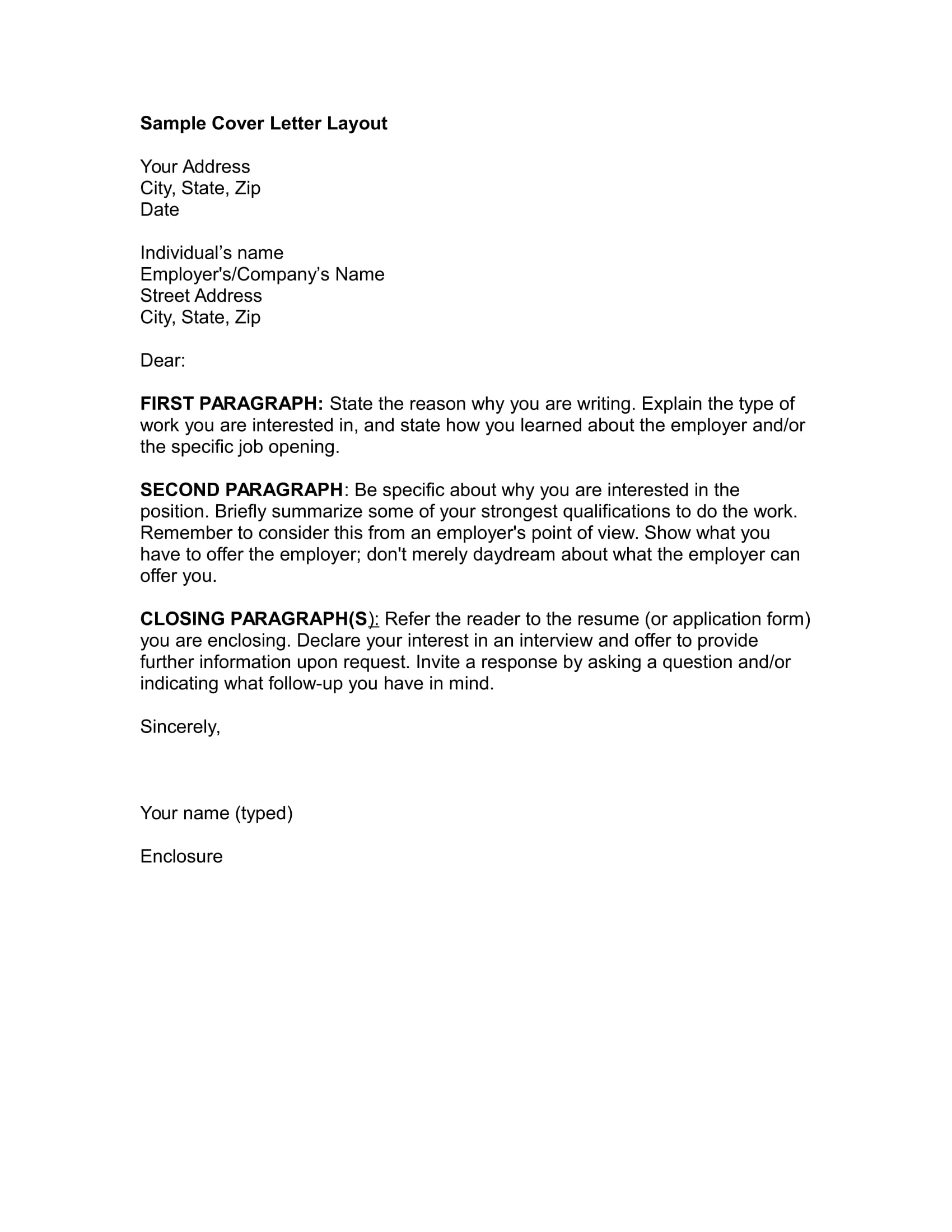
Cover Letter / Application Letter Template Example
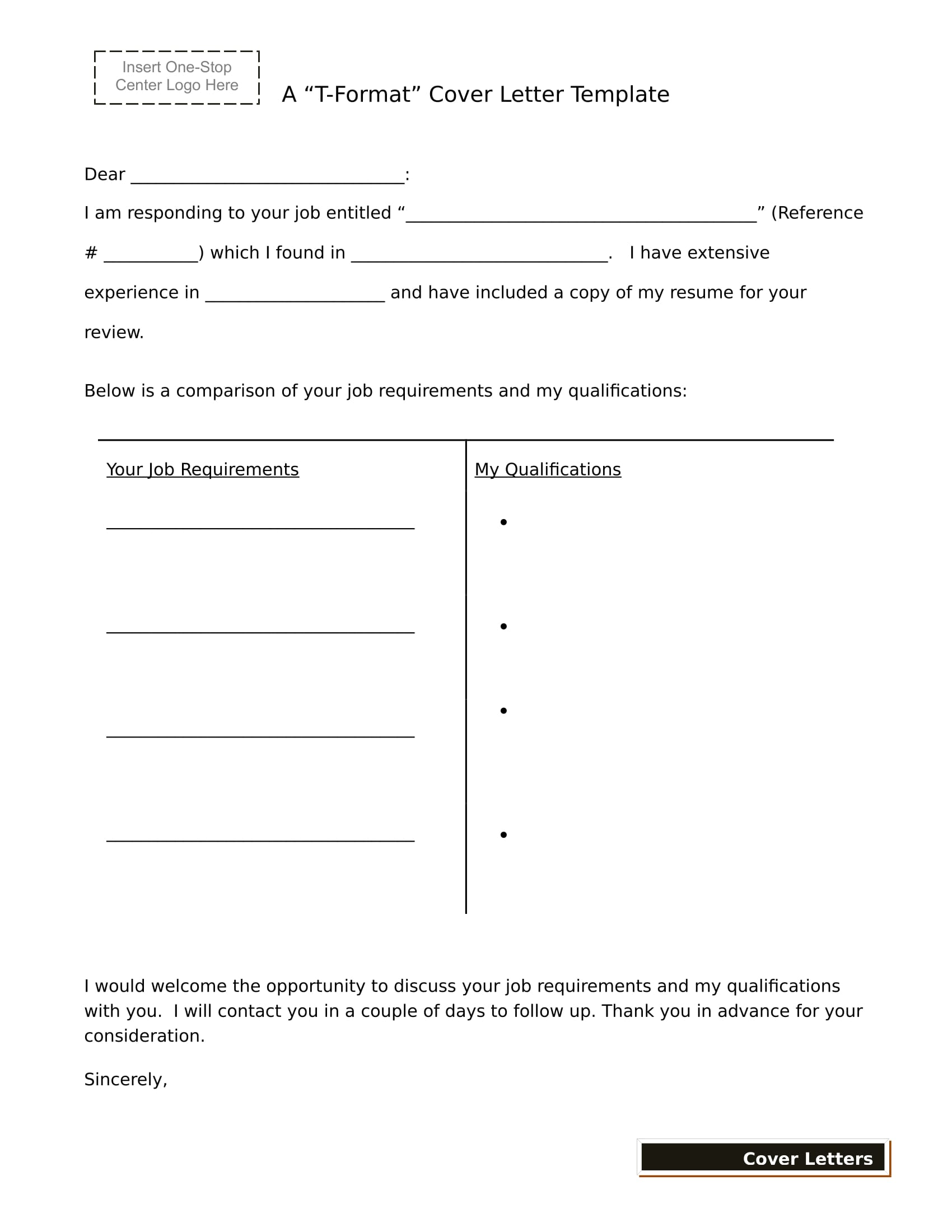
Benefits of Having a Comprehensive and Detailed Job Application Letter
With the stiff competition in different industries, you have to come up with ways and strategies on how you can take a step ahead of other applicants. Always remember that there are limited job opportunities that are targeted by highly-qualified and technically-equipped candidates on a daily basis. Having these in mind can help you prepare better when applying for a job. A job application letter can be one of your strengths during this process. Hence, it is important for you to create this document in the most effective way possible. A few of the benefits that you can have as an applicant if you will create a complete and precise job application letter are as follows:
- Making a job application letter can help you introduce yourself elaborately. You can highlight your key competencies especially those that are not fully-discussed or even placed in your resume summary statement and within the entirety of your professional profile. With this, the employer can give a higher value to your accomplishments and professional experiences. Doing this can also help you showcase instances and real occurrences where your previous employers were able to benefit from your expertise and the execution of your skills in the actual work environment.
- Creating a job application letter can make it possible for you to further express yourself. Why have you chosen the business as your first choice for possible employment? Why do you think you deserve to be hired? What kind of professional work do you want to be involved in? These are only a few of the questions that you can precisely and directly answer in a job application letter. Most resumes are constraining when it comes to the information that you need to include due to the format that you need to follow. This is not the case when making a job application letter as this document contains a conversation-like content in a professional setting. You may also see business letter examples .
- Developing a job application letter can give you the chance to explain the weak areas of your resume. As an example, you can discuss reasons on why you have huge employment gaps or why you decided to resign from one company then to another in a short period of time. However, keep in mind that you should not sound defensive when writing these details as it can also negate the purpose of developing the job application letter which is supposed to impress employers. You may also like reference letter examples.
- Having a job application letter as an essential part of your application strategy can help your qualifications become more tailored with the job position that you are applying for. If you have a job application letter, then you do not need to change a lot of things in your resume as you can already discuss more details in the application letter. Your professional work experiences may not be directly related to the job position that you want. Through the help of a job application letter, you may present the connection of your previous work assignments to the requirements of the new job position that you are applying for. You may also check out appointment letter examples & samples.
Short Job Application Letter Example
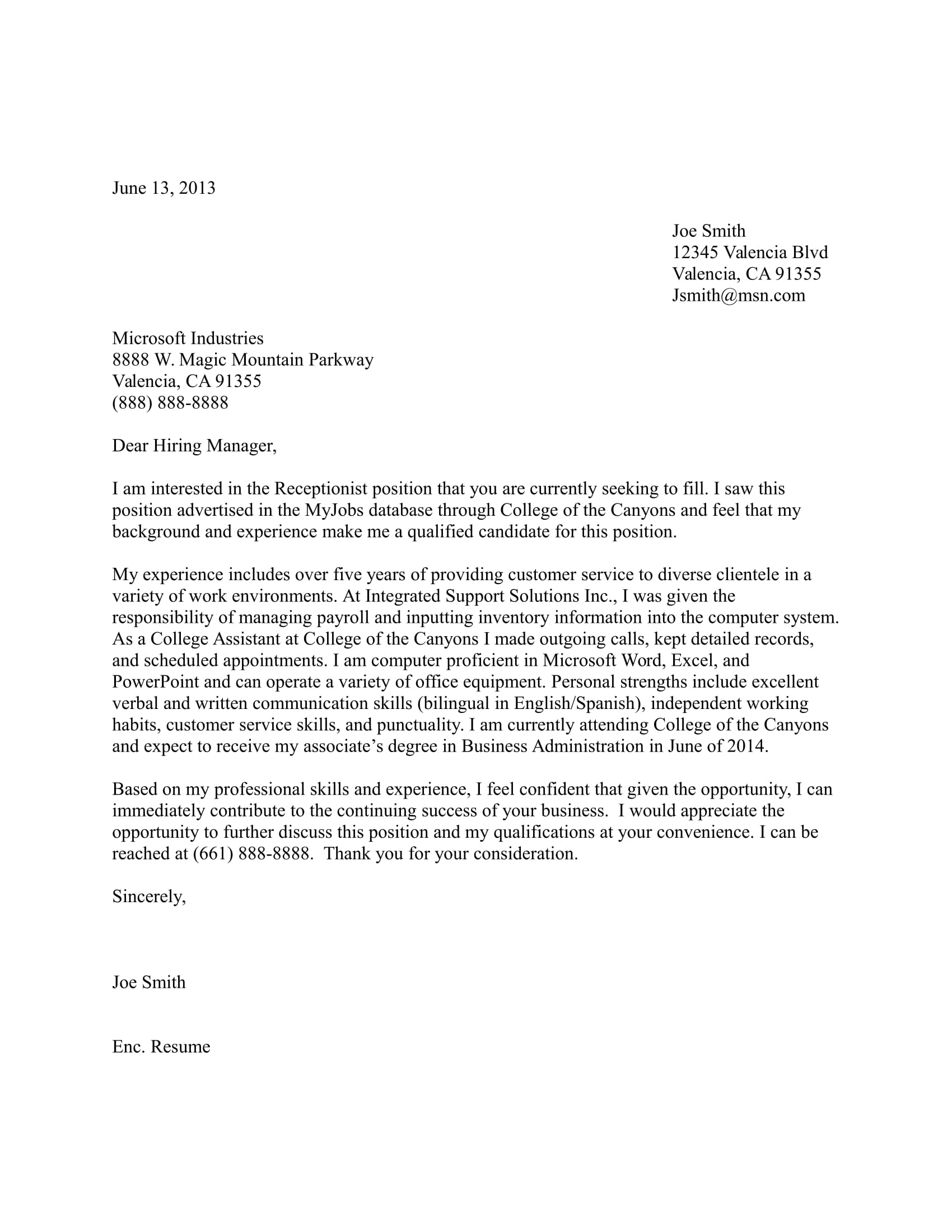
Guide and Example of Job Application Letter / Cover Letter
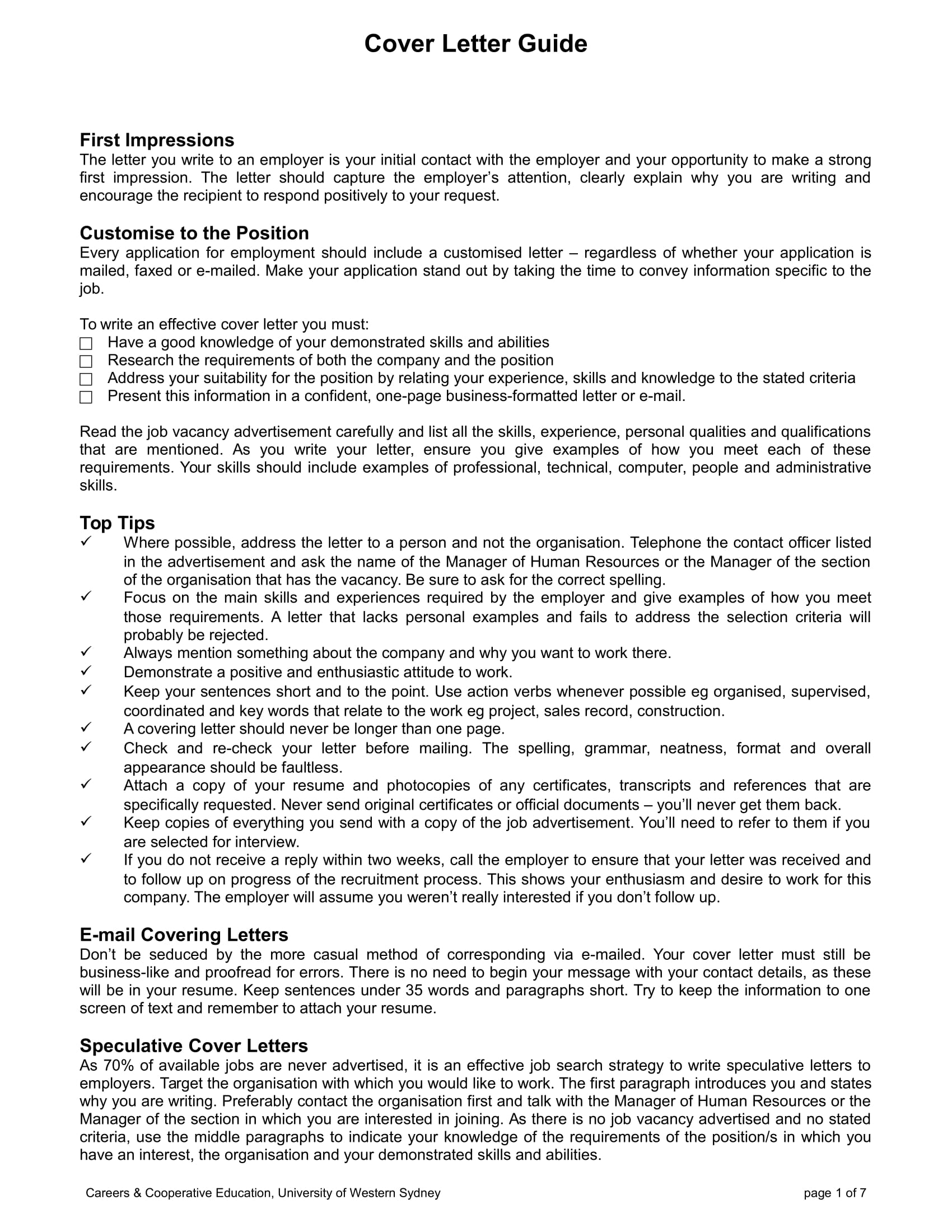
Size: 14 KB
Cover Letter / Application Letter – Warning w/ Example
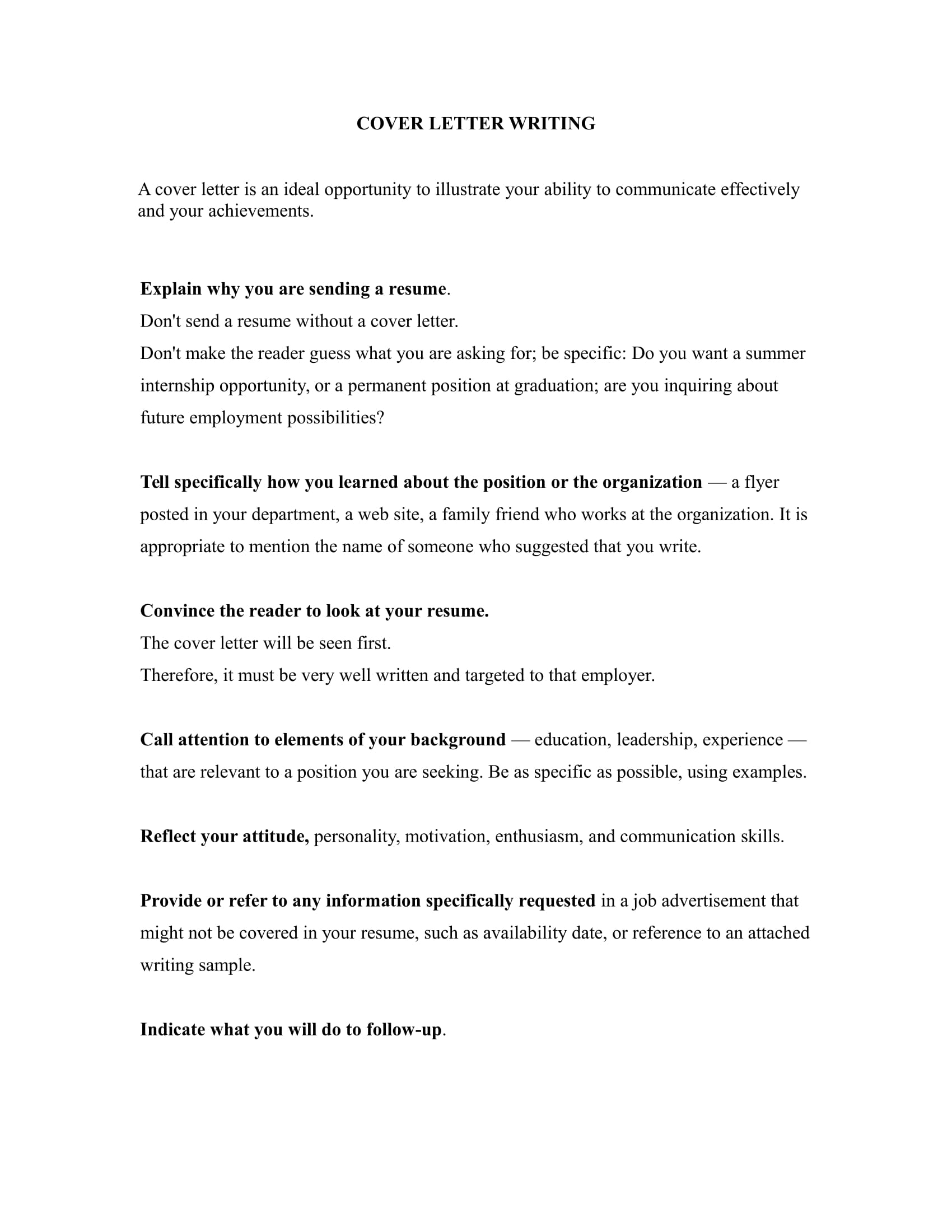
Tips to Follow When Developing a Job Application Letter
Creating an effective Job Application Letter is crucial in the job hunting process. This document, often accompanying your resume, is your opportunity to make a strong first impression. Whether you’re crafting a cover letter or a job application email, there are key elements to include for a professional cover letter. Here’s a guide to help you develop an impactful job application letter:
- Understand the Purpose : Your job application letter is more than just a formality. It’s a personal introduction and a pitch. It should complement your resume by highlighting your relevant skills and experiences, tailored to the job you’re applying for.
- Research the Company : Tailoring your letter to the specific company and position is crucial. Show that you have done your homework by mentioning something about the company’s values, culture, or recent achievements.
- Start Strong : The opening of your professional cover letter sets the tone. Begin with a compelling introduction that grabs the reader’s attention. Mention the position you’re applying for and how you discovered the opening.
- Highlight Relevant Skills and Experiences : Use the body of your letter to emphasize why you’re the right fit. Focus on experiences and skills that directly relate to the job description . Use specific examples and quantify your achievements where possible.
- Make it Personal : Avoid generic phrases. Personalize your job application email or letter by reflecting your enthusiasm for the role and explaining why you’re passionate about working for this specific company.
- Keep it Concise and Clear : Your letter should be easy to read and to the point. Aim for no more than one page. Use short paragraphs and bullet points for easy scanning.
- Professional Tone and Language : While you want to show your personality, maintain a professional tone. Use formal language and avoid slang or overly casual phrases.
- Proofread and Edit : Typos and grammatical errors can make a bad impression. Proofread your letter multiple times and consider having someone else review it as well.
- Closing with a Call to Action : End your letter by thanking the employer for considering your application and express your interest in discussing your candidacy further in an interview.
A well-crafted Job Application Letter is your gateway to capturing the attention of potential employers. By following the outlined tips and emphasizing your unique skills and experiences, you can create a compelling and professional cover letter. Remember, this letter is your chance to make a memorable first impression, paving the way for a successful job application process.
Text prompt
- Instructive
- Professional
Generate a job application letter for a college student applying for a tutor position
Write a job application letter for a recent graduate seeking a teaching assistant role in a middle school.

- Mar 26, 2024
- 11 min read
How to Write a Job Application Letter (Tips and Examples)
Your guide to getting your foot in the door.
Joanna Zambas
Content Manager and Career Expert
Reviewed by Chris Leitch

Do you have your heart set on a specific company but have never seen them post a single vacancy? And are you on the verge of giving up completely, and convinced you’re going to be jobless and broke for the rest of your life?
Well, don’t crumple your perfectly written résumé in a ball of paper just yet — there’s still hope for you!
All you need to do is write an awesome job application letter.
Application letters are a great way to get your foot in the door of a company that hasn’t advertised a position or when you’re applying for an academic program or an internship .
So, what are you waiting for?
Read on to find out how to write a great job application letter (and land that dream job of yours in the process)!
What is a job application letter/email?
Whereas cover letters are used when applying for a specific vacancy, and include details which are complementary to what’s on the applicant’s résumé, application letters are submitted when there is no job opening, and they tend to be more detailed.
Unlike cover letters, which usually span about one page, application letters can be twice as long.
How should you structure your letter?
The structure and formatting of your application letter is just as important as the words you use to sell your skills and enthusiasm for the job. The pointers below will help you deliver your message in a professional and effective way.
Sender’s address
Begin your letter with your address listed in the left-hand corner of the page. In the US, it’s acceptable to list your address in the right-hand corner. (Skip this step if you’re going to send your application via email.)
If you’re applying via email, create an email address for professional use if you haven’t already. This should include your first and last names or initials — no nicknames or years of birth! Two appropriate examples are [email protected] and [email protected] .
As with any official letter, include the date of your letter below your address.
Subject line
The subject of your email should make the manager want to read more and not automatically press the “Delete” button. It could be something like: “Social Media Expert with over 5 Years of Experience”.
Inside address
The company’s address should appear a few lines below your address and the date. Skip this if you’re sending an email.
As with any formal letter, you need to open with the correct formal salutation (such as “Dear Mr [surname]” or “Dear Ms [surname]”).
It’s also best to find out who the head of the department is, and address your letter directly to them to show that you’ve taken the time to really do your research. If you begin with “Dear Hiring Manager”, for example, you’re potentially destroying your chances of getting the job you’re applying for.
Opening paragraph
The opening paragraph should provide details on why you’re getting in touch.
Think about what you want to achieve with this letter before forming your answer. For example, you could say that it’s been a dream of yours to work for the company and that you feel that, given the chance, you’d love to bring new skills and ideas to the table. You can also highlight any qualifications you have here.
Middle paragraph(s)
This is where you will explain why you’re suitable for the position by listing skills you’ve developed through previous work experience . Remember that this shouldn’t be a word-for-word copy of your résumé; rather, you should use this as an opportunity to expand on notable achievements.
And make sure you tailor the content of your letter to the particular job title and company you’re applying to — you don’t want to ramble on about irrelevant details.
Final paragraph
Finally, focus on what you bring to the table and how the company can benefit from your skills and experience. If you have statistics and figures to back up your claims, even better!
For example, if you’re an experienced project manager, you could say how you want to showcase your leadership skills and help the company reach its desired turnover, and then back this up with statistics on how you did just that in previous positions.
You should close your letter with a call-to-action. For example, you could say something like: “I look forward to hearing back from you to discuss any possibilities”. And don’t forget to thank the reader for their time!
Your name and signature
If you’re sending this by snail mail, opt for a handwritten signature. If, on the other hand, you’re sending an email, simply write your name, followed by your contact information.
Most application letter templates (and formal letter templates in general) use the Times New Roman typeface at 12 points. Other recommended fonts include Arial, Georgia and Calibri.
Tips for writing your letter
When it’s time to write an application letter, bear the following points in mind to ensure that your document captures the hiring manager’s attention and successfully creates the impression that you’d make a good fit for their company.
1. Include bullet points
Bullet points can be used as an effective formatting tool when writing your application letter. They can demonstrate points clearly and concisely, as well as help with the overall layout, allowing for bite-sized, readable chunks of information.
2. Make sure the language you use is easy to read
You might be a literary wizard , but those long words won’t impress the hiring manager if they make your letter difficult to read.
3. Use positive language
Positivity is the way forward when it comes to selling your skills to a potential employer. Therefore, you should use positive words when explaining your previous work experience.
These words include “assisted”, “conducted”, “executed”, “proposed” and “recommended”, which (when used right) can demonstrate your contribution and dedication to your role and organization.
4. Be creative
Depending on the industry that you’re interested in, you can be a bit creative with your approach . This means that you don’t have to follow the conventional structure of a cover letter, and can instead adopt a more story-like approach.
Should you add any attachments?
Since application letters are not submitted in response to particular job ads, but rather serve as an inquiry into any unadvertised openings which may be available, they tend to be standalone documents. That is to say they are not typically accompanied by other files.
Whereas cover letters are concise, tailored to the job posting and accompanied by résumés, your letter of application will be a more extensive account of your skills and experiences.
That being said, if you’re applying for a creative position such as that of a video editor or blog writer, it makes sense to include a few samples of your work that best represent your talent and ability.
Job application letter samples
The following application letter samples can give you an idea as to what to include in your letter, as well as how to structure it effectively.
1. Job application email sample
Dear Mr Cannon,
I have long been following your company’s growth and progress, being extremely passionate about clean, renewable energy. I remember coming across XYZ Renewables back in the early 2000s, when it was still in its early startup stages, and I admire how your leadership has grown the company since.
Having gained extensive experience as a solar consultant over the last decade, I have kept an eye out for any job opportunities with XYZ Renewables. This is why I am writing to you today: to express a keen interest in working with you in the future, should any solar consultation vacancies become available at your company.
In my current role at ABC Energies, I train new hires in advising and liaising with clients, as well as in designing and installing solar systems that cater to the needs and budget of our clients. I carry out the same duties myself, and have been commended for my customer service skills and technical know-how in solar systems installations. Over the last year, I have overseen and facilitated transactions totaling upwards of $1 million.
I appreciate you taking the time to read through my application. I hope that my skills and work experience can contribute to a fruitful collaboration down the line.
Yours sincerely,
Mark Rowling
2. Internship application email sample
Dear Ms Kipling,
Ever since I was a sophomore in high school, I’ve dreamed about pursuing an undergraduate degree in interior design and going on to work for an award-winning architectural firm. During my studies at AB College, where I graduated from just over a month ago, I became exposed to the works of various such firms, including your own.
XY Designs stood out to me for the simplicity of its designs (I am also a fan of Scandinavian interiors!) as well as its clever use of natural lighting and earthy colors and textures. In particular, I was impressed with the renovation of the Workwell coworking space you undertook and completed in 2022.
I believe that working alongside the designers on your team and under your mentorship would be an invaluable experience, which is why I am reaching out to enquire about any potential internship opportunities you may have this coming summer. During my studies, I have become proficient in using SketchUp and 3Ds Max, and completed my final project on Scandinavian interiors and architecture specifically. I am attaching a link to my final project portfolio below.
Thank you for your time, and I hope to hear back from you soon.
Respectfully,
3. Academic application letter sample
Gregory Allen Department of English AB University Syracuse, NY
Tuesday, March 26, 2024
Dear Mr Allen,
During my undergraduate studies in animation, I discovered — quite unexpectedly — a passion for writing, and specifically writing for film and television. Although up until that point I had believed myself to be a VFX artist in the making, the discovery caused me to reconsider. Today, I am writing to express my interest in the Creative Writing MA program at AB University.
During my final year at Arts College, I produced a screenplay for a short film, and found that setting up the scene and creating a whole new world in words was far more fascinating to me than trying to recreate it by moving around and rendering pixels on a screen. I received the highest mark out of everyone on my course for that piece of writing; and that was followed by my screenwriting professor’s recommendation: the way he spoke about AB University’s history and faculty removed any sort of doubt from my mind. It all became clear: this was to be my new path.
I have attached some writing samples, as per the application guidelines: my final-year screenplay as well as two pieces of prose I wrote in my free time. I hope that you may consider my application for a spot on the Creative Writing course.
I look forward to hearing back from you. Thank you for your time!
Best wishes,
Things to remember
From writing the first draft of your application letter to editing it and adding the final touches, remember to do the following:
1. Do your research
Research is one of the most important steps when it comes to job searching ; you need to make sure that you know all there is about the organization you’re targeting and you should have a clear understanding of what their company culture is like.
2. Don’t forget to proofread
This goes without saying, but never send your application letter off without proofreading it. With so many readily available editing tools online, there’s no excuse for a careless typo or wordy sentences. Grammarly and Hemmingway are two of the most popular programs to help you perfect your writing.
3. Use their style of writing
You can usually guess a company’s style of writing from their website and publications. So, it’s important to try and keep your letter in line with this so they can see that you’re a real match for the position and that they’d be silly to not invite you for an interview.
Final thoughts
Whether you go to write a cover letter or an application letter, or even to put together a portfolio for a prospective employer to see, the same thing applies: everything you include must be related to the position you’re hoping to land.
So, before you’ve started writing, take time to consider which of your skills, qualities and achievements best portray you as a strong candidate , and how you can best convey your interest in (and suitability for) the company as a whole.
Have you ever written an application letter before? Do you have any other tips to share with fellow jobseekers? Leave us a comment in the comments section below!
Originally published on August 21, 2018. Updated by Electra Michaelidou.
Finding a Job
Job Applications
- Search Search Please fill out this field.
- Career Planning
- Finding a Job
- Cover Letters
Sample Cover Letter for a Job Application
:max_bytes(150000):strip_icc():format(webp)/ADHeadshot-Cropped-b80e40469d5b4852a68f94ad69d6e8bd.jpg)
What Is an Application Letter?
What to include in your application letter, tips for writing a cover letter, cover letter sample and template, email cover letter sample.
- How to Send an Email Application
Frequently Asked Questions (FAQs)
Alex Dos Diaz / The Balance
What's the best way to write a letter to apply for a job? Your letter should detail your specific qualifications for the position and the skills you would bring to the employer. What’s most important is to show the employer that you’re a perfect match for the job.
Your job application letter is an opportunity to highlight your most relevant qualifications and experience. An effective cover letter will enhance your application, showcase your achievements, and increase your chances of landing an interview.
Review what to include in a job application letter, tips for writing that will get your application noticed, and examples of cover letters and email messages to send when applying for a job.
Key Takeaways
- An application letter accompanies a resume and may be uploaded to a job portal, sent via email, or even sent by postal mail, depending on the employer’s requirements.
- Application letters are an ideal way to show your interest in a job and highlight your most relevant skills.
- It’s important to match your letter to the job description and show the employer you have the qualifications they are seeking.
A letter of application, also known as a cover letter , is a document sent with your resume to provide additional information about your skills and experience to an employer. Your letter of application is intended to provide detailed information on why you are an ideal candidate for the job.
Your application letter should let the employer know what position you are applying for, what makes you a strong candidate, why they should select you for an interview, and how you will follow up.
Effective application letters explain the reasons for your interest in the specific organization and identify the most relevant skills that qualify you for the job.
Unless an employer specifically requests a job application letter sent by postal mail, most cover letters today are sent by email or attached as a file in an online application tracking system.
As with all cover letters, a job application letter is divided into sections:
- The heading includes your name and contact information.
- A greeting addressed to a specific person, if possible.
- The introduction includes why the applicant is writing.
- The body discusses your relevant qualifications and what you have to offer the employer.
- The close thanks the reader and provides contact information and follow-up details.
- Your signature to end the letter .
Here’s how to ensure your application supports your resume, highlights your most relevant qualifications, and impresses the hiring manager.
Get off to a direct start. In your first paragraph, explain why you are writing. Mention the job title, company name, and where you found the job listing. While you can also briefly mention why you are a strong candidate, this section should be short and to the point.
Offer something different than what's in your resume. You can make your language a bit more personal than in your resume bullet points, and you can tell a narrative about your work experience and career.
Application letters typically accompany resumes, so your letter should showcase information that your resume doesn't.
Make a good case. Your first goal with this letter is to progress to the next step: an interview. Your overarching goal, of course, is to get a job offer. Use your application letter to further both causes. Offer details about your experience and background that show why you are a good candidate. How have other jobs prepared you for the position? What would you bring to the role and the company? Use this space to emphasize your strengths .
Close with all the important details. Include a thank you at the end of your letter. You can also share your contact information and mention how you will follow up.
This is a sample cover letter. Download the cover letter template (compatible with Google Docs and Word Online) or see below for an email sample.
The Balance
John Donaldson 8 Sue Circle Smithtown, CA 08067 909-555-5555 john.donaldson@email.com
September 6, 2023
George Gilhooley LTC Company 87 Delaware Road Hatfield, CA 08065
Dear Mr. Gilhooley,
I am writing to apply for the programmer position advertised in the Times Union. As requested, I enclose my certification, resume, and references.
The role is very appealing to me, and I believe that my strong technical experience and education make me a highly competitive candidate for this position. My key strengths that would support my success in this position include:
- I have successfully designed, developed, and supported live-use applications.
- I strive continually for excellence.
- I provide exceptional contributions to customer service for all customers.
With a BS degree in computer programming, I have a comprehensive understanding of the full lifecycle of software development projects. I also have experience in learning and applying new technologies as appropriate. Please see my resume for additional information on my experience.
I can be reached anytime via email at john.donaldson@email.com or by phone at 909-555-5555.
Thank you for your time and consideration. I look forward to speaking with you about this employment opportunity.
Signature (only if a hard copy letter)
John Donaldson
The following is a sample email cover letter to send as part of a job application.
Email Application Letter Example
Subject: Colleen Warren - Web Content Manager Position
Dear Hiring Manager,
I'm writing to express my interest in the Web Content Manager position listed on Monster.com. I have experience building large, consumer-focused, health-based content sites. While much of my experience has been in the business world, I understand the social value of this sector, and I am confident that my business experience will be an asset to your organization.
My responsibilities have included the development and management of website editorial voice and style, editorial calendars, and the daily content programming and production for various websites.
I have worked closely with health care professionals and medical editors to provide the best possible information to a consumer audience of patients. I have also helped physicians use their medical content to write user-friendly and easily comprehensible text.
Experience has taught me how to build strong relationships with all departments in an organization. I have the ability to work within a team, as well as cross-team. I can work with web engineers to resolve technical issues and implement technical enhancements.
I am confident working with development departments to implement design and functional enhancements, monitor site statistics, and conduct search engine optimization.
Thank you for your consideration.
Colleen Warren colleen.warren@email.com 555-123-1234 www.linked.com/colleenwarren
How to Send an Email Application Letter
If sending your cover letter via email, list your name and the job title you are applying for in the subject line of the email:
Colleen Warren - Web Content Manager Position
Include your contact information in your email signature but don't list the employer's contact information.
Do you have to write a cover letter when you apply for a job?
Some employers require cover letters. If they do, it will be mentioned in the job posting. Otherwise, it’s optional but it can help your chances of securing an interview. A cover letter gives you a chance to sell yourself to the employer, showcase your qualifications, and explain why you are a perfect candidate for the job.
How can you use a cover letter to show you’re a qualified candidate?
One of the easiest ways to show an employer how you’re qualified for a job is to make a list of the requirements listed in the job posting and match them to your resume . Mention your most relevant qualifications in your cover letter, so the hiring manager can see, at a glance, that you have the credentials they are looking for.
CareerOneStop. " How Do I Write a Cover Letter? "
- Career Blog
Writing a Winning Job Application Letter: Tips and Examples

A job application letter, also known as a cover letter, is a formal letter that accompanies your resume and introduces you to a potential employer. The purpose of a job application letter is to highlight your qualifications, experience, and skills that make you the perfect candidate for the job. It also helps employers understand your personality, work ethic, and how you plan to contribute to their organization.
Importance of Customization
One of the key factors that can make or break your job application letter is how well you customize it to the specific job you are applying for. Employers want to see that you have taken the time to research their company and understand what they are looking for in a candidate. Customizing your letter also shows that you are genuinely interested in the job and that you are willing to put in the extra effort to stand out from other applicants.
Brief Overview of Key Sections
While job application letters can vary slightly depending on the job and industry, they typically contain four key sections:
Introduction: This section should include a brief introduction, the job you are applying for, and how you found out about it.
Qualifications: In this section, you should discuss your qualifications and experience that make you a good fit for the job. Be sure to tailor this section to the specific job requirements to show that you have the skills they are looking for.
Skills: Here, you should highlight your relevant skills and how they apply to the job. Use examples from your past experiences to demonstrate your proficiency in each skill.

Closing: The closing paragraph should thank the employer for considering your application and provide contact information for them to reach you.
In this article, we will dive into each of these sections in more detail and provide tips and examples to help you write a winning job application letter.
Understand the Job Requirements
To write a winning job application letter, it is important to thoroughly understand the job requirements. This involves analyzing the job description and understanding the needs of the employer, as well as tailoring your letter to attract the specific employer.
A. Analyzing the Job Description
The job description provides you with valuable information about the position you are applying for. It outlines the required skills, qualifications, and responsibilities of the job. By analyzing the job description, you can determine if the role is a good fit for your experience and qualifications.
When analyzing the job description, it is important to pay attention to key phrases and requirements mentioned. These can give you insight into the priorities of the employer and allow you to tailor your application to meet those priorities.
B. Understanding the Needs of the Employer
To write a winning job application letter, it is also essential to understand the needs of the employer. This means researching the company and the industry to get a better understanding of the company culture, mission, and values. It also means understanding the desired outcome of the position and how you can address the employer’s needs.
One way to convey your understanding of the employer’s needs is to highlight relevant accomplishments in your application letter. By showing how you have successfully addressed similar challenges in the past, you can demonstrate your potential value to the employer.
C. Tailoring the Letter to Attract Specific Employer
Finally, to write a winning job application letter, it is important to tailor your letter to attract the specific employer. This means using language and examples that relate to the specific company and its values. It also means customizing your application letter to the specific job and its requirements.
To tailor your letter, take the time to research the company and its values. This can involve reviewing their website, social media, and other online resources. By addressing the specific needs and values of the employer, you can show that you are invested in the position and the company.
To write a winning job application letter, it is important to understand the job requirements, analyze the job description, understand the needs of the employer, and tailor the letter to attract the specific employer. By doing so, you can craft an application that stands out from the competition and showcases your value as a candidate.
Research the Company and Industry
Before writing your job application letter, it’s important to research the company and industry thoroughly to increase your chances of writing a winning letter. Here are three key areas to focus on:
A. Understanding the Mission, Vision, and Values of the Company
Make sure you take the time to research the company’s mission, vision, and values. This will help you understand the company’s goals and the qualities they look for in employees. You can find this information on the company’s website, social media pages or company annual report.

Incorporate the values and mission statement of the company into your job application letter. This highlights your alignment with the company culture, and how your beliefs and goals match that of the organization’s.
B. Identifying the Company’s Competition
Once you have an understanding of the company, you need to identify the company’s competition. Knowing who the competitors are can help you understand the industry as well as the company’s market share position.
List the company’s competitors in your job application letter and briefly explain how you see the company’s strengths overcoming the competitors’ weaknesses.
C. Industry Trends and How to Address Them
The final area to focus on when researching the company and industry is identifying current industry trends and how these trends may impact the company’s future. Use reputable sources to gather trends and predictions about the industry. This will also show the recruiter that you are not only familiar with their industry, but are engaging in informed discussion and contributing to innovative solutions.
Incorporate industry trends into your job application letter and showcase the ideas and innovations you bring, how leveraging them can enhance the company’s position and how you can contribute to any current and future challenges, for which the potential employer has yet to find a solution.
By researching and incorporating the above areas into your job application letter, you demonstrate a genuine interest in the organization and showcase clear understanding, innovative thought and how your expertise can improve the company’s performance.
Know Your Strengths and Skills
When writing a job application letter, it’s crucial to understand your unique selling proposition, relevant experience, and transferrable skills. This information will help you stand out from the other applicants and potentially land the job of your dreams.
A. Identifying Your Unique Selling Proposition
Your unique selling proposition (USP) is what sets you apart from the other candidates. It could be a specific skill, experience or personality trait that aligns with the company’s values and job requirements. Start by analyzing the job description and researching the company culture to identify what makes you an ideal candidate for the role.
Once you have identified your USP, use it as the main selling point in your job application letter. Highlight your strengths and skills and explain how they align with the job requirements and the company’s values. This will show the hiring manager that you are not just another candidate, but someone who has something valuable to offer.
B. Highlighting Your Relevant Experience and Accomplishments
Your work experience and achievements are essential in demonstrating your abilities and suitability for the job. When crafting your job application letter, focus on highlighting your relevant experience and accomplishments. Use specific examples to demonstrate how you have contributed in previous roles and how those skills could be applied to the new role you are applying for.
Be sure to use metrics whenever possible as numbers are a great way to showcase your achievements. For example, if you were able to increase sales revenue by 20% in your previous role, mention it in your letter. This will give the hiring manager a clear understanding of your capabilities and how they align with the job requirements.
C. Understanding How to Leverage Transferrable Skills
Transferrable skills are those abilities that you have gained from your previous experiences that are not necessarily related to the job you are applying for. They can be valuable in demonstrating your adaptability and ability to learn quickly.
When discussing your transferrable skills in your job application letter, highlight how they could be applied to the new role you are applying for. For example, if you have strong communication skills, explain how you could use that to effectively collaborate with team members and clients.
By understanding and leveraging your unique selling proposition, relevant experience and accomplishments, and transferrable skills, you can write a job application letter that stands out from the crowd. Remember to tailor your letter to the job requirements and company culture to increase your chances of success.
Address Gaps in Your Resume or Experience
When applying for a job, it’s important to consider any gaps in your resume or experience that might be a red flag for hiring managers. Addressing these gaps upfront can demonstrate your accountability and willingness to take ownership of your shortcomings.
A. Taking ownership of failings
If you have gaps in your work history or experience, don’t try to hide or make excuses for them. Instead, take ownership of any failings and show that you’re actively working to improve yourself. This could involve taking courses, pursuing certifications, or volunteering in relevant areas to gain hands-on experience.
B. Finding a workaround for unfilled requirements
Sometimes a job posting requires specific qualifications or experience that you don’t have. In these cases, it’s important to find a workaround that demonstrates your ability to still meet the employer’s needs. This could involve highlighting related experience or transferable skills that could compensate for the missing requirement. Alternatively, it might involve offering to take on additional training or work with a mentor to acquire the missing knowledge.
C. Highlighting transferable skills to counter an irrelevant job background
When applying for a job in a new industry or field, it’s common to have a background that might not seem directly relevant. However, this doesn’t necessarily mean you’re unqualified for the role. By highlighting transferable skills, such as leadership, problem-solving, or communication, you can demonstrate your ability to adapt to new situations and learn quickly.
Addressing gaps in your resume or experience is an important aspect of writing a winning job application letter. By taking ownership of your failings, finding workarounds for unfilled requirements, and highlighting transferable skills, you can position yourself as a strong candidate and increase your chances of landing the job you want.
Crafting an Attention-grabbing Opening Paragraph
In the competitive job market, first impressions matter. The opening paragraph of your job application letter is your opportunity to make a positive and lasting impression on potential employers. In this section, we’ll explore the importance of crafting an attention-grabbing opening paragraph and provide tips and examples on how to do so.
A. Importance of First Impressions
Studies show that it takes less than 30 seconds for a recruiter or hiring manager to form an initial impression of a job candidate. This means that your opening paragraph is a critical component of your job application letter. Your goal is to capture the employer’s interest and convince them to continue reading.
B. Creative and Engaging Opening Lines
One effective way to capture the employer’s attention is by starting your letter with a creative and engaging opening line. This can be a quote, a personal story, a relevant statistic, or a bold statement. The key is to be authentic and genuine while still standing out from other applicants.
C. Strategies for Catching the Employer’s Attention
Beyond the opening line, there are several strategies you can use to further capture the employer’s attention. These include highlighting relevant skills and experience, demonstrating enthusiasm for the position and company, and connecting your qualifications to the job requirements.
By following these tips and examples, you can craft an attention-grabbing opening paragraph that sets you apart from the competition and piques the employer’s interest.
Highlighting Your Accomplishments
When it comes to writing a winning job application letter, highlighting your accomplishments is crucial. This allows potential employers to see the proven results that you can bring to their organization. Here are a few tips on how to effectively highlight your accomplishments:
A. Demonstrating Achievements in Previous Roles
One of the most effective ways to demonstrate your achievements is by highlighting your accomplishments in your previous roles. This shows that you have a track record of success and can bring that success to your next job. When highlighting your achievements, make sure to focus on results, not just responsibilities. Instead of stating that you managed a team, highlight the specific results that you achieved as a team leader.
For example, instead of saying, “Managed a team of 10 employees,” you could say, “Led a team of 10 employees to achieve a 25% increase in sales within the first quarter.” This shows the impact you had in your previous role and gives potential employers an idea of what you can achieve in their organization.
B. Using Data to Support Accomplishments
Using data to support your accomplishments is a powerful way to illustrate the impact you had in your previous roles. This could include data such as sales figures, customer satisfaction ratings, or employee retention rates. When using data, make sure to include specific numbers and percentages.
For example, instead of saying, “Improved customer satisfaction,” you could say, “Increased customer satisfaction ratings by 15% through implementing a new customer service training program.” This demonstrates the impact you had on the organization and the value you can bring to a potential employer.
C. Highlighting Relevant Certifications and Awards
Another way to highlight your accomplishments is by showcasing any relevant certifications or awards you have received. This shows that you have taken the time to invest in your professional development and have been recognized for your achievements.
When highlighting certifications and awards, make sure to explain why they are relevant to the job you are applying for. For example, if you are applying for a marketing position, highlighting your Google Analytics certification would be relevant as it demonstrates your analytics skills.
Highlighting your accomplishments is a crucial part of writing a winning job application letter. By demonstrating your achievements in previous roles, using data to support your accomplishments, and highlighting relevant certifications and awards, you can show potential employers the value you can bring to their organization.
Showcasing Your Writing Skills
When it comes to writing a winning job application letter, showcasing your exceptional writing skills is crucial to increase your chances of getting hired. Employers often look for applicants who have a way with words, can express themselves clearly, and can craft compelling content that leaves a lasting impression. Here are several ways to showcase your writing skills:
A. Highlighting experience in writing
One of the most effective ways to showcase your writing skills is to highlight your experience as a writer. This can include previous work experience in writing-related fields such as journalism, marketing, or content creation. If you have a writing degree, mention it. You can also share published articles or blog posts that you have written to demonstrate your skills in action. Highlighting relevant experience shows that you have the skills needed to excel in the role you are applying for.
B. Incorporating keywords
Incorporating keywords relevant to the job posting can also help showcase your writing skills. Employers often use applicant tracking systems (ATS) to scan resumes and cover letters for specific keywords related to the position. By including these keywords, you can increase your chances of getting past the initial screening process and showcase your understanding of industry-specific language.
C. Proper grammar, spelling, and tone
Finally, it’s essential to ensure that your writing exhibits proper grammar, spelling, and tone. Errors in these areas can undercut the impact of your application letter and send the wrong message to your potential employer. Take the time to proofread your cover letter and resume carefully, and have someone else review them too. Double-check for proper punctuation, spelling errors, and that your tone fits the professional context.
Showcasing your writing skills is critical when applying for jobs, particularly those that require excellent communication skills. Highlighting relevant experience, incorporating keywords, and ensuring proper grammar, spelling, and tone are strategies that can help set you apart from other applicants and make a lasting impression on potential employers.
Using Power Words and Phrases
When writing a job application letter, it is essential to use powerful words and phrases that can help you stand out from the crowd. Here are some tips to help you select the right words:
A. Selecting Strong Action Words
Action words can help demonstrate your skills and experience effectively. Use verbs that showcase your achievements and contributions to your previous roles. For instance, rather than saying you “assisted” your team, use words such as “led,” “managed,” or “initiated” to emphasize your role in driving projects and initiatives forward.
B. Avoiding Common Clichés and Buzzwords
Although buzzwords and clichés may seem tempting, they could potentially undermine the impact of your letter. Instead of using cookie-cutter phrases like “I am a team player,” try to use specific examples to illustrate your ability to work collaboratively. Also, avoid jargon that may not be familiar to the reader and opt for straightforward language that can be easily understood.
C. Crafting Impactful and Persuasive Sentences
To make your letter more impactful and persuasive, use language that emphasizes your strengths and accomplishments. Start sentences with action words and focus on the results you have achieved. Also, be specific and illustrate your points with concrete examples that demonstrate your value to the prospective employer.
When writing your job application letter, make sure to choose powerful words that demonstrate your expertise and experience effectively. Avoid using clichés and buzzwords and instead focus on crafting persuasive and impactful sentences that showcase your strengths and contributions. By following these principles, you can create a compelling letter that increases your chances of landing the job you want.
Formatting and Presentation of Your Job Application Letter
When it comes to writing a winning job application letter, the presentation and formatting of the letter are just as important as the content. Here are some tips to ensure your letter looks professional and polished:
A. Ensure consistency in formatting
Make sure your letter has a consistent format throughout. This means using the same font and font size for the entire letter. Also, ensure that the margins and spacing are consistent from beginning to end.
B. Proper use of fonts, margins, and spacing
Use a standard font like Times New Roman or Arial, in a legible size (such as 11pt or 12pt). Be sure to use proper spacing between paragraphs and section headers. It’s important to have enough white space to make the letter easy to read, but not so much that it takes up unnecessary space.
C. Guidelines on length of the letter
Longer letters can seem rambling and may deter the hiring manager from reading the whole thing. Focus on the most important points and make them clear and succinct. Remember, your goal is to make a strong case for yourself as a candidate, not overwhelm the reader with information.
By following these tips, you can ensure that your job application letter looks professional, polished, and focused on what matters most – your qualifications for the job.
Sample Job Application Letter
Writing a winning job application letter is important if you’re looking to impress the hiring manager and land your dream job. In this section of the article, we’ll walk through a sample job application letter, analyze its strong points, and provide strategies to improve it.
A. Walk Through a Sample Job Application Letter
Dear Hiring Manager,
I am writing to express my interest in the position of Marketing Manager at ABC Company, as advertised on [job board]. With over [number] years of experience in the marketing industry, I believe I have the skills and knowledge to succeed in this role and make a significant contribution to your team.
During my time at XYZ Company, I was responsible for developing and executing successful marketing campaigns that exceeded client expectations and resulted in increased ROI. My experience in digital marketing, social media management, and content creation have prepared me well for this role. I am highly adaptable, and I have a proven track record of implementing innovative strategies to achieve business objectives.
In addition, I am a strong communicator and collaborator, and I work well in cross-functional teams. I am confident that my skills and experience make me a strong candidate for the role of Marketing Manager at ABC Company.
Thank you for considering my application. I look forward to the opportunity to discuss my qualifications further.
Sincerely, [Your Name]
B. Analyzing the Strong Points in the Letter
The sample job application letter has several strong points:
- The candidate clearly expresses their interest in the position and summarizes their skills and experience in the marketing industry.
- The letter highlights the candidate’s successful track record in executing marketing campaigns and achieving business objectives.
- The candidate demonstrates their adaptability and ability to implement innovative strategies.
- The letter emphasizes the candidate’s communication and collaboration skills.
C. Strategies to Improve the Letter
To improve the sample job application letter, consider the following strategies:
- Start with a strong opening sentence that grabs the hiring manager’s attention, such as a personal anecdote or a statement about the company’s mission.
- Use specific examples of your achievements and accomplishments to demonstrate your value to the company.
- Customize your letter to the specific job and company by conducting research and referencing relevant company initiatives or values.
- Show enthusiasm and a willingness to learn by expressing interest in the company’s future projects or goals.
By implementing these strategies, you can enhance your job application letter and increase your chances of landing an interview with your dream company.
Writing a winning job application letter requires attention to detail, strong communication skills, and a clear understanding of the hiring company’s needs and values. By following these tips and analyzing examples such as the one above, you can take your job application letter to the next level and stand out from the competition.
Related Articles
- The Easiest Part-Time Jobs: Maximizing Your Income in 2023
- Information Technology (IT) Cover Letter: Samples & Tips
- Package Handler Resume: Winning Examples for 2023
- 10 Photographer Resume Examples That Secured Jobs in 2023
- The Business Resume Guide: 10+ Samples & Examples for 2023
Rate this article
0 / 5. Reviews: 0

More from ResumeHead

Published in
Cover letters
24 Job Application Letter Samples and Templates
The first step towards seeking entry into any firm is to draft a job application to the effect. In many cases, this application is solicited in the sense that it responds to an earlier advertisement or call for application. Either way, the manner in which you draft a letter of this kind matters a lot.
A good job application letter not only sets you apart from the others but also ups your chances of getting picked for the job eventually. It is against this backdrop that we draft a detailed and in-depth guide of this kind. Take your time to skim the explanations we give hereunder.
Purpose of the Job Application Letter
This letter serves the following major purposes:
Respond to a call for application
Most of the time, it is the recruiter who initiates the job hunting exercise. In this sense, it is he who, in fact, issues a call for application. The job application letter drafted in this sense merely serves to respond to a previous call for application. In this sense, it specifies the dates and the times when the call was made.
Summarize your skill-set
As part of applying, you want your recruiter or potential employer to have a rough clue of who you are. Thus, the letter serves also to summarize your skill-set i.e., your educational qualifications, and professional work experience. The purpose is to give a clearer picture of you in a nutshell.
Demonstrate your competence
Over and above merely summarizing your skill-set, the letter also demonstrates your competence. In this regard, it draws a direct connection between your skills and competence on the one hand and the requirements of the job on the other hand. It is this, in fact, that vouches for your suitability for the post.
Introduce yourself to the recruitment panel
This letter also serves to introduce yourself to the recruitment panel. It answers in summary who you are and how likely you are to meet the expectations of the firm to which you are applying. That again goes a long way in letting the recruitment firm know more about you.
Showcase your availability
Most job openings have a fixed timeline when they have to be filled. As part of submitting your application for the same, you must also showcase your availability i.e., when exactly you intend to take up the vacancy if picked for the same. Needless to say, you have to be available at that time.
How to Write a Job Application
To be able to draft job application letter, you have to follow the steps below:
Review the Company’s Recruitment Policy
Each company has its own laid down set of rules and regulations that govern its recruitments known the recruitment policy. You have to take your time to familiarize yourself with the policies of the firm you intend to apply to. That will provide you with the guidance you need to craft a relevant letter.
Address the letter to the hiring manager
You have to address your job application letter appropriately to the hiring manager or the recruitment panel. That is to make sure that the letter is not only received well but also interpreted to be serious.
Open the letter accordingly
Get to the core now of the letter by opening it appropriately. Describe your interest in the vacancy at hand and demonstrate your passion and enthusiasm for the same. Tell the hiring manager that you are indeed upbeat about the vacancy and are ready to work.
Summarize your qualifications and experiences
Go ahead now to summarize your qualifications and experiences in the job application letter. This summary aims at acquainting the hiring manager with your skills and competence in a nutshell. That helps him to have a rough picture of who you are and how likely suited for the job you could be.
Close the letter
Round up the letter now by expressing appreciation for the opportunity to apply for the job and giving a brief peek into your other lifestyle traits and personality. Let the employer know that you are indeed enthusiastic about taking up the vacancy if granted it.
Elements of Job Application Letter
A typical job application letter ought to contain the following pieces of information:
Name and Address of both Parties – These are the names and the addresses of both the applicant (you) and the recruiting company/potential employer.
Vacancy applied for – At any given time, an organization typically has many job vacancies at a time. It is important hence that you specify exactly which one you are applying for to prevent any doubt from possibly arising.
Skill-set – This is basically a summary of your work experience and academic qualifications. These two have to mirror the requirements of the job to be able to convince the recruiting panel that you are indeed qualified for the said vacancy.
Personality – It is also imperative that you incorporate other aspects of your personality that are not relevant to the vacancy but which nonetheless give a complete picture of yourself. These include your hobbies, skills, and life goals.
Availability – How soon are you ready to take up the vacancy if qualified or granted the same? You have to let the panelists know about this to be able to adjust their expectations appropriately.
Related: Job Application Letter: How to Write
Job Application Letter Template
Your address
Your email address
Your phone number
Name of hiring manager or supervisor
Title of the hiring manager or supervisor
Company name
Company address
Dear Mr./Ms.
RE: Letter of Application
I hereby tender my application for the ___________________ (job title and reference) in response to an earlier advertisement that was posted on the ________________ (name of the advertising channel or media) on ________________ (mm/dd/yyyy).
My educational background as well as the professional work experiences converge to make me suited for the role. I hold a ________________ (academic qualification e.g. Diploma, Degree, Associate Degree e.t.c.) from ____________________ (name of college or educational institution).
If picked for the job, I plan to start out immediately. Kindly refer to the enclosed resume for more information about and a breakdown of my skills and competence.
Closing [Sincerely, Best]
Your signature
Your name (printed)
Sample Letters
Thursday, August 27, 20XX,
Julia Spencer, 101 Seaport Boulevard, Boston, MA 02210
Margret Simpleton Manager – Sonalux Kitchenette, 770 Atlantic Avenue, Boston, MA 02111
Dear Madam,
It is with great joy that applies to be considered for the position of Junior Accounts Manager with your organization, Sonalux Kitchenette, which was posted on the local dailies
I feel qualified for the vacancy due to my possession of a Bachelor of Commerce degree (Accountancy Option) from the prestigious MIT Sloan School of Business.
Additionally, I did my attachment at the M&T Accountancy Incorporated in Boston, Massachusetts, area. In case I get the job vacancy, I shall be available for work immediately.
Kindly grant my application with a favor.
Best regards, Julia Simpleton

Things to Consider When Writing
As you draft the job application letter, there are things you have to keep in mind. These are:
Emphasize your abilities and skills
This letter gives you the rare opportunity to showcase your competence. Never lose sight of this fact. As such, you should take every opportunity to emphasize the abilities and skills you have to mind. While at it, provide evidence to back your allegations up as well.
Remain concise and On-point
Do not make this letter too long and detailed. All you have to do is to provide the bare minimum pieces of information you need to convince the recruiting panel of your capabilities. In fact, you should make the letter no more than 1 page longer and highlight the necessary details.
Match your skills with the job requirements
In the course of drafting the letter, be sure to match the skills you have with those of the job requirements. That is to convince the panel of your own suitability and readiness to take up the challenges that the job has to offer.
Be factual and truthful
All the pieces of information you furnish have to be accurate and to the point. Refrain from exaggerating facts or incorporating misleading information in the cover letter. If possible, be sure to match the claims with hard evidence to their effects. This includes you accompanying the letter with the necessary certificates and affidavits.
Proof-read the letter
It goes without saying that you have to proofread the letter and weed out any grammatical errors before submitting the same to the panel. The purpose of a step of this kind is to eliminate any issues that may water down the seriousness of the letter and up your chances of getting it to sail through successfully.
Frequently Asked Questions
We take a look now at some of the frequently asked questions with regards to this particular topic:
What is the format of the job application?
The first paragraph should indicate the job you are applying for and the advert you are responding to, if any. In the second paragraph, you should state why exactly you feel qualified for the vacancy and the expectations you shall or intend to meet if picked for the said vacancy.
What is the best resume format?
Chronological, it is! This format is the most recommended for experienced job seekers. It focuses on your work history by showcasing your past accomplishments and duties you have ever held. Additionally, it offers more information on your specific professional milestone and achievements.
What a good CV looks like?
A good CV has to be written in 10-12 point font size; the headings ought to bear 14-18 points while the page margins are maintained at around 2.5 cm. That is to spread out the writings and make the same clearly legible to the naked eyes.
What are the two types of application letters?
There are two main kinds of application letters. These are the solicited and unsolicited applications. The former responds to an earlier job vacancy notice, whereas the latter is used to seek positions that may be but are not yet advertised.
What are the types of job application letters?
There are five main kinds of job application letters. These are value proposition letters, networking letters, letters of interest, referral cover letters, and general application letters. Use them appropriately in the course of making an application.
What should be the tone of the letter of application?
Being an official letter, this one has to be somber and professional in tone. Avoid manipulative language that may be construed to want to force the panel to consider you favorably. Instead, state your desire to work for the said firm and furnish them with the relevant details only.
Keep reading
5 best scholarship application cover letter templates.
Letter Templates
18 Effective Business Proposal Cover Letter Samples
Salary requirements in a cover letter | free samples.
Cover letters , Letter Templates
18 Product Manager Cover Letter Templates – Tips
12 free cover letter templates – samples, 18 hr cover letter templates – tips & examples.
WTO / Letters and Emails / Cover Letters / How to Write a Job Application Letter? (30 Best Examples)
How to Write a Job Application Letter? (30 Best Examples)
An Application Letter is a stand-alone letter that a person writes to the hiring managers of an organization to show interest in an available job position.
This letter contains all the necessary details of the job applicant, including their skills and experience at the job and their qualifications.
A job application letter usually contains details of a person’s interests, skills, levels of exposure and experience, expertise, and education. The applicant usually addresses the application letter to the hiring company to inform them of the benefits of selecting the said applicant for the job interview and employment.
The application letter is more detailed and personal than the cover letter and serves as the first interface between the employer and potential employee as it gives the impression of an almost physical meeting.
Here, the applicants have ample opportunities to sell themselves in the best light, stating past experiences that will suit the organization’s needs. An organization is always looking to employ the best asset in the job market, and only one that can convince them of this worth gets the job.
Hence, a job application letter is one of the most important documents that get to your potential employer, and you must write an excellent application letter that captivates the reader to the end. For this reason, this article breaks down application letter writing into basic steps, and we have provided application letter examples to guide you as you write yours.
Download Free Templates
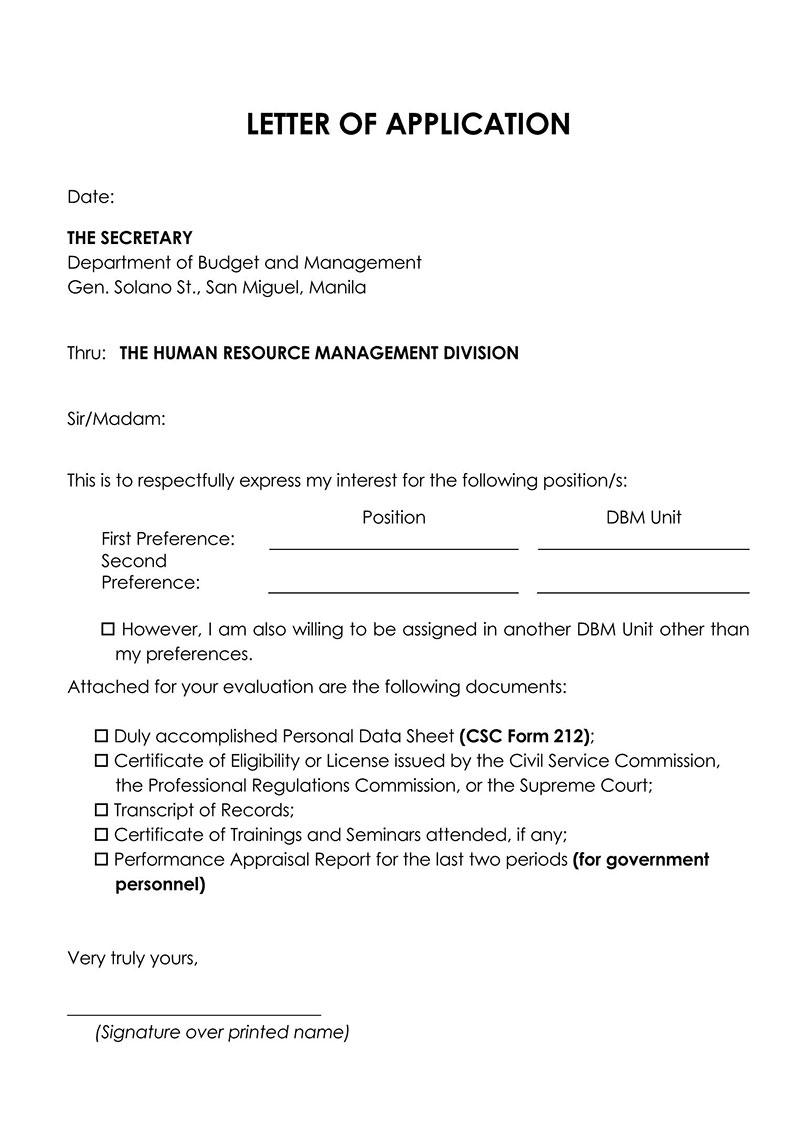
Differences Between an Application Letter and a Cover Letter
A job applicant may find both cover letter and application letter as useful documents to present to the potential employer. However, these two documents differ in the following ways:
Purpose of the letter
A job application letter covers every detail of your professional qualifications, including years of experience and expert skills. It conveys your capacity to the potential employer and convinces the employer to interview and employ you. This is quite different from a cover letter, which only defines your qualifications and the letter’s aim.
Introduction
The cover letter gives brief details about the job applicant as it links the potential employer to the applicant’s curriculum vitae and is usually about three to four sentences long. For example:
“I am Victor Paul, applying for the Sales Representative position at Monte Crafts Limited. With my 7 years of experience in marketing and sales, I believe I will be suitable and fit for this position.”
However, an application letter contains more detail and depth, containing all necessary details of the skills and experiences that qualify the candidate for the position, for example:
“My name is Rose Peter, and I have been working at the Poll Intinent for 12 years as the head sales and organization manager. I have seen the company’s clientele rise from a meager number of 120 to about 4,500 customers. This result is due to my team’s diligence and hard work , as well as our communication and managing skills. I have obtained a dual degree in psychology and business management and several workshops that have honed my people management and communication skills.”
Work history
The cover letter is an introduction to the applicant’s curriculum vitae and contains little work history details . The application letter, however, contains a brief summary of the applicant’s qualifications, for example:
“In my years of service, I was opportune to head several marketing and sales interventions for my current company of employ, which were all successful. Hence, I believe that my skills in sales and marketing will come in handy in your company’s sales department.
Letter content
A cover letter is usually brief and has minimum information, which compels the reader to read through the rest of the application. In contrast, the application letter contains all information that the potential employer needs to know, including the applicant’s educational background, skillset, and experiences in similar workspaces. In addition, the application letter has details that are of interest to the potential employer and will pique their interest in you as an applicant.

Letter length
The cover letter is usually brief and consists of short sentences that link the employer to other application documents and the applicant’s qualifications, whereas the application letter is a bit lengthy and contains vital professional information, interests, and qualifications of the applicant.
Letter attachment
The cover letter is usually part of the applicant’s documents and goes alongside their curriculum vitae and recommendation letter(s) .
An application letter, however, can be a stand-alone document which you submit to the potential employer. It covers all details and information about the applicant that is of relevance to the employing organization.
Educational purposes
Applicants use cover letters to apply for job opportunities alongside their curriculum vitae, but you can use an application letter for much more than a job. Since an application letter is all-encompassing, you can also use it to apply for an internship or field attachment. It contains your career goals and gives the potential employer an insight into your core values.
When to Send Each Letter?
A cover letter is generally most acceptable when applying for a job with a vacancy. A cover letter goes alongside the curriculum vitae of the job applicant and other necessary documents, while an application letter comes in handy when you are applying for a job without an announced opening. Here, the letter contains more details that are professional because you are trying to convince the employer to consider you when there is a job opening that suits your qualifications.
How to Format Application Letter?
Your job application letter format largely depends on your mode of submission. When sending an application letter to a potential employer via email, its format is a little different from a printed or handwritten letter. We have compiled several detailed application letter examples to guide you as you write your job application letter.
Your application letter should contain the following:
This usually contains the applicant’s address as well as the potential employer’s address and the date. The header should have the name, residential address, phone contacts, and email addresses of the applicant and recipient of the letter. The header ends with the date. This is the format of any formal letter header, but when sending this letter through an email, you must include your contact after your signature to help the organization contact you to set up an interview or meeting.
This comes next after the header and entails politely addressing the potential employer. The most common salutation is, “Dear Mr./Sir/Ms.” followed by the person’s name. If you are unsure of the person’s gender, you can address the person’s official position. For example, “Dear Manager.”
Subject line
This single line serves as the letter’s title, carrying a summary of the purpose for writing the letter. It is usually in capital letters and underlined. For example, “Application Letter For Head Sales Manager.”
This is the letter’s opening paragraph, where you should write briefly about yourself and your qualifications. This must be colorful and rich without being too flashy as it determines the depth of the potential employer’s interest in your letter.
The body of the letter can be divided into three distinct paragraphs. Firstly, you should mention what job position you are applying for and where you saw the job vacancy. Then move on to the next paragraph, where you talk about specific skillsets and beneficial areas of expertise that can solve the employing company’s real and potential needs. The third paragraph is the concluding part of the body of the letter, where you are to appreciate the employer for their time sincerely.
In concluding a formal application letter, you must sign off politely using words such as “Yours sincerely” followed by your name and signature. If you send the letter via email, you must include your mobile contact after signature.
Sample Formats
Following are some sample for mats and examples for best understanding
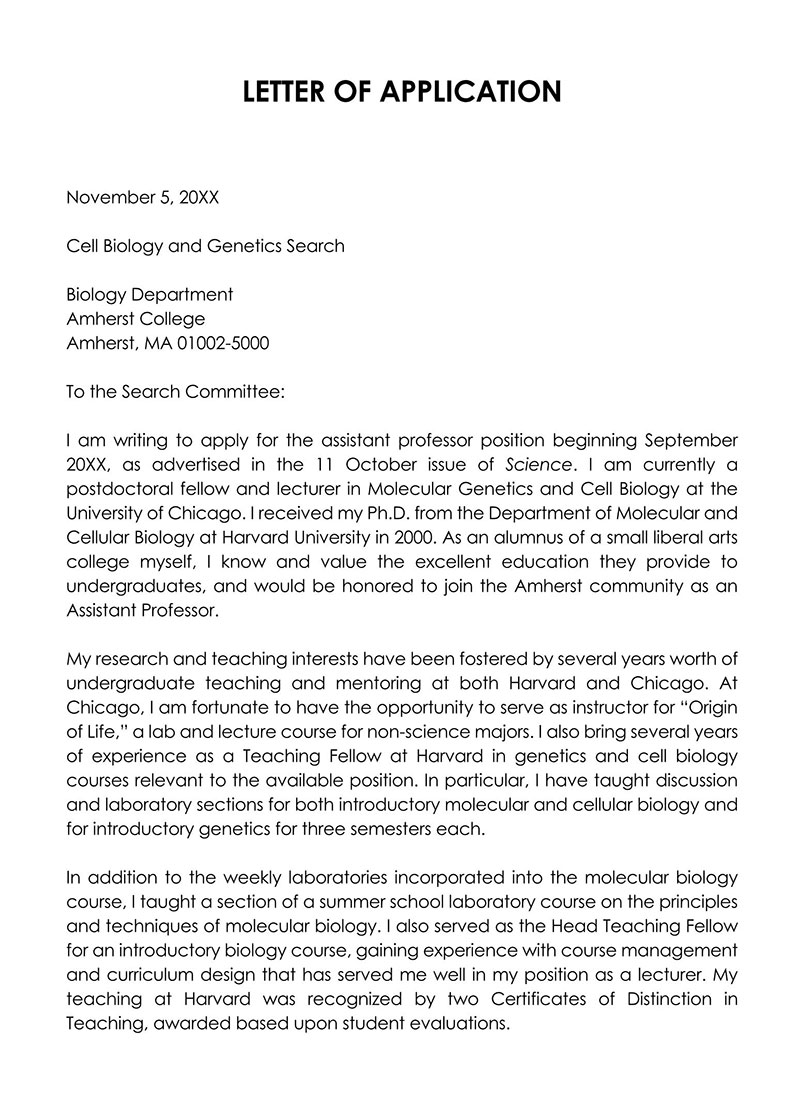
Writing a Perfect Application Letter
A job application letter is usually the first interface between a potential employer and a job applicant. Hence, you must strive to make the best first impression on your potential boss through your application letter.
This is why we have provided a breakdown of the necessary steps in writing a job application letter.
We have also provided application letter examples to help guide you as you write your application letter:
Describe your interest in the position
In the opening paragraph of your letter, you should begin by stating the exact position you are applying for and how you learned about that position in the organization. You must then state the qualifications and experiences that make you the best fit for that position and present yourself as apt and capable to function excellently in said position.
This is the first paragraph of the letter, and so it is most likely the paragraph that determines the interest of the potential employer in the rest of your letter hence it must be captivating and professional.
Highlight your experiences and qualifications
You must highlight all educational qualifications as well as professional experiences. This is especially important in your job application letter because you may not attach it to a copy of your resume, and so the application letter must be concise and yet have all the necessary details of your qualifications. It is helpful to have an outline of all your qualifications and then match them up with the needs of the position for which you are applying.
Emphasize your skills and abilities
In the job-seeking market, your soft skills and various unique abilities in your field set you apart from the crowd. Hence, it is wise to emphasize these skills and abilities. It will do you good to investigate the organization and know what skills are of interest to them. When you achieve this, you will capture the employer’s interest by emphasizing the skillsets that the organization needs in order to thrive.
Include aspects of your personality
The employer wants to know you beyond your educational qualifications and professional experiences, so positive traits such as hard work, diligence, and team player come to play. Mention aspects of your personality that will raise your score with the potential employer. This is a necessary part of your job application letter.
Express your appreciation
Sincerely appreciate the potential employer for taking the time to review your letter before concluding the job application letter.
Sample Letters
Below are two job application letter examples that will guide you when you write your own:
Lois Mende 134 Jenney Street, New Orleans 129 009-8762 [email protected]
Orin Kendel Hiring Manager, Jed and Jen 754 Olin Street New Orleans
September 23, 2021
Dear Mrs. Orin,
APPLICATION FOR THE POSITION OF MARKETING CONSULTANT
In response to the advert in the New Orleans Daily Newspaper of September 22, 2021, I am applying for the position of Project Researcher. I have held the position of head researcher in the Orleanslad for 21 years, and I believe that with my experience and skills, I will be able to contribute meaningfully to the Berkley project in your company.
I have a bachelor’s degree in resource management and urban planning and another in research methods. I have served as head of several research projects, including the humid post rate of disease and infection in New Orleans, the Beta research project, Foodborne disease, and the animal Adaptation to Urbanization Research of 2004. I have several training certificates for each research project and a certificate for each year’s project mining workshop.
I hope to improve my skills through new experiences of research, especially the proposed Water Cleansing project in 2022 that your organization plans to begin. My core values are diligence, hard work, and team building. With these, I believe that I will best suit the position of research manager.
I am sincerely grateful that you took the time to read through this letter, and I hope to hear from you soon.
Yours sincerely
Lois Mende.
Maureen Peter 345 Kelvin Street Alabama – 12 342-9099-098 [email protected] Wisdom Samson Alabama Mining City Alabama-12
July 12, 2019.
APPLICATION N FOR THE POST OF MINING ENGINEER
My name is Wisdom Samson, and I want to express my interest in your company’s mining engineer position. In my previous jobs, I conducted various mining activities such as researching the various land mines and mining methods and planning and mining several ores from sites. Due to my diligence and work experience, I consider myself a great fit for this position.
I obtained my bachelor’s degree from the prestigious Alabama School of Engineering and have since obtained an MSc and Ph.D. in Field Mining and Processing. I have served as head of the Ore Processing Unit for the past eight years in Uncle and Mines. I hope to harness all my experiences and skills in achieving new mining fits in Alabama via your company.
My core values are doggedness and endless learning. I hope these values can come to play in the Alabama Mines team, and I hope to learn from all the projects set before the company.
I am extremely grateful you reviewed my letter and hope to hear favorable news from you.
Yours sincerely,
Maureen Peter 342-9099-098
7 Best Practices to Follow
The following tips will help you create an exceptional application letter, especially using the above application letter example as a template to write your application letter:
Review information
Most companies look to employ more people when they are taking on a new project and hence will naturally consider the applicants who will help in such projects. Therefore, you must research the company’s ongoing projects and think of ways to serve in such projects. You must be able to sell yourself as the best candidate for the position and company to secure the position.
Use a professional format
It is very important to keep up with the professional application writing format. Hence the reason for the job application sample letters. This makes you a diligent professional and speaks highly of you to the employer.
As much as you want to be detailed, keeping the letter brief and concise is very important. You must focus only on the most important aspects of the letter and keep on track without flamboyant words.
Review the job listing keywords
Most organizations will include certain skills and qualifications as requirements for a certain job, and so you must carefully note these and emphasize the keywords when writing a job application to such an organization. As in the application letter examples above, common keywords include
“communication skills, punctuality, time management skills, diligence, and hard work.”
Always write one
Always write an application letter for every job position that interests you. This is unless the employing organization specifically asks you not to do so. However, an application letter improves your chances of obtaining the job as the employer gets to interact with you almost as though in a physical meeting.
Sell yourself
Employers search for the best employees there are, so you must sell yourself in your application letter as the best in your field. This involves emphasizing your strengths and qualifications, especially those that are beneficial to the organization.
The application letter gives the employer the first impression of you, so you must make this impression positive and flawless. Your letter must be impeccable and free of errors, and you must also stick with the rules of writing a formal business letter . Proofread your letter as many times as you can to correct any errors that may be. Write the first draft as a sample, proofread and then write the final draft of the job application letter.
Final Thoughts
A job application letter is a necessary document in applying for a job position and must be formal and professional. It is, most times, the first interface between the employer and applicant, and so it must be flawless and free of errors. It must represent the applicant as capable of the job position and the best in that career path. The job application letter must follow the patterns of a formal letter and must include all major components of a job application letter. This may be time-consuming and burdensome, but with the application letter examples, sample letters, and templates in this article, you now have a guide that you can follow as you write your job application letter.
About This Article

Was this helpful?
Great! Tell us more about your experience
Not up to par help us fix it, keep reading.

Letters and Emails , Request
How to ask for salary increase (15 best sample letters).

Employment , Human Resource
Free employee emergency contact forms (word | pdf).

Letters and Emails
How to reply to an interview invitation email (samples).

How to Write an Employee Work Statement (14 Examples)

Employment , Letters and Emails
How to write a job acceptance letter (samples).

Free Employee Disciplinary Action Forms (Word | PDF)

Reschedule Interview Email (How to Write) – Examples

Cover Letters , Letters and Emails

Introduction , Letters and Emails
Writing a letter of introduction for employment (samples).

Best Sales Cover Letter Examples | How to Write

Letters and Emails , Resignation
How to write a teacher resignation letter (18 best samples).

Letters and Emails , Real Estate , Verification
Rental verification letter: how to write (with examples), thank you for your feedback.
Your Voice, Our Progress. Your feedback matters a lot to us.

[5 Format] Cover Letter Samples for Job Application in Word Format
1. standard cover letter sample.
When searching for a Standard Cover Letter sample, ensure it includes a professional introduction expressing your interest in the specific job and briefly highlights your key qualifications and how they align with the position’s requirements, setting the tone for a comprehensive application.
✪ DOWNLOAD IN WORD
File Format: Word
2. Career Change Cover Letter Sample
In your search for a Career Change Cover Letter sample, look for a template that effectively conveys your motivation for transitioning into a new field and highlights transferable skills and experiences that make you a strong candidate in your new career path. Customizing this letter to your specific situation is crucial for success.
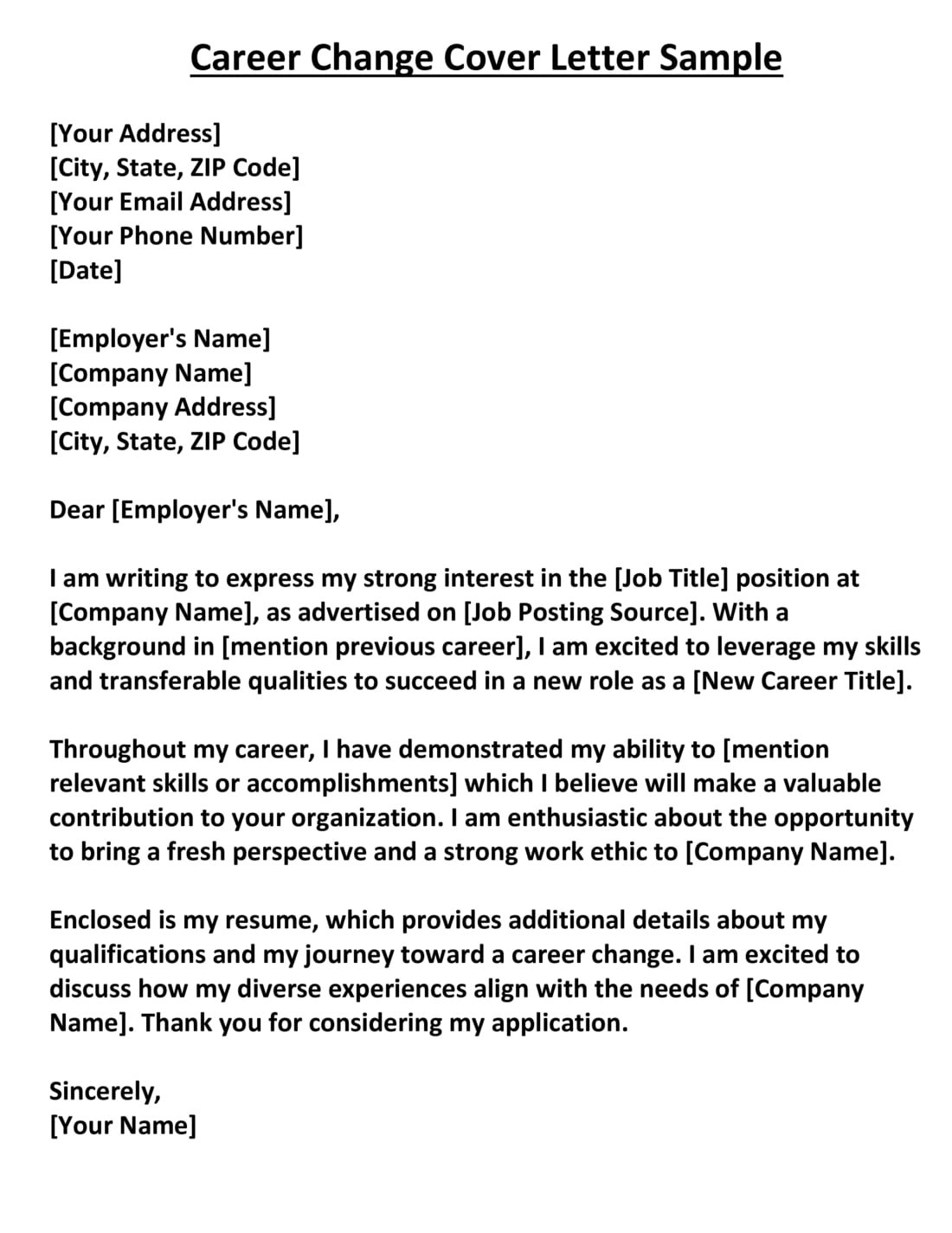
3. Entry-Level Cover Letter Sample
When you need an Entry-Level Cover Letter sample, look for one that showcases your eagerness to kickstart your career, emphasizes your relevant education or internships, and conveys your enthusiasm for the specific job you’re applying to, making a compelling case for your potential as an entry-level candidate.
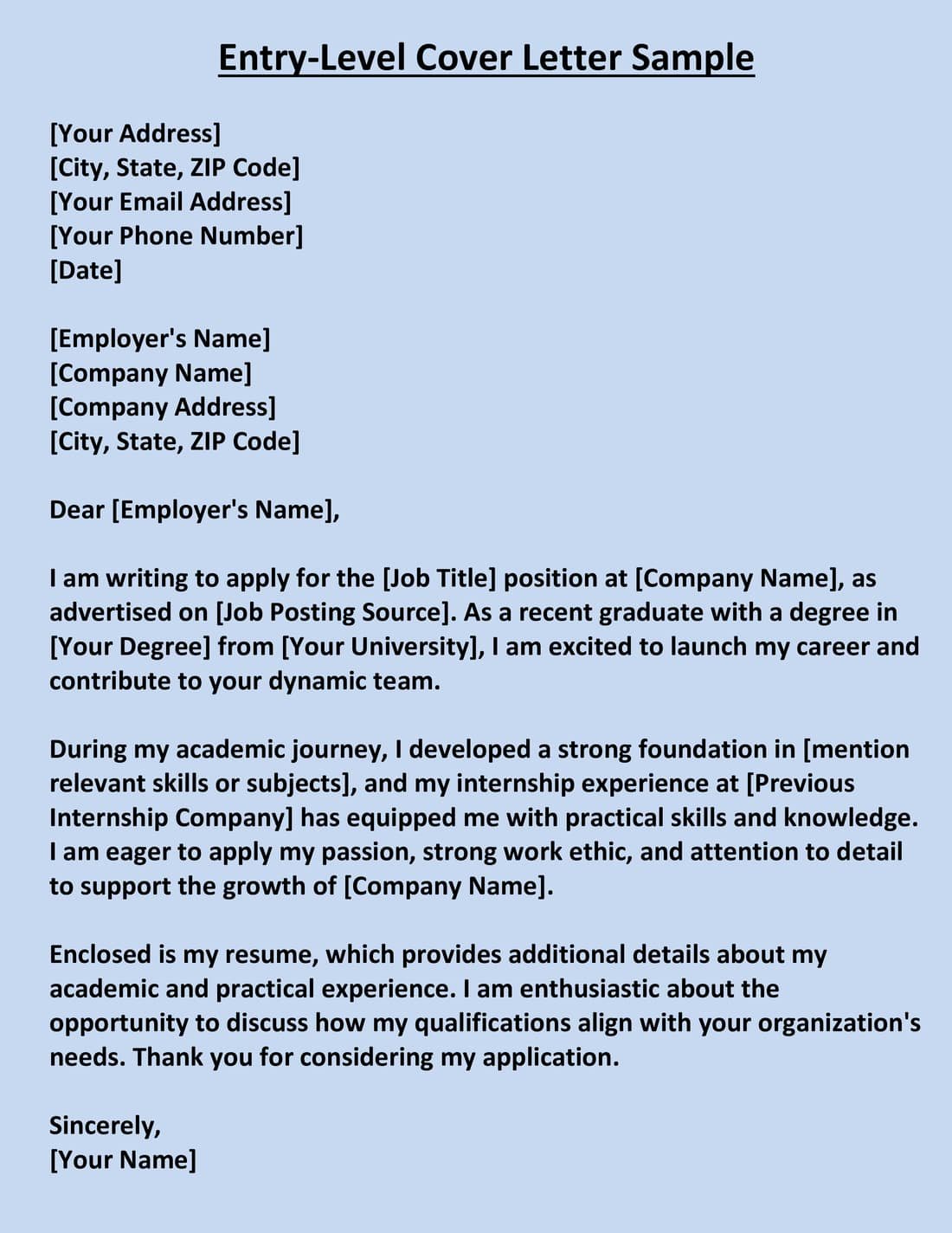
4. Cover Letter with a Strong Emphasis on Leadership
When in need of an editable Cover Letter with a strong emphasis on leadership, seek a template that allows you to customize examples of your leadership experiences, highlighting your ability to lead teams, drive projects, and inspire positive change in an organization, making it a powerful self-presentation tool.
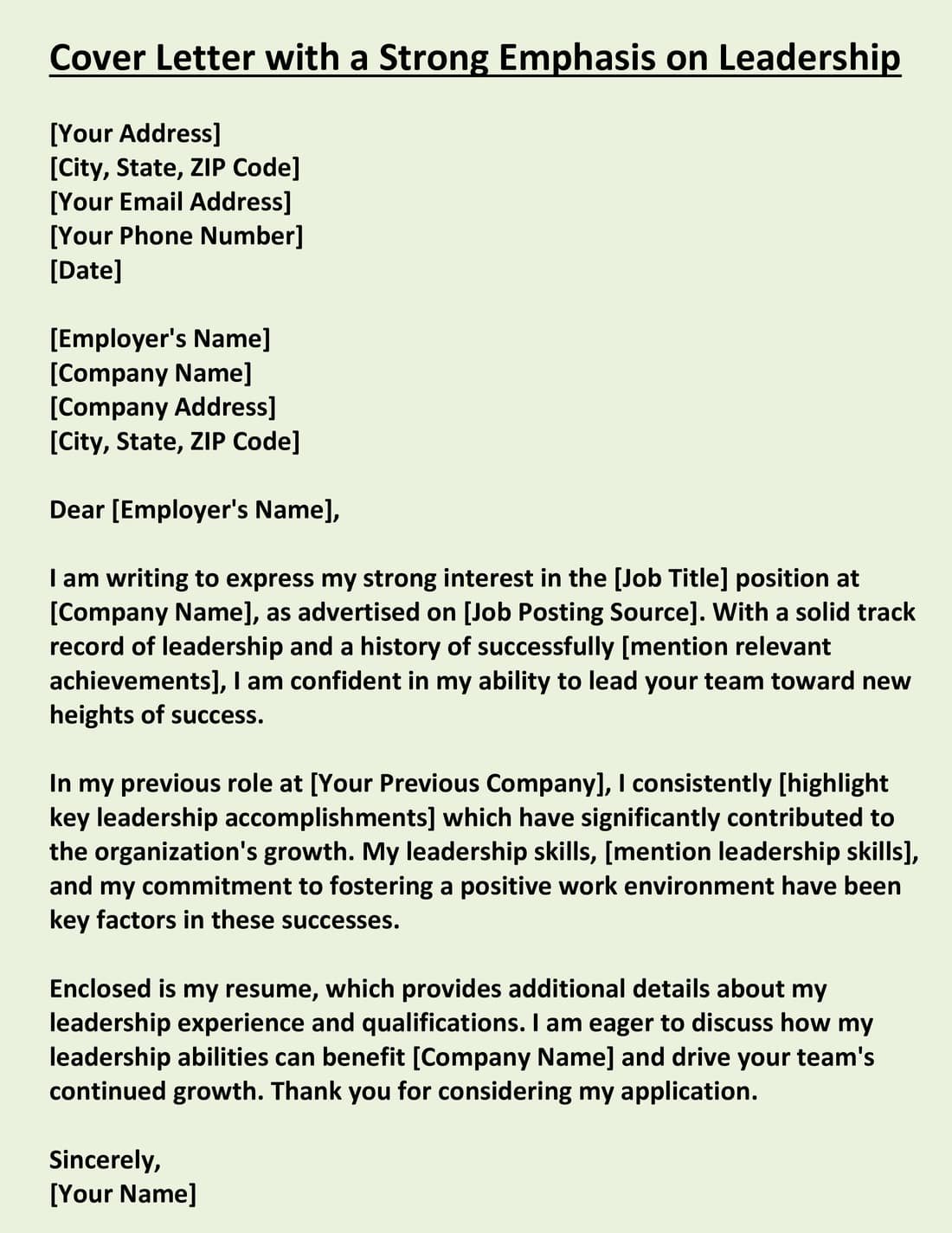
5. Cover Letter with a Referral
In your quest for an editable Cover Letter with a referral, ensure it accommodates personalization with details from the referral source while maintaining a professional structure. This will maximize the impact of the endorsement and help you secure the job opportunity.

Nazim Khan (Author) 📞 +91 9536250020 [MBA in Finance]
Nazim Khan is an expert in Microsoft Excel. He teaches people how to use it better. He has been doing this for more than ten years. He is running this website (TechGuruPlus.com) and a YouTube channel called "Business Excel" since 2016. He shares useful tips from his own experiences to help others improve their Excel skills and careers.

Leave a Comment Cancel reply
Save my name, email, and website in this browser for the next time I comment.
Notify me of new posts by email.
195 Resume Power Words That Will Get You Hired (+ Examples)

3 key takeaways
- Power words in resumes can significantly increase your chances of getting noticed by hiring managers.
- Tailor your power words to your specific industry and job role for maximum effectiveness.
- Teal’s AI Resume Builder helps make every resume bullet point impactful with AI.
Power words are to resumes what headlines are to a newspaper—they highlight key details and orient the reader. Resume action words grab the attention of the hiring manager and applicant tracking systems—increasing your odds of standing out.
In this guide, you'll learn 195 resume power words, how to use them effectively, and the nuances of industry-specific power powers to help you craft a compelling resume that lands job interviews.
Struggling to land interviews? Write a more impactful resume with Teal's resume builder AI .
What are resume power words?
Resume power words are strong, descriptive words that highlight your skills, achievements, and qualifications. These words help you make an impact because they:
- Grab attention: They draw the reader's eye to your key accomplishments.
- Convey confidence: You appear self-assured and capable by using assertive language.
- Showcase specificity: Power words are precise and help hiring managers skim your resume without missing important details.
- Improve ATS performance: Power words often align with keywords that applicant tracking systems are programmed to identify. This increases your chances of passing initial screenings.
195 resume power words to supercharge your application
To make your resume stand out, use words that showcase your achievements. Here's a list of resume power words designed to help your application leave a lasting impression on hiring managers.
Resume action verbs
Strong action verbs communicate your exact responsibility in a job role. They help hiring managers assess your accomplishments in context. Here are 100 powerful verbs that can make each bullet point on your resume more compelling.
- Spearheaded
- Orchestrated
Communication
- Articulated
Problem-solving
- Troubleshot
- Streamlined
- Conceptualized
Achievement
- Outperformed
- Accelerated
- Investigated
- Benchmarked
Improvement
- Coordinated
- Administered
- Consolidated
Customer service
- Implemented
Project management
- Facilitated
Collaboration
Accomplishment, descriptive adjectives.
The right adjectives can paint a vivid picture of the candidate's personal qualities and strengths. These 50 descriptive words will help you make an impact.
- Collaborative
- Resourceful
- Enterprising
- Conscientious
- Accomplished
- Results-oriented
- Detail-oriented
Industry-specific buzzwords
Each industry has its own language, and using the right buzzwords can demonstrate your expertise and familiarity with the field. These 45 industry-specific terms can help you speak directly to hiring managers in your chosen field.
- Machine learning
- Cryptocurrency
- Risk management
- Quantitative analysis
- Content marketing
- Brand equity
- Conversion rate
- Customer acquisition
- Telemedicine
- Electronic health records (EHR)
- Patient-centered care
- Clinical trials
- Population health
- Differentiated instruction
- Blended learning
- Formative assessment
- Inquiry-based learning
Human resources
- Talent acquisition
- Employee engagement
- Diversity and inclusion
- Performance management
- Succession planning
- Due diligence
- Intellectual property
- Arbitration
Manufacturing
- Lean manufacturing
- Supply chain management
- Quality assurance
- Just-in-Time (JIT)
Environmental
- Sustainability
- Renewable energy
- Carbon footprint
- Circular economy
- Green technology
How to use power words effectively in your resume
Now, you can’t just replace regular words with their “powerful synonyms” and call it a day. You have to place them strategically to gently compel the reader or impress hiring managers. Here’s how:
Identifying key responsibilities in job postings can help you tailor your resume effectively, ensuring alignment between your skills and the specific demands of the job.
Using power words effectively requires strategy and balance. Here’s how to make the most of them in your resume.
Tailor power words to job descriptions
To maximize your chances of getting noticed, align power words closely with the specific job description:
1. Analyze the job posting: Identify key skills, qualifications, and responsibilities emphasized in the listing.
2. Highlight relevant keywords: Note industry-specific terms and power verbs used in the description. Tip: Teal's Matching Mode does this for you.
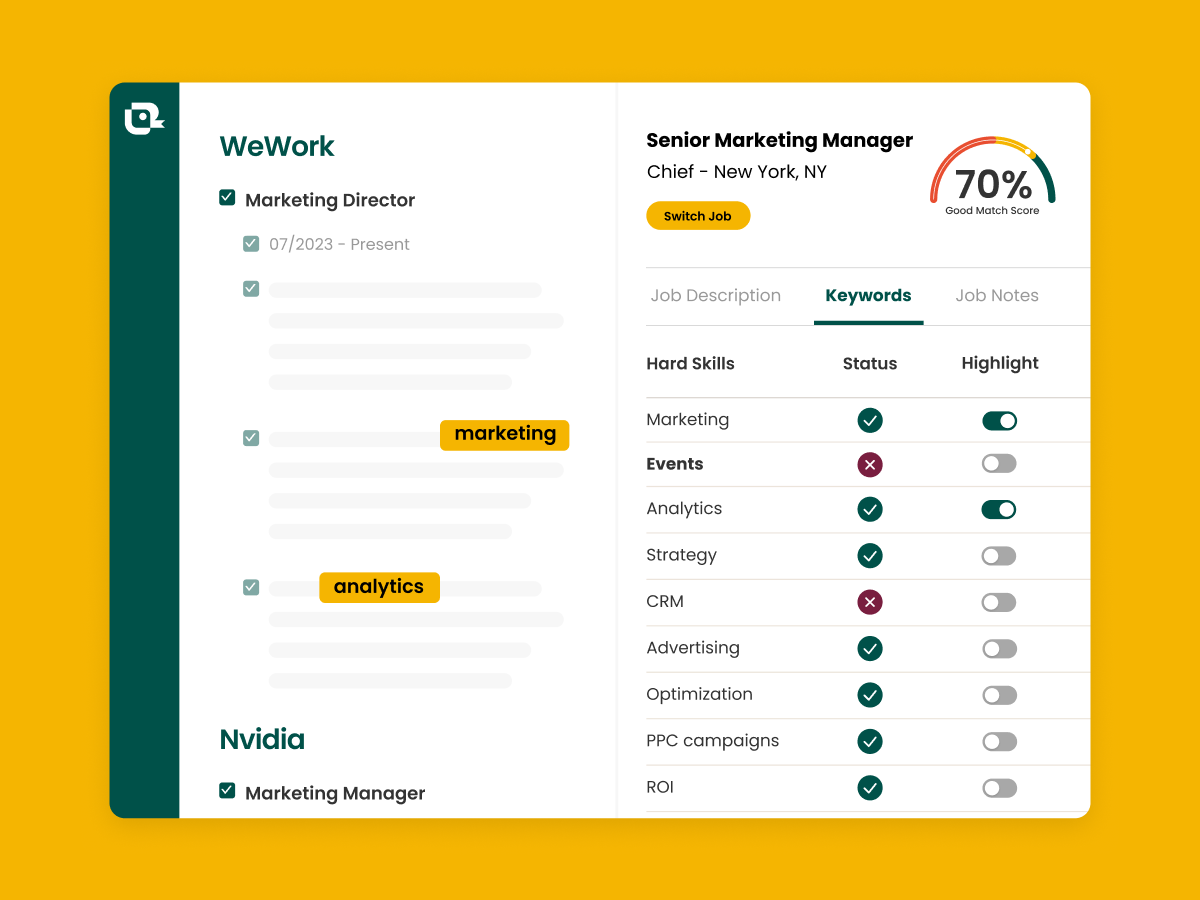
3. Match your experiences: Select power words that accurately describe your achievements and align with the job requirements.
4. Incorporate naturally: Weave these words into your resume, ensuring they fit contextually and don't appear forced.
5. Prioritize placement: Use the most impactful power words in prominent sections like your professional summary and recent job descriptions. If you're writing a cover letter, sprinkle power words throughout but don't stuff them in any one section.
Balance action words with concrete examples
While power words add impact, they must be supported by specific, quantifiable achievements:
- Start with a power word: Begin each bullet point with a strong action verb.
- Follow with a specific accomplishment: Provide context and details about what you achieved.
- Quantify results: Include numbers, percentages, or other measurable outcomes whenever possible.
- Show impact: Explain how your actions benefited the company or contributed to larger goals.
Power word example in a sentence
- Weak: Responsible for sales increase.
- Strong: Spearheaded sales initiative that boosted revenue by 35% in Q3, outperforming targets by 20%.
Avoid overuse and maintain authenticity
While power words are effective, overuse can diminish their impact and make your resume seem insincere:
- Use variety: Avoid repeating the same power words throughout your resume.
- Be truthful: Only use words that accurately reflect your experiences and abilities.
- Balance with simpler language: Mix power words with more straightforward language to maintain readability.
- Consider context: Ensure the power words you choose are appropriate for your industry and career level.
- Read aloud: Review your resume by reading it out loud to catch any awkward phrasing or overuse of power words.
Replacing weak words with power words
Not all words are created equal when it comes to your resume. By replacing weak, vague words with stronger alternatives, you can create a more impactful narrative. Here’s how to make those crucial swaps:
Common weak words to avoid
Frequently used weak words can dilute the impact of a resume by making your accomplishments seem vague or unimpressive. Here are some common weak words and why they are ineffective:
- Responsible for : Implies duty, not action
- Helped : Lacks specificity and doesn’t highlight your role
- Worked on : Vague and does not convey the impact of your initiative
- Assisted with : Implies a secondary role, not leadership
- Participated in : Does not show your direct contributions or the extent of your role
- Job duties included : Focuses on tasks rather than achievements
- Familiar with : Suggests a basic understanding and not proficiency
- Involved in : Does not clarify your specific role
- Handled : Too general; does not indicate outcomes
- Dealt with : Vague and non-specific
Power word alternatives
Replace weak words with powerful alternatives to make your resume more dynamic and impactful. Here’s a list of common weak words and their power word alternatives:
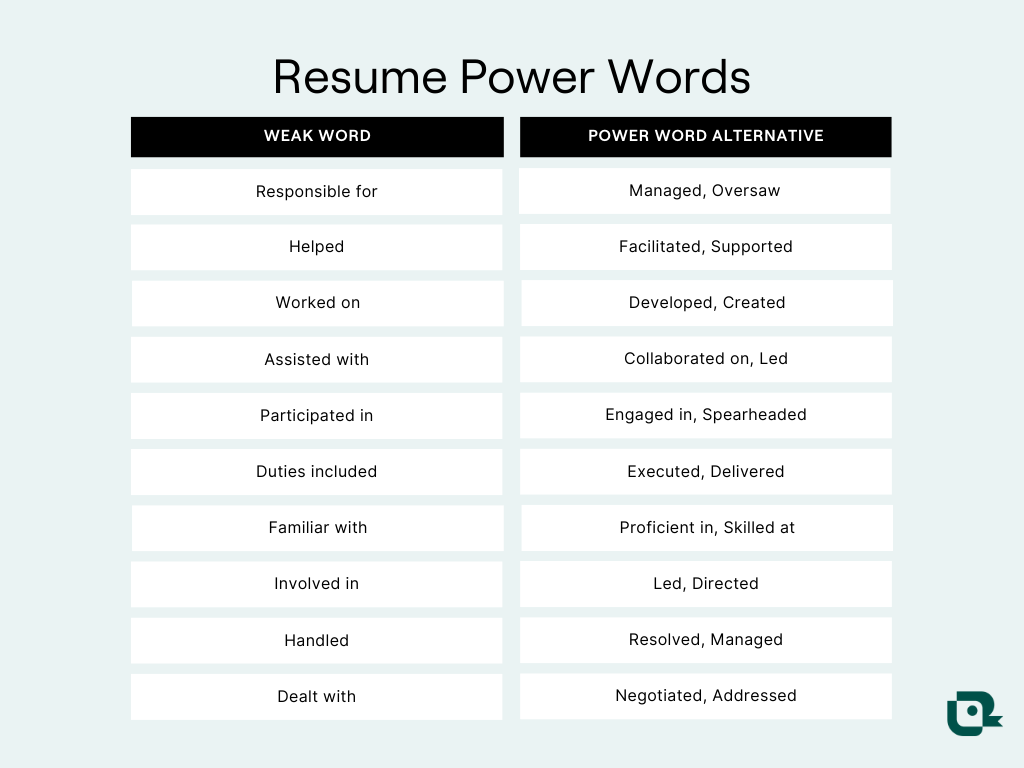
Examples of how to rewrite sentences using power words:
Weak: Responsible for managing team projects. Strong: Orchestrated cross-functional team projects, consistently delivering results 15% ahead of schedule. Weak: Helped with customer service issues. Strong: Resolved complex customer service issues, achieving a 98% satisfaction rate and reducing escalations by 30%. Weak: Worked on marketing campaigns. Strong: Developed and executed integrated marketing campaigns, driving a 25% increase in customer engagement.
Industry-specific power word examples
Tailoring your resume with industry-specific power words can draw the reader's attention to relevant achievements. These examples show how to align your language with the expectations and standards of various fields.
Technology and IT
In the world of technology and IT, precision and clarity are key. Here’s a selection of power words that can help you articulate your technical expertise and accomplishments.Power words
- Architected
Sample resume statements
- Architected scalable cloud infrastructure, reducing downtime by 99% and cutting operational costs by 30%.
- Debugged complex legacy code, improving system performance by 40% and eliminating critical security vulnerabilities.
Finance and accounting
Accuracy and attention to detail are crucial in finance and accounting. These power words will help you highlight your analytical skills and financial acumen:
Power words
- Diversified
- Strategized
- Forecasted quarterly revenue projections with 98% accuracy to aid expansion initiatives.
- Streamlined accounts payable processes, to reduce processing time by 35% and eliminate $50,000 in annual late fees.
Marketing and sales
Success in marketing and sales depends on driving engagement and converting opportunities into results. These power words will help you showcase your ability to innovate, persuade, and achieve impressive outcomes:
- Transformed
- Revolutionized
- Launched an innovative social media campaign that led to increased brand engagement by 150% and drove 10,000 new qualified leads.
- Negotiated strategic partnerships with key industry players, resulting in a 40% boost in annual revenue and expanded market share.
Healthcare and medical
In the healthcare and medical sectors, your resume usually needs to reflect both your technical skills and your dedication to patient care. These power words emphasize your expertise in delivering quality healthcare and improving patient outcomes.
- Rehabilitated
- Collaborated
- Implemented new patient care protocols, reducing average hospital stay duration by two days and improving patient satisfaction scores by 25%.
- Researched and introduced cutting-edge treatment methods, resulting in a 40% increase in positive outcomes for chronic condition management.
Education and teaching
Educators are not just teachers—they are mentors and leaders shaping the future. Use these power words to highlight your contributions to student learning, curriculum development, and educational excellence.
- Differentiated
- Developed and implemented inquiry-based science curriculum, increasing student engagement by 45% and improving standardized test scores by 30%.
- Mentored struggling students through targeted intervention programs, resulting in an 80% improvement in academic performance over one semester.
How to add power words to different resume sections using AI
Strategically incorporating power words throughout your resume can make it seem more personalized and human. Here's how Teal helps:
Professional summary
The professional summary is your chance to make a strong first impression. Use power words to concisely convey your value proposition:
Example: "Dynamic marketing strategist with a proven track record of developing innovative campaigns that drive engagement and boost ROI. Skilled in leveraging data analytics to optimize performance and deliver measurable results across diverse industries."
You can add a professional summary by using Teal’s in-built summary generator. Follow these steps:
- Import your existing resume into the Resume Builder
Import your LinkedIn profile or create a resume from scratch in minutes if you don't have one. Your summary will be more accurate if you provide more details about your career.
- Update your work experiences and add achievements
Be sure to include multiple accomplishments related to your recent roles for the best results from the Resume Summary Generator.
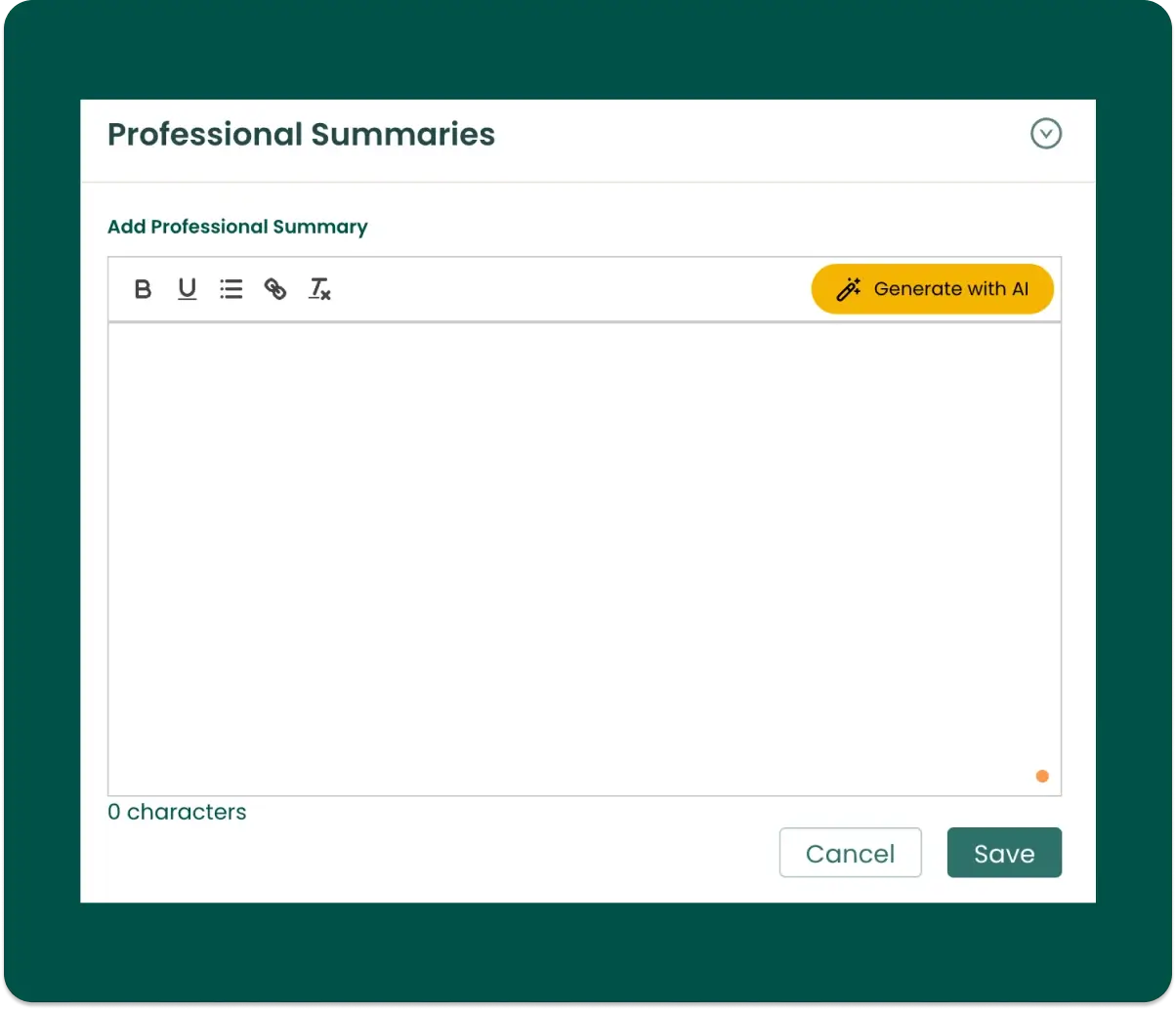
- Generate your resume summary with AI
Save the AI-generated resume summaries to your Teal Resume Builder.
- Review and regenerate your summary
By clicking "Re-generate with AI", you can generate a new professional summary based on the existing settings.
You can save multiple resume summaries so you can use different ones for different applications.
Work experience
In your work experience section, use power words to highlight your achievements and responsibilities.
Teal's AI Assistant makes this easy, automatically adding power powers to the beginning of every bullet point.
- Before: Responsible for managing team and completing projects.
- After: Spearheaded a cross-functional team of 12, delivering complex projects 20% under budget and one week ahead of schedule.
- Before: Helped with customer service and solved problems.
- After: Resolved critical customer issues, achieving a 98% satisfaction rate and reducing churn by 15%.
Skills section
Enhance your skills section by using power words that align with industry-specific competencies:
- Proficient in data visualization and predictive modeling techniques
- Adept at agile project management methodologies
- Skilled in negotiating high-stakes contracts and partnerships

Achievements and accomplishments
Use power words to make your achievements and resume stand out:
- Pioneered company-wide sustainability initiative, reducing carbon footprint by 30% and generating $2M in cost savings.
- Orchestrated merger and acquisition strategy, resulting in 50% market share growth within 18 months.
- Revolutionized customer onboarding process, slashing time-to-value by 60% and boosting retention rates by 25%.
The impact of power words on applicant tracking systems (ATS)
In today’s job market, your resume must pass through ATS before reaching human eyes. Understanding how power words interact with these systems can give you a crucial edge in landing an interview.
How ATS process power words
Applicant tracking systems (ATS) play a crucial role in the initial screening of resumes. Here’s how they interact with power words:
- Keyword matching: ATS scan resumes for specific keywords related to the job description.
- Relevance scoring: Resumes are ranked based on the presence and frequency of relevant terms.
- Contextual analysis: Advanced ATS can understand the context in which words are used, not just their presence.
- Skill identification: Power words often signal specific skills or experiences that match job requirements.
Strategies for ATS-friendly power word usage
To ensure your resume is both ATS-friendly and impactful:
- Incorporate relevant keywords: Use keywords from the job description naturally throughout your resume.
- Balance power words and keywords: Mix industry-standard terms with relevant power words.
- Avoid overstuffing: Don’t overuse keywords or power words to the point of reducing readability.
- Use standard formatting: Stick to simple, ATS-compatible formatting to ensure all keywords and power words are recognized.
Measuring the effectiveness of your power words
Crafting the perfect resume requires continuous refinement. A/B testing and gathering feedback are essential for measuring the impact of your power words and ensuring your resume resonates with employers.
A/B testing your resume
A/B testing your resume can help determine the effectiveness of different power word usage:
- Create variants: Develop two versions of your resume, each using different sets of power words.
- Submit both versions: Apply to similar jobs with both resume versions.
- Track responses: Monitor the response rate from employers for each version.
- Analyze results: Determine which version received more positive feedback or job interview invitations.
Gathering feedback
Professional feedback is crucial for refining your resume:
- Ask for reviews: Request input from career coaches, mentors, or peers.
- Use online services: Utilize professional resume review services for expert advice.
- Interpret feedback: Analyze the feedback received to understand how your power word usage can be improved.
Power up your career with resume power words
To create a distinct resume, use words that pack a punch and highlight your achievements with precision. Power words tailored to the job and industry can elevate your resume’s impact. But remember, balance is crucial—combine these words with metrics and case studies to avoid sounding superficial.
Start by refining your resume and adding or improving power words where needed. Teal’s AI-powered Resume Builder can streamline this process, helping you craft a resume that grabs attention.
Frequently Asked Questions
How many power words should you include in your resume.
Balance is crucial when incorporating power words into your resume. Aim for one to two power words per bullet point to maintain a strong yet natural tone. This ensures your resume is impactful without appearing exaggerated.
Can using too many power words hurt your chances of getting hired?
Yes, overusing power words can hurt your chances by making your resume seem insincere or cliché. It’s important to use power words genuinely to reflect your true experiences and achievements. Mixing power words with straightforward language helps maintain a natural flow.
Are there any power words you should avoid in your resume?
Avoid overused or cliché power words like "committed dynamic," "synergy," "hardworking," and "go-getter." These terms can make your resume seem generic and unimpressive. Instead, choose more industry-specific and impactful alternatives that accurately describe your skills and achievements.
How can you use power words if you're just starting your career?
If you're starting your career, focus on highlighting transferable skills gained from internships, volunteer work, or academic projects. Use power words to emphasize your enthusiasm and potential for growth. For example, instead of "participated in a marketing project," say "spearheaded a marketing project that increased social media engagement by 20%."

Related Articles
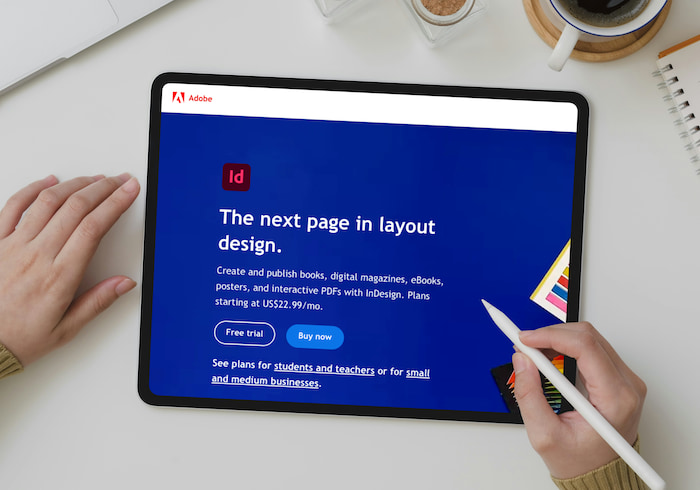
How to Make an InDesign Resume [+ Templates]

How (and What) to Name Your Resume File

ZipJob Reviews: Ratings & User Feedback

JobHero Reviews: Ratings & User Feedback

We help you find the career dream.
How to write a leave request email (with examples)
You’ve been saving up your annual leave days and you’re ready to take off on that long-awaited holiday. Or maybe you’re having a baby and you’re planning some parental time off. Before you do anything else, there’s one important thing to cross off your to-do list: put in your request for a leave of absence.
It might sound simple enough, but the way you request your leave can have a big impact on how your employer perceives the request and responds to it. A well-written leave application email submitted with plenty of advance notice is a reflecion of your professionalism and your respect for your employer and colleagues.
Learn the correct format and content to include in your leave request, to make sure it is clear and appropriately detailed. Read our sample letters and templates, tailored to different types of leave requests, and use them as a practical reference to help you draft your own. Get ready to write a leave letter to an employer that ticks all the boxes for professional courtesy.
What is a request for leave email?
A request for leave email is an email you send your manager asking to take time off from work. It outlines your need to be absent from duties for a specific period and should clearly state the reason for your leave, the dates you plan to be away and, depending on the type of role you have, how you might manage work responsibilities during this time.
Australian employees get minimum entitlements for different types of paid leave:
- Annual leave: used for any type of leisure time off. Annual leave is usually planned and scheduled weeks or months in advance.
- Sick leave: for when you’re not well enough to perform your duties. Sick leave is unplanned and may require a doctor's note, depending on your employer's policy. Mental health days fall under sick leave, as does carer’s leave, when you need to take care of a sick family member.
- Compassionate leave: or bereavement leave is to take time off after the death of a loved one.
- Parental leave: paid and unpaid parental leave when having a baby or adopting a child under 16.
- Long-service leave: an extended period of time off for employees who have been with the same company for seven to 10 years.
- Community service leave: for jury duty or an emergency management activity.
- Family and domestic violence leave: to attend to matters related to family and domestic violence.
How to write a request for leave email
Before you confirm any personal plans, it’s best to wait until your leave is approved. Writing a polite request for leave email is a handy professional skill to have. Here are the steps to take when writing an email to request leave:
- Start your email by addressing it to the appropriate person. This is usually your direct supervisor or the HR department, depending on your company's policies. Use a polite greeting such as "Dear [Manager's Name]" or "Hello [HR Department's Name]" .
- Clearly state the purpose of your email at the beginning. Specify the type of leave you are requesting (annual, sick, carer’s, etc.) and the exact dates of your planned absence.
- If your leave requires documentation, such as a doctor's note for sick or medical leave, mention that you have attached this to the email.
- You may opt to include some assurance in your email that you will finalise any major projects before your leave, or hand over important tasks to a colleague. Whether you include this is dependent on your workplace culture and your role at the company.
- End your email with a professional closing, such as "Best regards" or "Sincerely," followed by your name.
- Before sending the email, take a moment to proofread it for any spelling or grammatical errors .
Remember to keep a polite tone and state your request concisely to minimise the potential for misunderstandings.
Tips for writing an email requesting leave
Writing a successful email to request leave requires more than just stating your need for time off. Here are some tips to help you out.
Understand the deadlines and procedures for proper submission
Before drafting your email, refer to your company's leave policies. Check the deadlines for submitting leave requests, especially for planned absences like annual leave, when you likely have to provide a certain amount of advance notice. If your request comes too late, it may not be approved.
Following organisation-specific guidelines
Different organisations have different guidelines for requesting leave. You might have to use a particular format for your leave email or you may have to submit a leave request through a portal like Workday. Familiarise yourself with your company’s guidelines, so that your request has the best chances of being approved.
Customise your email
Tailor your email to reflect the specific type of leave you are requesting. For instance, a sick leave request is usually more urgent and requires less detail about the absence. A parental leave request email will need more detail around paid and unpaid leave. A request for annual leave might need to be submitted months in advance if it’s around the time of a major seasonal holiday.
Maintain a polite and professional tone
Even if the reason for your leave is personal, maintain a polite and professional tone. Be honest about your reason for taking leave, but limit how much personal information you share, keeping details relevant and appropriate.
Address potential concerns
While you are fully entitled to your allotted days off, if you’re taking a long period of annual leave, try to mitigate coworker stress by anticipating any potential concerns your absence might cause and addressing them in your email. This could involve offering to provide handover notes for your key responsibilities or committing to finalise major jobs before you leave.
Request for leave application format
When you need to write a letter of leave from work, using a well-organised and easy-to-read format is essential. This ensures that you include all necessary information and present your request in a way that is easy for your employer to reference in future. Below is a template for a leave letter that can be adapted to various types of leave requests.
Subject: [Type of leave] request
Dear [Manager’s/Supervisor's name],
I am writing to request [type of leave, e.g., annual, sick, personal, carer’s] leave from [start date] to [end date].
[In the second sentence you may provide a small amount of detail, if you feel it is necessary.]
I will ensure that all my current tasks are up to date before my leave begins and will provide handover notes for my duties. [Optional] I have attached [any necessary documentation, e.g., medical certificate, if applicable] to this email for your reference.
Please let me know if there are any concerns or if further information is required.
[Your full name]
[Your position]
[Your contact information]
Request for leave letter example
While the above example is a generic letter that can be tailored to any type of leave, here are more specific examples for a leave request letter you can use for inspiration for your own email.
Personal leave request example
Subject: Personal leave request
Dear Chris,
I am writing to request compassionate leave from 14 March to 15 March due to a death in the family. [Colleague’s name] will take care of my most urgent projects while I’m away. I have also prepared notes and instructions to assist the team.
I appreciate your understanding and support during this time.
Sick leave request example
Subject: Sick leave notification
I’m writing to let you know that I will be taking a sick day today due to illness [11/10/24]. I anticipate being able to return to work tomorrow, but will confirm early tomorrow morning.
Annual leave request email example
Subject: Annual leave request
I would like to request annual leave from 23/6 to 1/8 for an overseas holiday.
I will ensure that all my major projects for the month are complete before I leave, and will provide notes for the team to refer to during my absence.
Carer's leave sample letter
Subject: Carer’s Leave Request
I am writing to inform you that unfortunately an immediate family member is unwell and I will need to take carer’s leave from tomorrow (3/4). I anticipate being able to return to work by Friday (5/4).
Please let me know how I can assist with handing over my duties to the team temporarily.
Why is a request for leave email important?
In a professional setting, the way you communicate your need for leave is just as important as the leave itself. Here are some reasons why it’s worth getting right.
Ensures a smooth transition
By providing specific dates for your leave, as well as arrangements for covering your responsibilities, you help your manager prepare for your absence. This minimises disruptions to the team ensures your duties can be done while you’re away.
Minimises misunderstandings
Your leave request email should make the details of your absence clear: the dates, whether it’s paid or unpaid, and if you will be providing any documentation. It sets clear expectations and helps your employer plan accordingly.
Provides a documentation trail for records
A formal leave request email serves as an official record of your absence. This is important for both you and your employer, as it ensures that your leave is accounted for and managed in line with company policies.
Complies with organisational policies
Many organisations have specific policies and legal requirements regarding employee leave. A formal leave request email ensures that you are complying with these policies.
Provides necessary details for successful leave approval
A leave request email should include all the necessary details required for your employer to approve and record your leave. This includes the type of leave, the duration, the reason (if appropriate), and potentially how your responsibilities will be managed in your absence. Providing all this information upfront increases the likelihood of a smooth approval process.
If your job requires you to write a leave request email when you take time off, bookmark this page so you can refer back to the template whenever the need arise. Customise it to your situation, keep a polite tone, proofread it, and send it off with the appropriate amount of advance notice, and you will have mastered an important component of professional etiquette.
What information should I include in my leave letter?
In your leave letter, you should include the type of leave you are requesting (such as annual, sick, personal or carer’s leave), the specific dates of your planned absence, a brief reason for your leave and any supporting documentation. This information ensures that your manager has a clear understanding of your needs and can prepare for your absence.
How should I state the reason for my leave request?
The reason for your leave request should be stated clearly but concisely. For personal or annual leave, a brief mention of the reason (like travel or personal commitments) is all that is needed. For sick leave, include a general statement about your health condition without going into too much detail. Always maintain a professional tone and only share details that are necessary and relevant.
What level of detail is necessary in a leave letter?
The level of detail in a leave letter should be enough to convey your request clearly without oversharing personal information. Include specific dates, the type of leave and a brief reason for your absence. If you have made arrangements to cover your work, mention this as well. The goal is to provide enough information for your employer to understand and process your request efficiently.
How much notice should I give before requesting leave?
The amount of notice you should give before requesting leave depends on the type of leave and your company's policy. For annual leave, it helps to give as much notice as possible, up to months in advance. For sick leave or emergencies, give notice as soon as you can. Failing to call or email before a certain time when you are sick can be recorded as a ‘no show’ or unauthorised absence, which could result in a verbal or written warning. Always refer to your company's leave policy to comply with any specific requirements.
What should I do if my leave request is denied?
If your leave request is denied, you can ask for a meeting or a discussion with your supervisor or HR to clarify any issues. Depending on the reason, you might be able to negotiate alternative dates or make adjustments to your request. Always remain professional and explore different options to address both your needs and your company’s requirements.
Top search terms
Explore related topics, subscribe to career advice.
All Formats
40+ Job Application Letter Templates – PDF, Word
A Job Application Letter is one of the most crucial processes in terms of someone’s undertakings for professional growth and career advancement. Businesses in specific industries have a different set of guidelines in selecting a qualified candidate that they can hire as employees. With the number of competitions that are present nowadays who have qualifications that are at par with what you have, every single step that you make and every document that you pass for screening is very important.

- Job Application Letter in PDF
- Job Application Letter Examples
Formal Job Application Letter
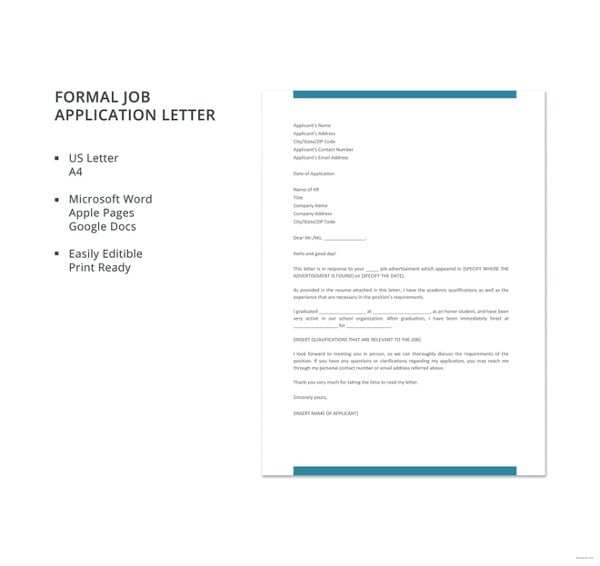
Sample Engineering Job Application Letter
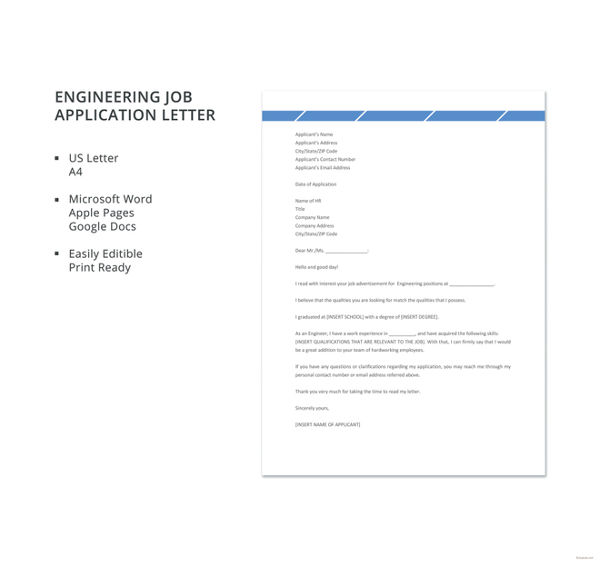
Application Letter Sample For Any Position
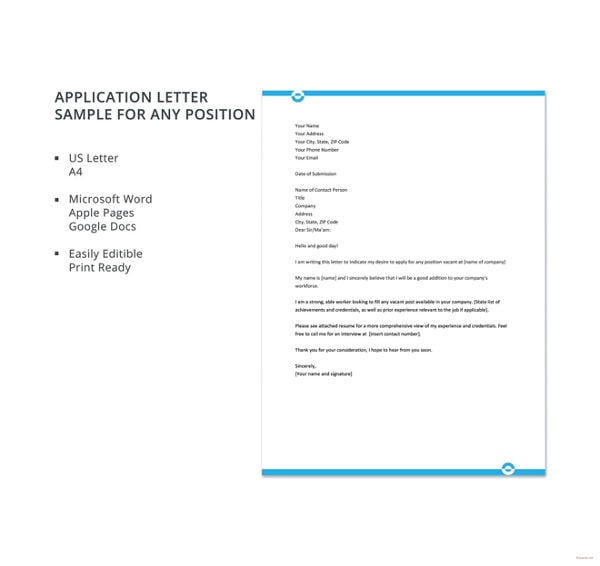
Email Job Application Letter Template
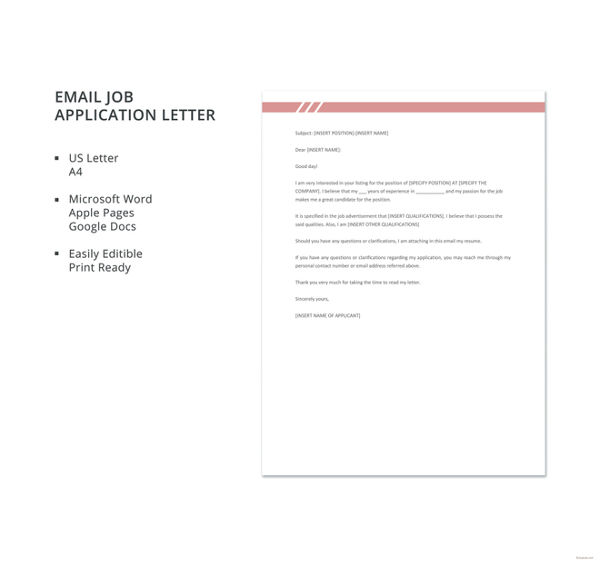
Accountant Job Application Letter Templates
Junior accountant job application letter.
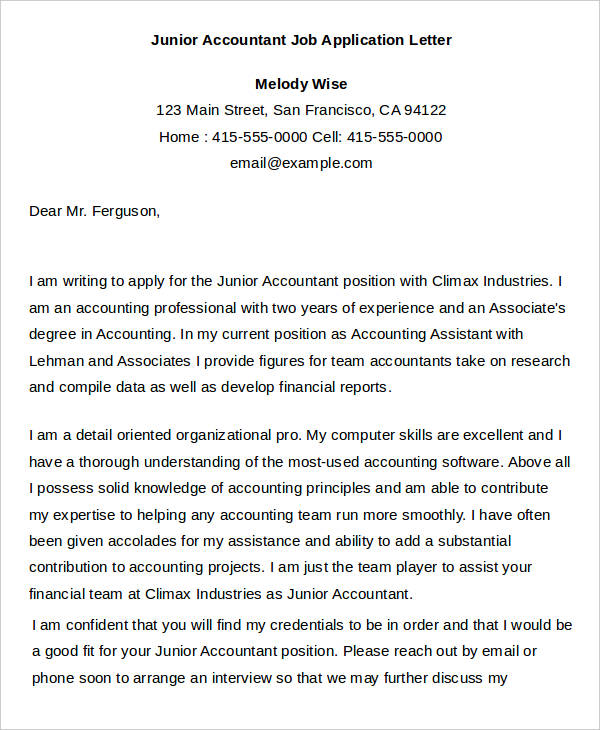
Accountant Job Application Letter with no Experience

Staff Accountant Job Application Letter
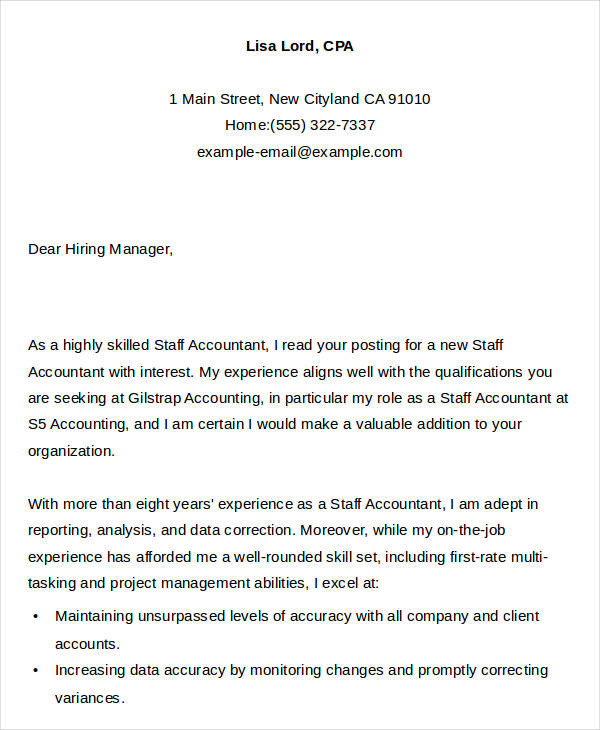
Bank Job Application Letter Templates
Fresh graduate bank job application letter.
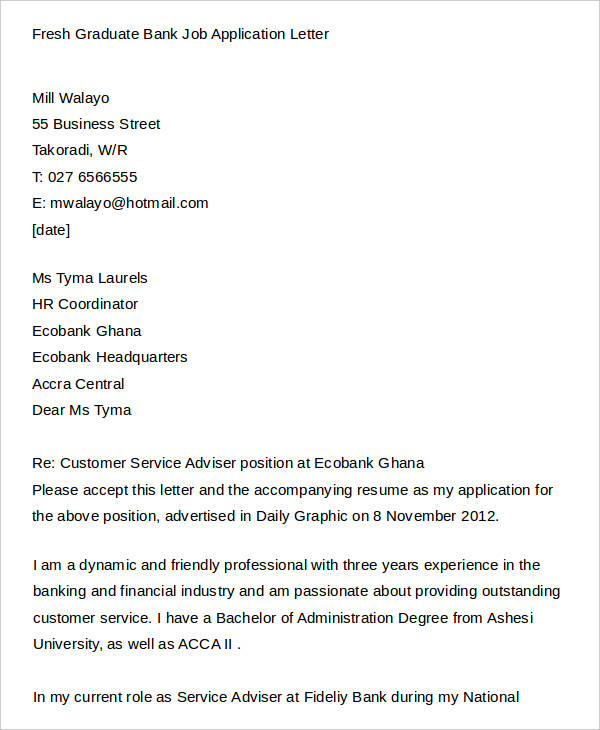
Bank Officer Job Application Letter
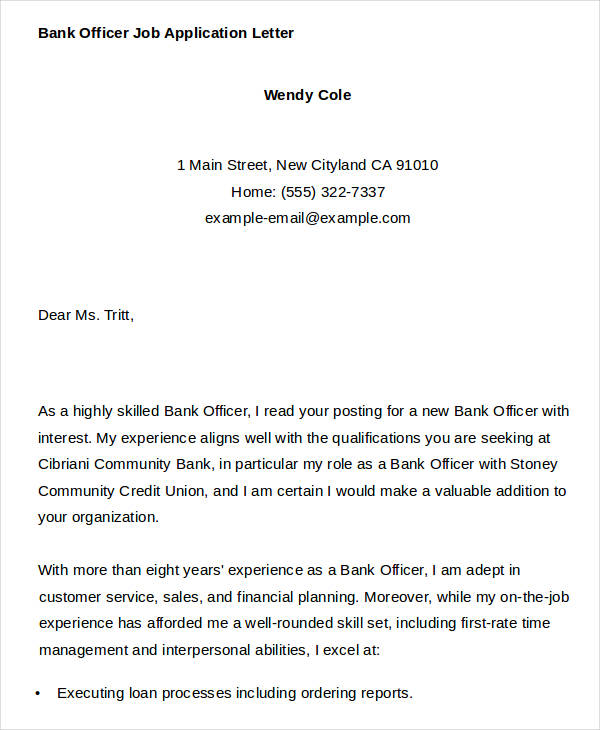
Bank Branch Manager Job Application Letter
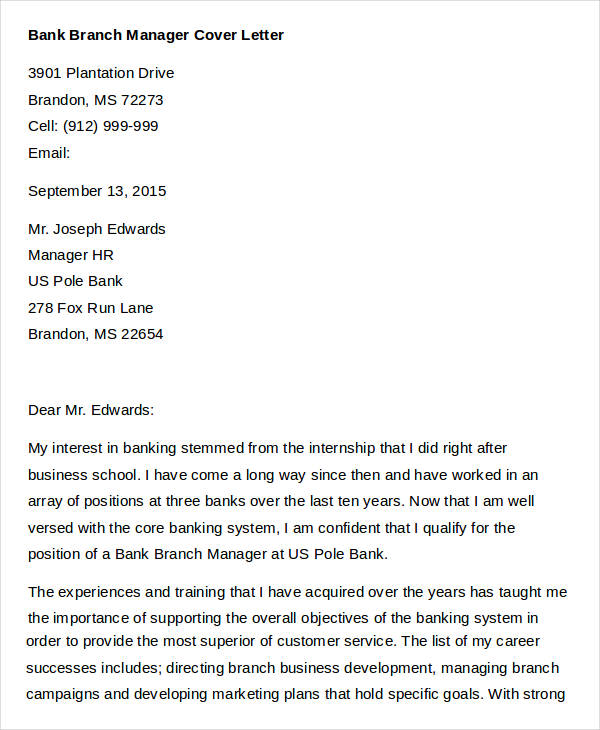
Bank Job Application Letter Template
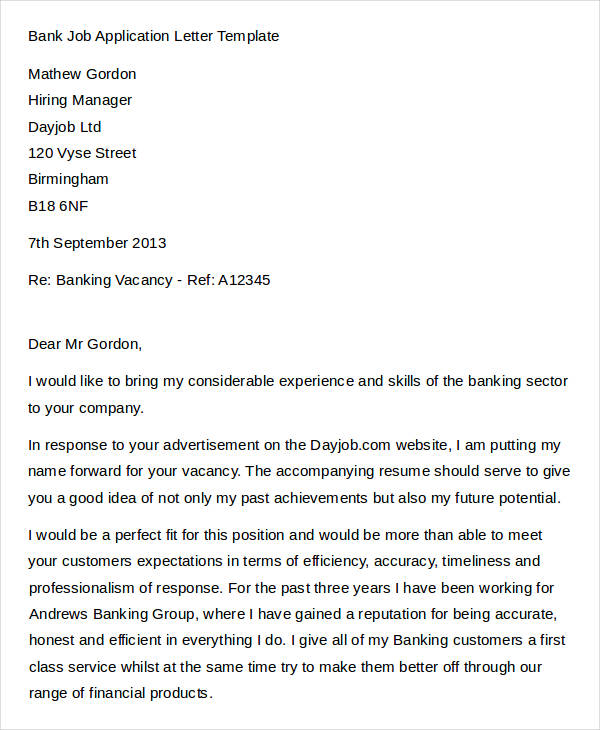
Importance of a Job Application Letter Template
- Writing a job application letter allow you to list down all the things that you need to include in your job application letter. This helps you to write all the items that you want to highlight and give focus on your qualifications that are needed to be known by your prospective employer.
- It will be easier for you to write a job application letter if you already have an outline or a guide of the content that you want to put into writing. Application letter templates acts as a rough draft where you may base the entire flow of your job application letter.
- Job application letter templates can assure you that you did not miss any details that should be present in the specific document.
- Job application letter templates allow us to follow a letter format which is essential in creating a professional impression. Proper placements of information and a smooth flow of discussion are a few of the major things that you need to consider in writing a application template .
Clerk Job Application Letter Templates
Registration clerk job application letter.
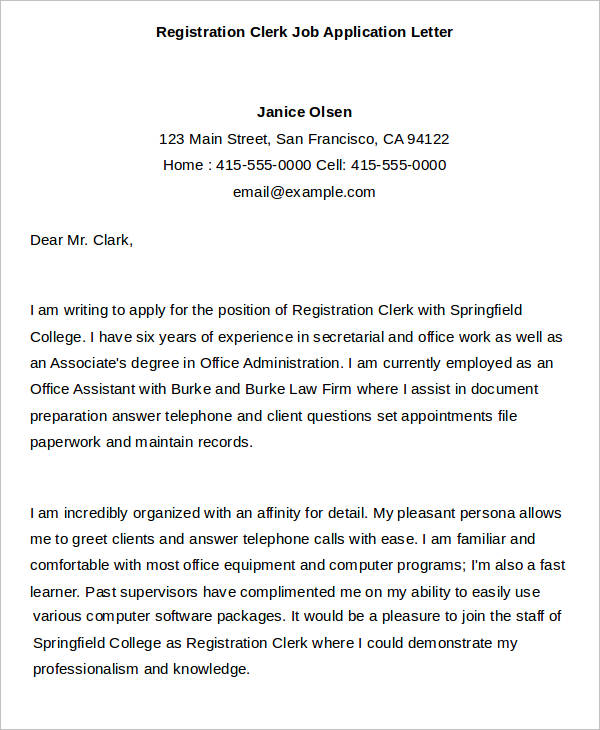
Entry Level File Clerk Job Application Letter
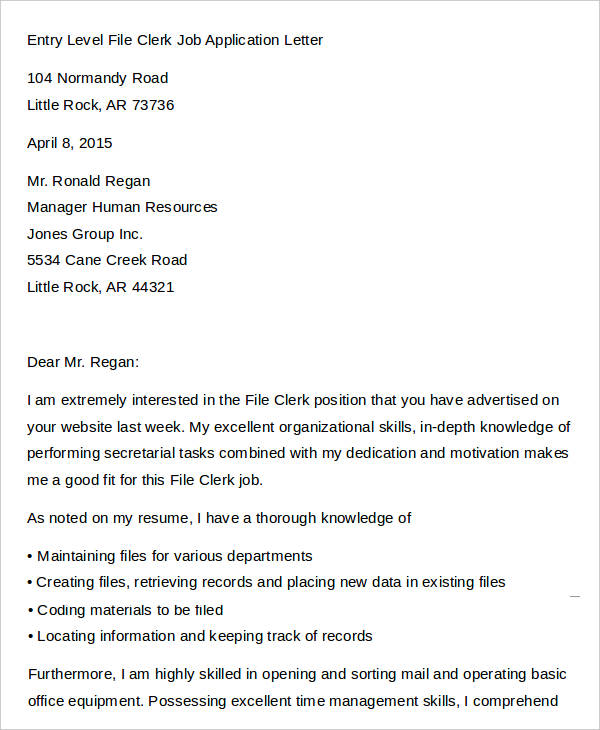
Admin Clerk Job Application Letter
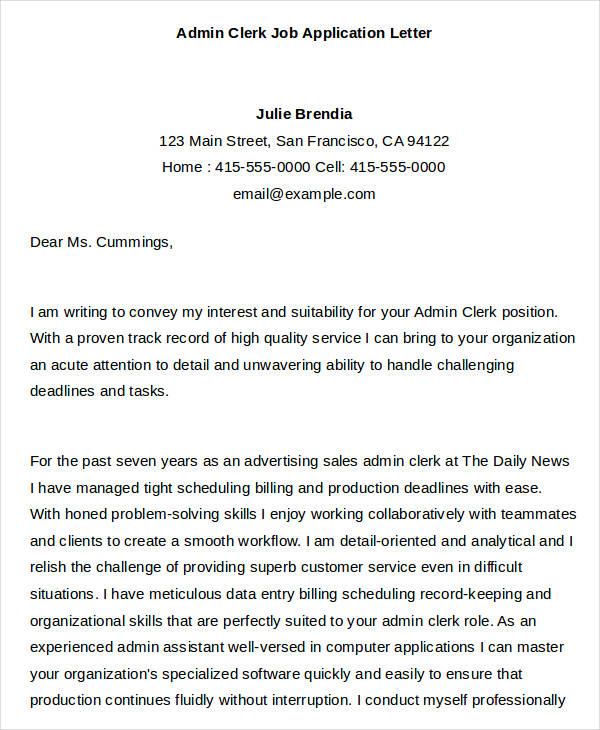
Hotel Job Application Letter Template
Hotel manager job application letter.

Marketing Job Application Letter Template
Marketing internship job application letter.
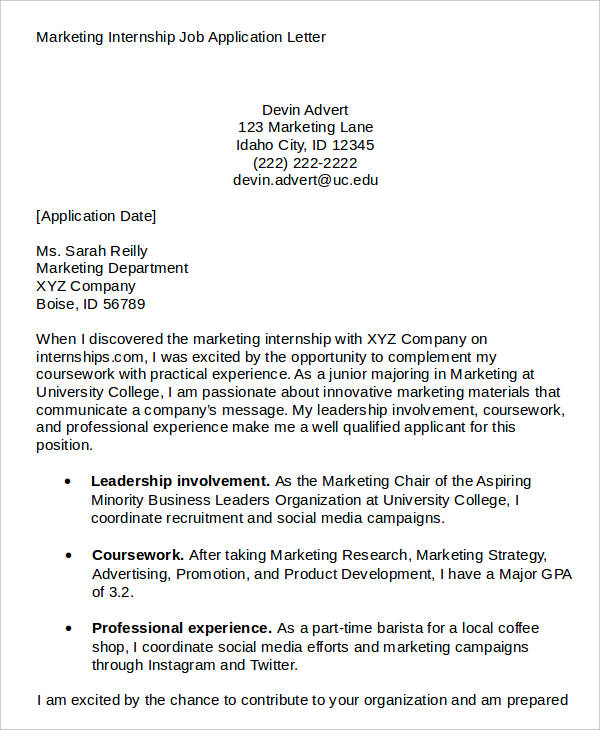
Marketing Assistant Job Application Letter
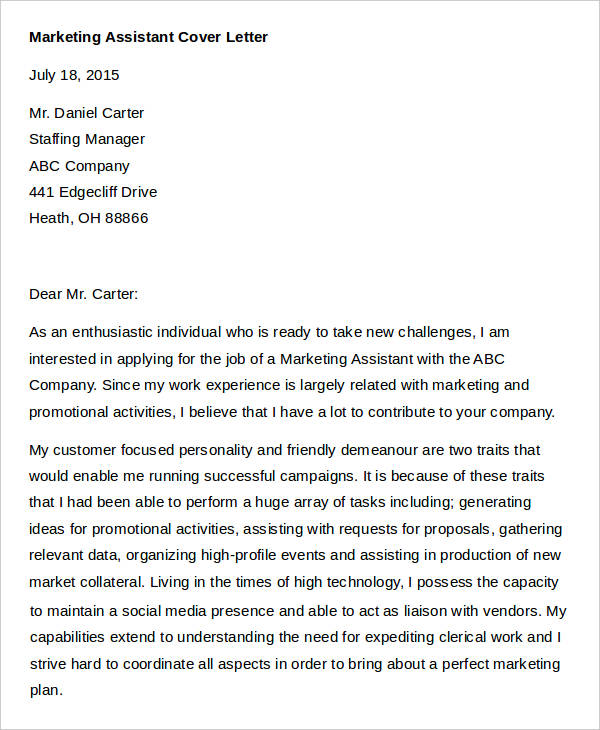
Focus of Job Application Letters
- The job position that you are applying for
- The nature of operations of the business that you want to be a part of
- The industry where the business belongs
- The job functions that you will be tasked to do should you be hired
- The alignment of all your qualifications to the requirements of the job
- Your strengths that can help you qualify for an interview
- Accountant job application letter templates should focus on your professional work experiences in the accounting industry, your knowledge on the finance and accounting processes, and your ability to create reports that are very essential in handling and documenting financial transactions.
- Bank job application letter templates should have the details of your knowledge about banking procedures, your ability to handle different kinds of clients that banks provide their services to and the professional roles that you have already played in the industry of banking.
- Clerk job application letter templates should be a guide that can provide information regarding your expertise in office administration and provide clerical support to any institution especially those that are related to the industry where you want to practice your competencies.
- Hotel job application letter templates should contain information about your knowledge in the job functions that are needed to be fulfilled once you get hired for the job position that you are applying for. You should also include your knowledge in various booking systems that are used in the hotel industry and the kind of customer service that is needed to be provided to hotel guests.
Manager Job Application Letter Templates
Sales manager job application letter.
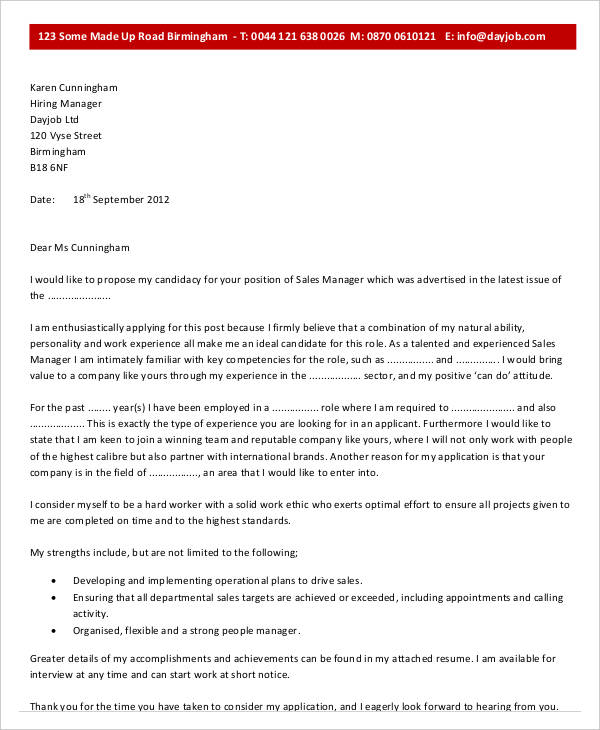
Finance Manager Job Application Letter
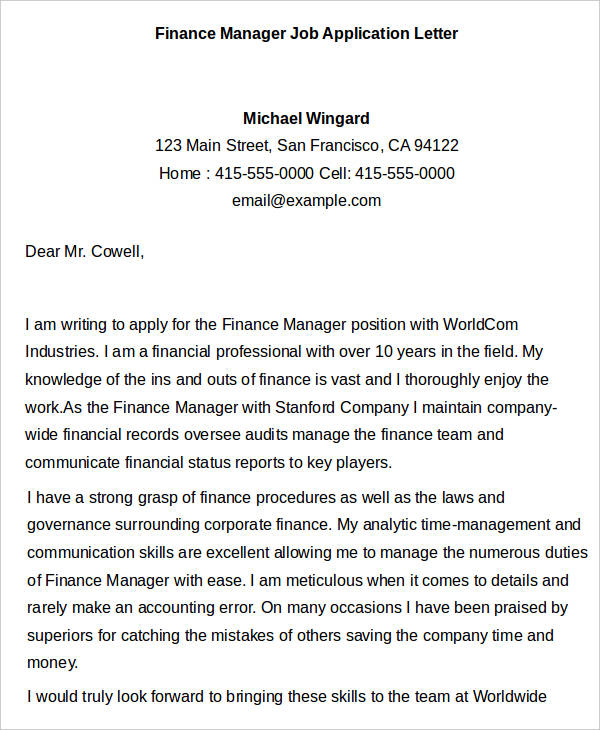
General Manager Job Application Letter
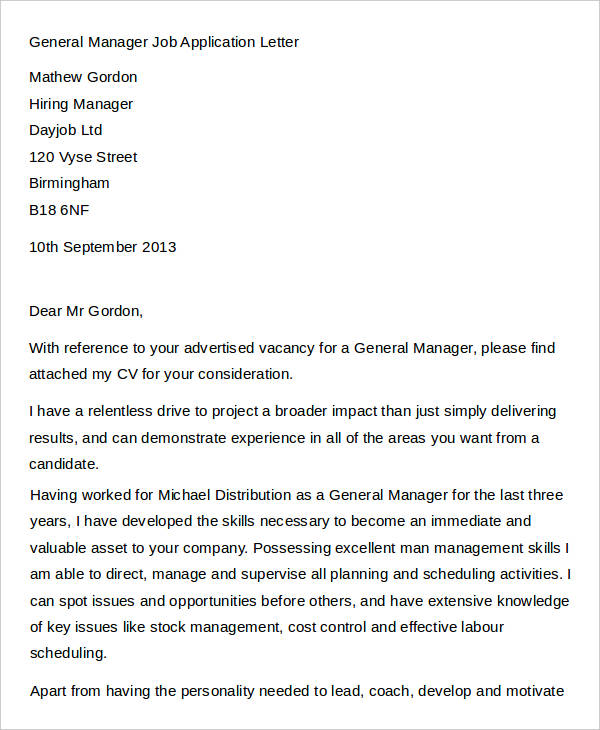
Steps in Creating a Job Application Letter Template
- Identify the industry where your expertise and other competencies match the field’s standards and basic requirements.
- Once you are already set with the kind of work environment that you want to immerse yourself in, assess the businesses that are present in the industry that you have selected and chosen a few of them where you want to apply.
- Know the job position that you are applying for . It is very important to create a job application letter that can directly show how you can possibly perform the job functions that will be given to you should you be hired.
- List down your technical skills , other skills, abilities, and talents and write how they can be of help in terms of your coping up to the business processes of the company where you are applying at.
- Identify whether your experiences are related to the industry and the business . As much as possible, cite your professional work experiences that are directly aligned with the job position that you want to have.
- Know the requirements of the company you are applying for and use them as guides in showcasing the items that you think will be very appealing to the human resource department of the company.
Receptionist Job Application Letter Templates
Front desk receptionist job application letter.
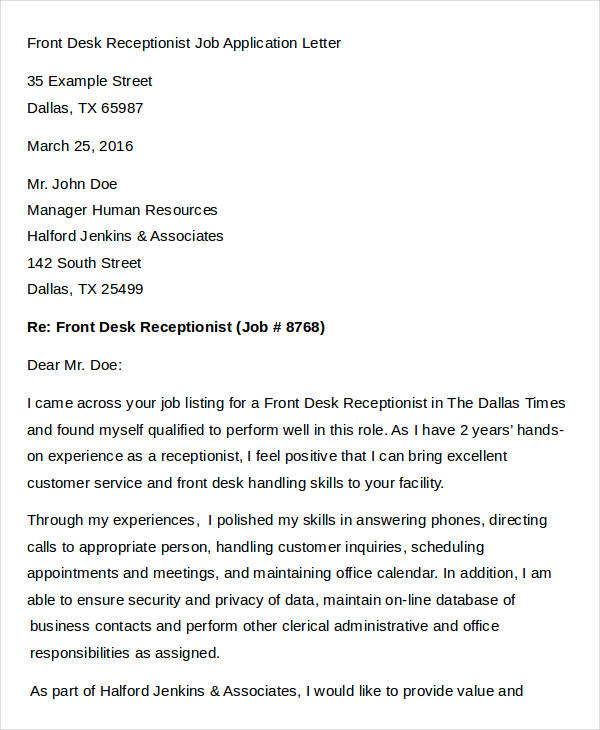
Entry Level Receptionist Job Application Letter
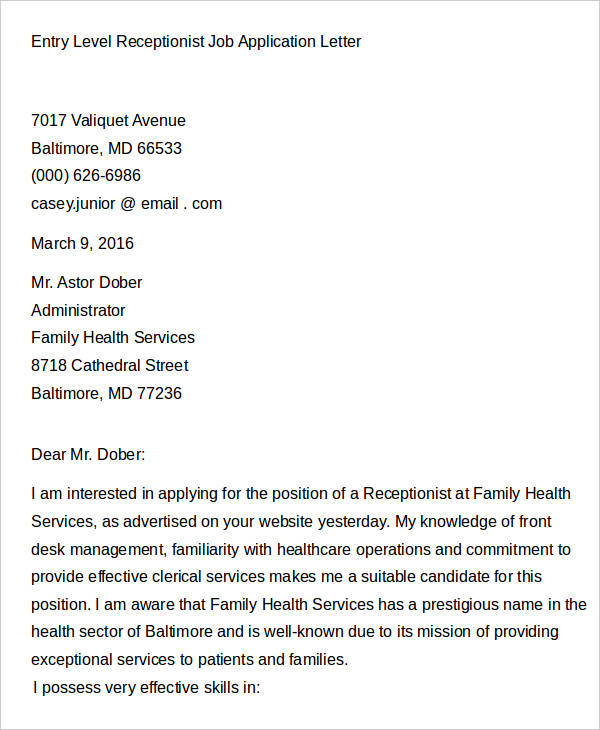
Teacher Job Application Letter Templates
Secondary teacher job application letter.
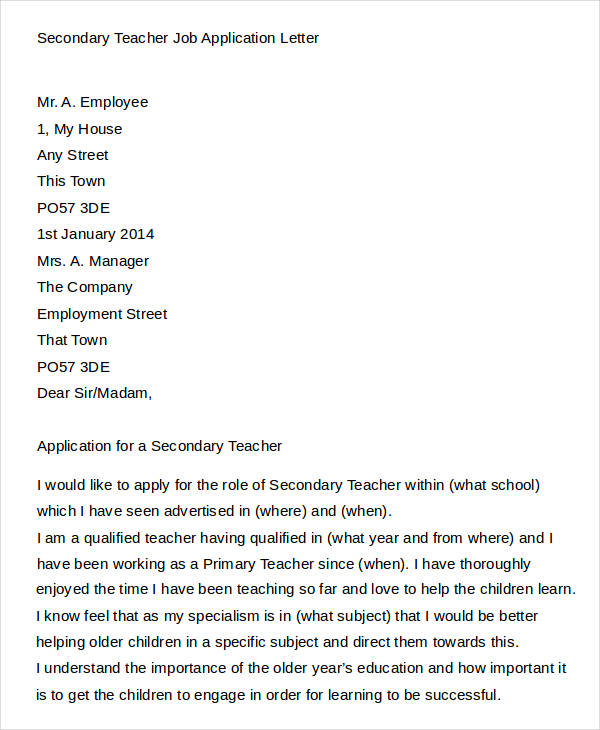
Computer Teacher Job Application Letter
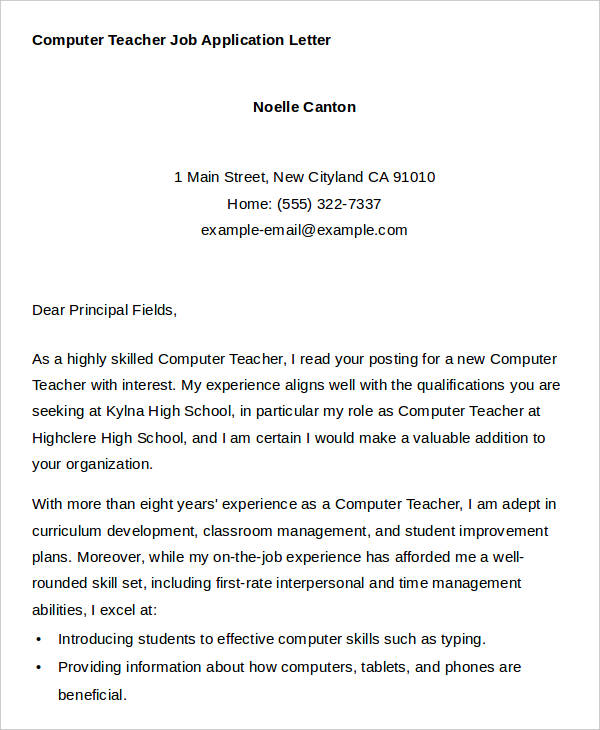
Application Letter for Teacher Job without Experience
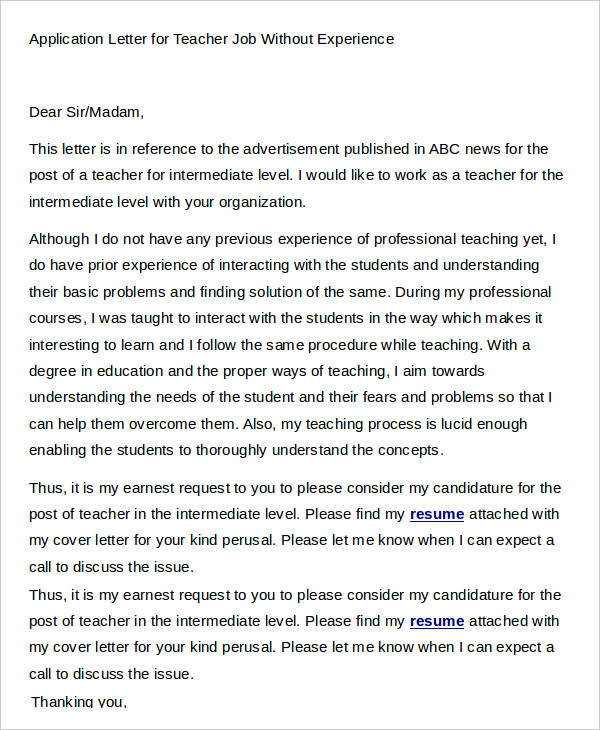
Art Teacher Job Application Letter
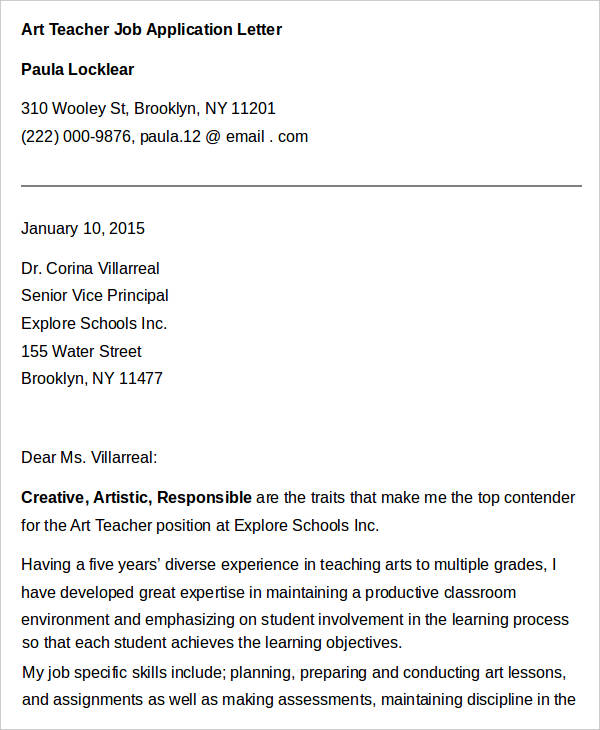
Customer Service Job Application Letter Templates
Customer service representative job application letter.
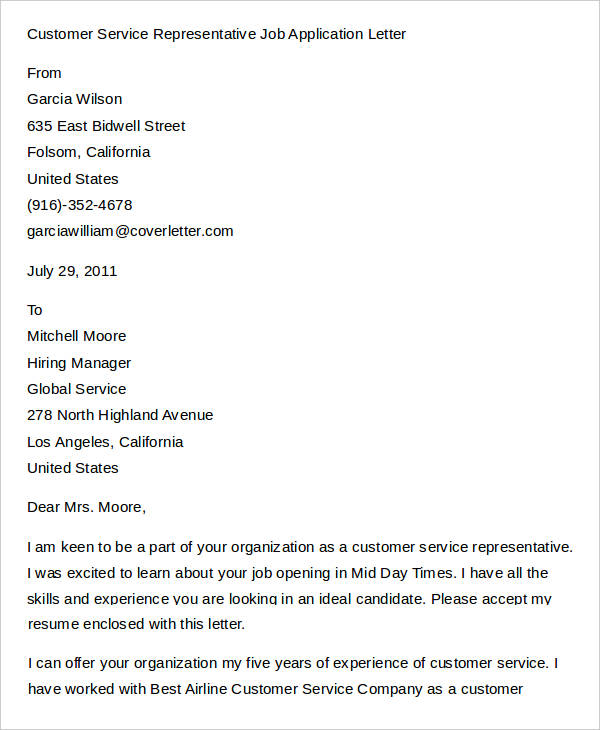
Customer Service Agent Job Application Letter
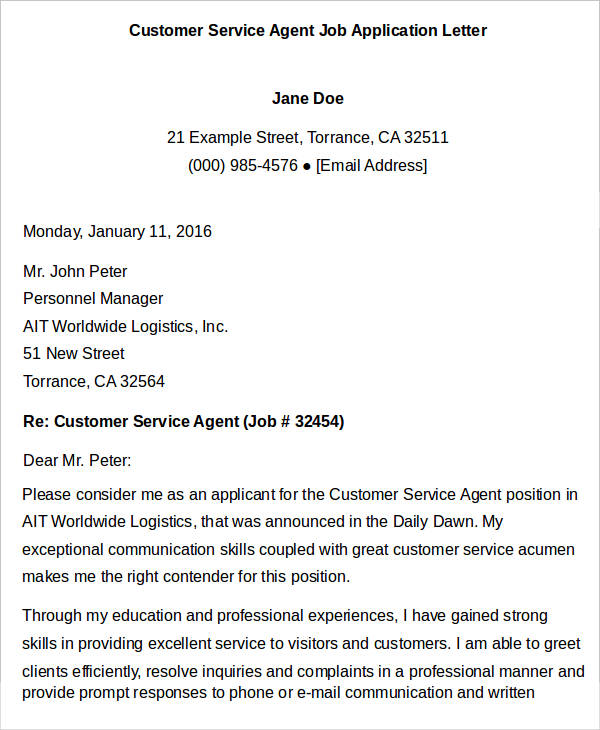
Customer Service Call Center Manager Job Application Letter
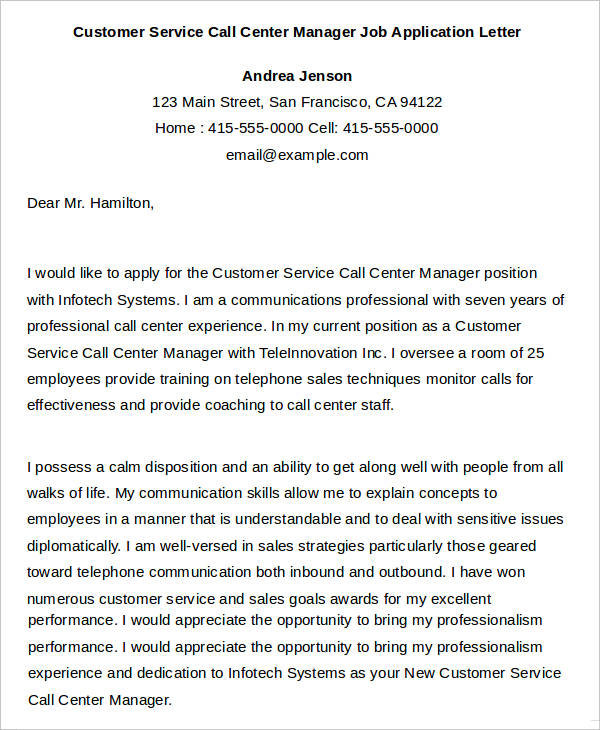
Engineering Job Application Letter Template
Industrial engineer job application letter.

Mechanical Engineer Job Application Letter
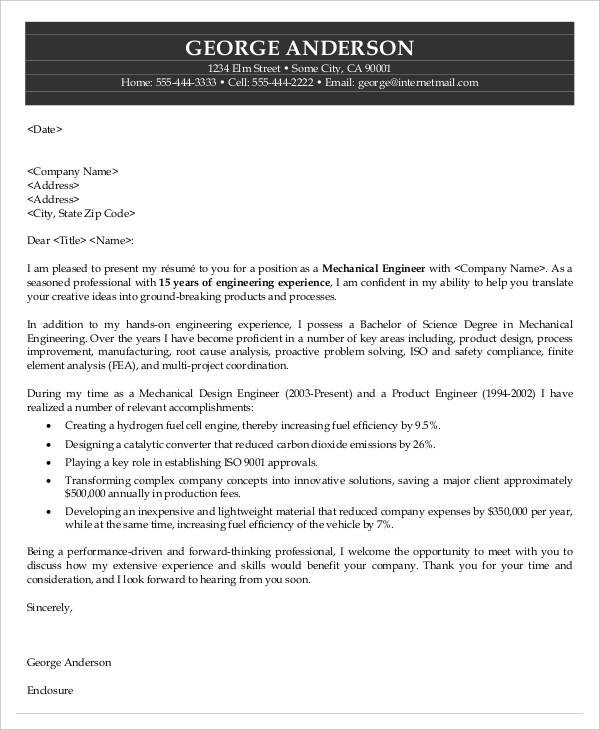
Medical Job Application Letter Templates
Medical healthcare assistant job application letter.
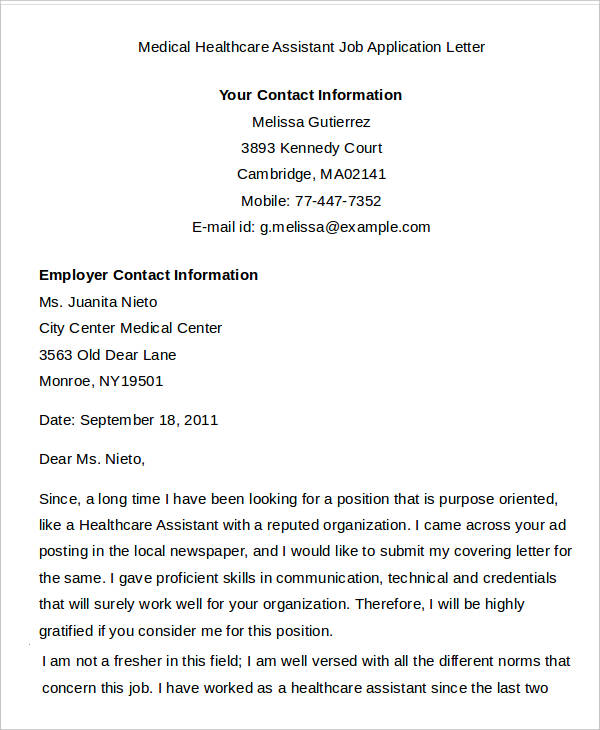
Tips for Writing The Best Job Application Letter
- Assure that everything that you write in the job application letter is based on reality. Once you get hired, you need to provide all the deliverable that you have included in your job application letter.
- Do not repeat the content of your resume . A Job Application Letter is a supporting document for your application. Use it wisely. Write down samples that can show how the details of your resume have been implemented or executed in real life instances.
- Make sure that your strengths are evident . Never create a job application letter that is too generic. Show your personality, your character, your professional work ethics and other qualities which can be the basis on why the company should have additional reasons to hire you.
- Do not just talk about yourself . Research about the company and write a few reasons why you have selected them as the business where you want your competencies and qualifications to be used as an additional value to their operations.
Professional Job Application Letter Templates
Professional experience job application letter.
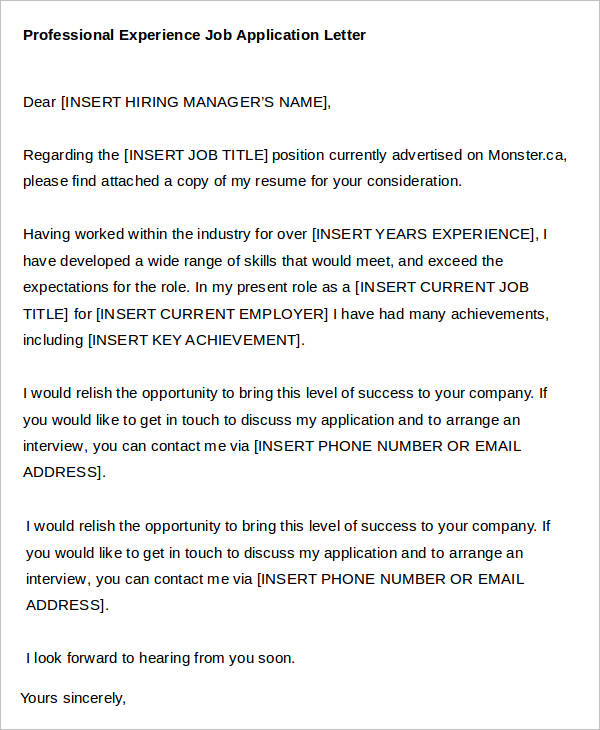
Data Entry Job Application Letter Templates
Data entry operator job application letter.
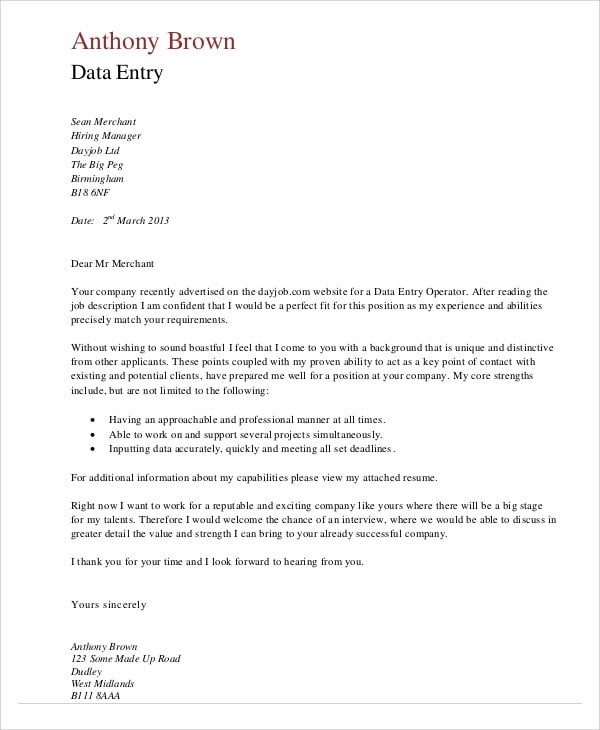
Data Specialist Job Application Letter
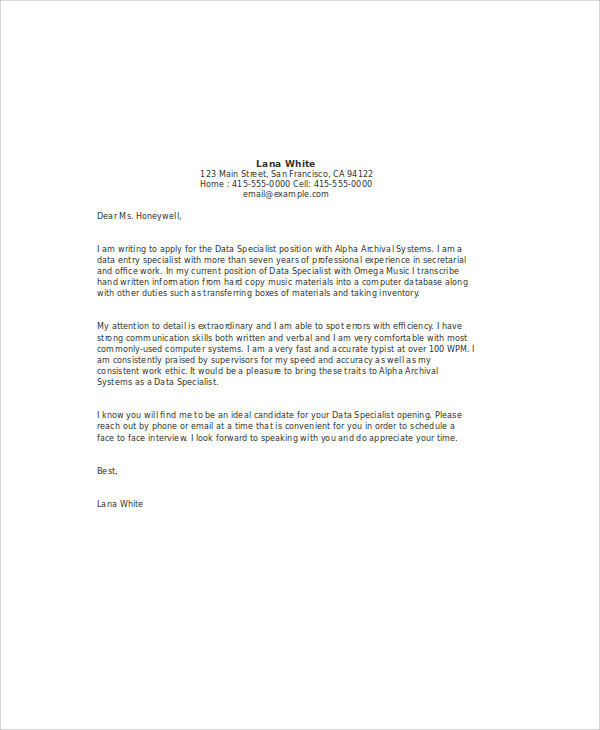
Data Entry Clerk Job Application Letter
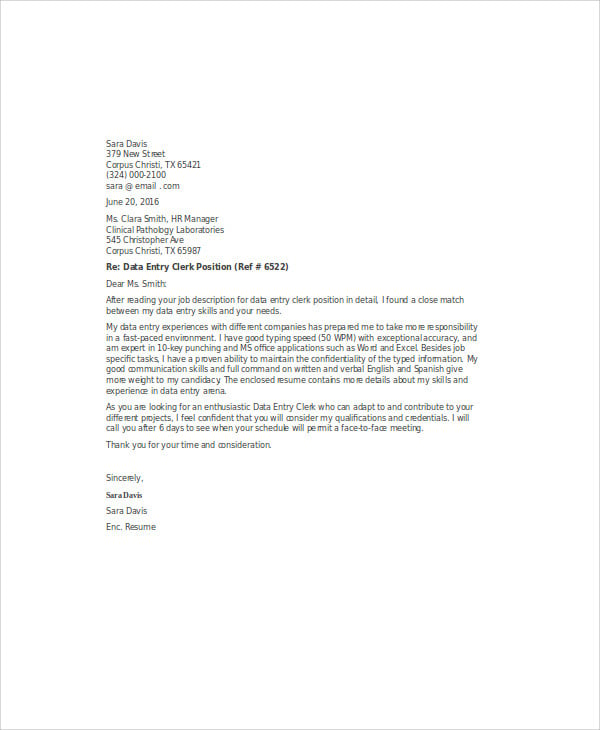
Graduate Job Application Letter Templates
College graduate job application letter.
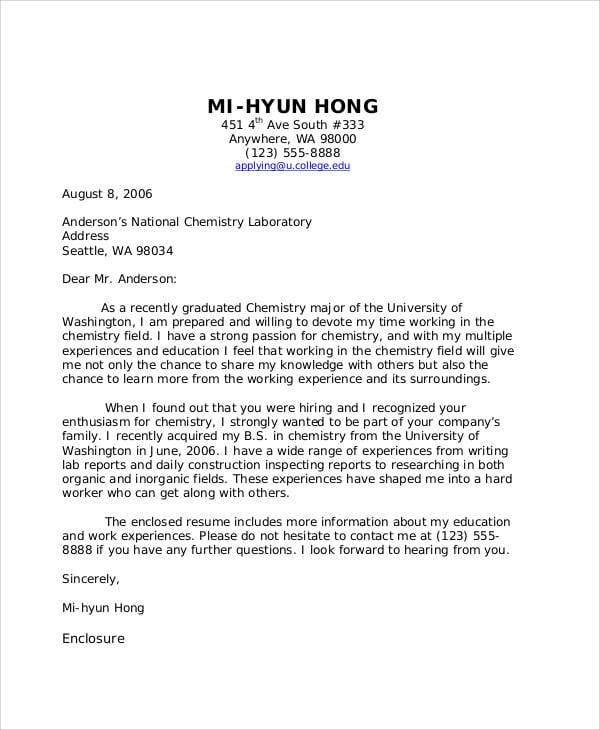
University Graduate Job Application Letter
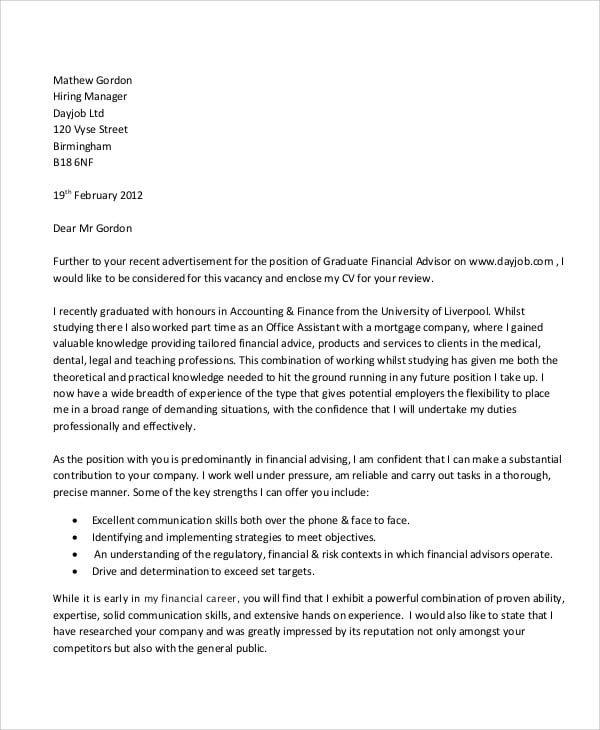
Graduate Trainee Job Application Letter
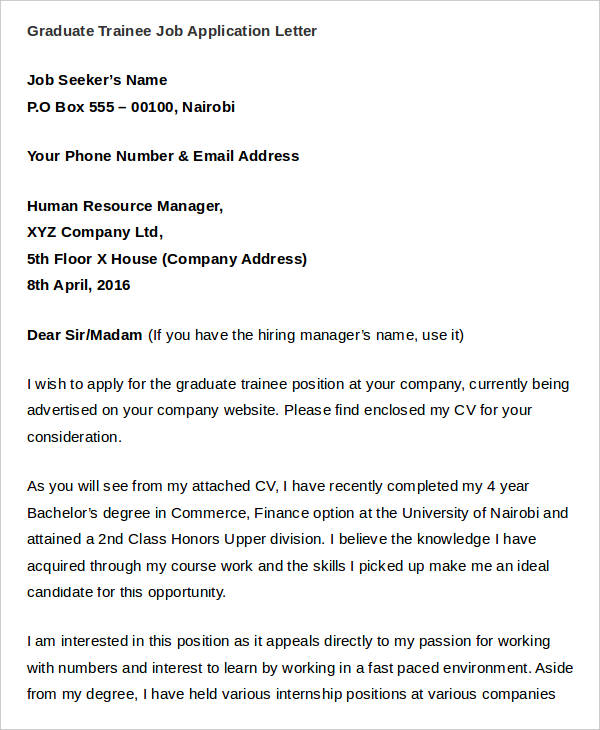
More in Letters
Support Application Letter Template
Scholarship grant application letter template, bank branch manager job application letter template, product marketing manager job application letter template, job application letter template, application introduction letter, job application executive letter, partnership application letter, job order letter, management application letter.
- FREE 26+ Covid-19 Letter Templates in PDF | MS Word | Google Docs
- Thank You Letter for Appreciation – 19+ Free Word, Excel, PDF Format Download!
- 69+ Resignation Letter Templates – Word, PDF, IPages
- 12+ Letter of Introduction Templates – PDF, DOC
- 14+ Nurse Resignation Letter Templates – Word, PDF
- 16+ Sample Adoption Reference Letter Templates
- 10+ Sample Work Reference Letters
- 28+ Invitation Letter Templates
- 19+ Rental Termination Letter Templates – Free Sample, Example Format Download!
- 23+ Retirement Letter Templates – Word, PDF
- 12+ Thank You Letters for Your Service – PDF, DOC
- 12+ Job Appointment Letter Templates – Google DOC, PDF, Apple Pages
- 21+ Professional Resignation Letter Templates – PDF, DOC
- 14+ Training Acknowledgement Letter Templates
- 49+ Job Application Form Templates
File Formats
Word templates, google docs templates, excel templates, powerpoint templates, google sheets templates, google slides templates, pdf templates, publisher templates, psd templates, indesign templates, illustrator templates, pages templates, keynote templates, numbers templates, outlook templates.
How to Write an Effective Follow-Up Email After Your Job Interview
You may have just had an interview or are waiting to hear from the hiring manager for an interview you attended a while back. In either situation, you can send a follow-up email to show your interest in the position and demonstrate professionalism. You may also want to email to stay in touch with someone you met during the interview. Preparing a well-crafted email can help you create a lasting impression and stand out from other job seekers. We look at various aspects to pay attention to, such as the timing to send the email and the structure and content of the message.
Here's what this article will cover:
Why are follow-up emails important?
When to send a follow-up email after a job interview, how to write a follow-up email.
Here are some reasons why sending follow-up emails might be important.
Shows your enthusiasm for the role
Sending a follow-up email demonstrates that you're a serious applicant and emphasises your continued interest in the position and company. You can show that you're willing to go the extra mile to secure the role. Your email can also communicate that your job search is ongoing and that other companies may want to hire you.
In Singapore, employers also like follow-up emails because they show that the job seeker is proactive, organised, and detail-oriented. The quality of your follow-up message may influence their hiring decision. It could be a deciding factor between two equally qualified applicants. Even if the company doesn't hire you for the role, sending a follow-up email can keep your application on the radar of hiring managers. They may be more likely to remember you and consider you for other suitable positions when future opportunities arise.
Quickens the decision-making process
Let's say, for example, that you attended an interview a month ago, but you've still not heard back from the hiring manager . You may have received offers from other companies but can't decide whether to continue waiting for a response or accept a job offer. Sending a follow-up email can help you take control of the job search process.
The recruitment process can be lengthy because companies work to hire the most suitable person for the role and company culture. They want to avoid making a costly hiring mistake. The hiring manager may decide to review your resume and cover letter and discuss your interview responses. Sending an email can help you understand where they are in the decision-making process.
The hiring manager may have told you that you can expect to hear back after a certain period. If you haven't had a response, it's best to follow up so that you can make informed decisions about your job search. Consider how interested you are in the position and whether you're willing to wait for the decision or accept another offer instead.
Demonstrates professionalism
A follow-up message helps you remain professionally connected with the hiring manager or potential employer. This makes it easier for you to contact them for another opening in the future. Maintaining positive relationships with hiring managers is essential to building your professional network. For example, if the hiring manager moves to another company, they may offer you a role there. There is research that shows that 70% of jobs don't appear publicly on job sites, and nearly 80% of hiring comes through personal and professional connections.
Ask additional questions
You may have missed asking particular questions during the interview , such as how the interview process works. Or you may want to clarify some questions or concerns after reflecting on the interview. You can ask these questions in your follow-up email. For example, you may want to know more about the rounds of interviews you'll need to go through or check if you need to submit additional application materials.

At the end of the interview, it's common practice in our country to ask the hiring manager about the next steps and when you can expect feedback, which shows proactive engagement. If you forget, you could include this question in your email. It's best not to send the thank-you email on the same day as the interview, as the hiring manager may be busy with other interviews throughout that day. At the same time, you don't want too much time to pass, such that they forget you. Ideally, send a thank-you note the next morning so they can see it when they start their day.
Usually, hiring managers get back to you in one to four weeks regarding the outcome of your interview. If that time has passed and you still haven't heard back from them, send a polite follow-up email on the same email thread. If they tell you your application has been unsuccessful, thank them for their time and consideration. Mention that you would like to stay in touch.
If the interviewer shares that your application is still under review, you can send a second follow-up email in one or two weeks. Then, decide if you still want to wait for their response or pursue another opportunity you may have a better chance of getting.
Follow these steps to craft a winning follow-up email .
1. Create a clear email subject line
First, decide on an email subject line to capture the hiring manager's attention. If you're sending an email after an interview, you can use " Thank you for your time " or " Interview follow up ". If you know there were multiple applicants for the role, you can include your name and interview date and time. For example, your subject line could be " Nadia Ali - Re: Interview on 15 May at 4 pm ".
If you're sending a follow-up email because you haven't heard from the interviewer in the time frame they mentioned, you can use subject lines such as " Checking in", "Following up", or "Application status check ". It's best to reply directly to an existing email thread you have with the hiring manager.
2. Begin with a professional greeting
You may be on first-name terms with the interviewer or recruiter, as you may have exchanged several emails and spoken in person by this time. In this case, it's acceptable for you to open your follow-up email using their first name. Otherwise, use their title and surname. For example, your professional greeting may be, " Dear Mrs Lim" or "Dear Mr Balakrishnan ".
3. Write a concise body paragraph
In the body of the email, express your appreciation for the interviewer's time and consideration. Mention the job title you're applying for to help them remember, as they may be interviewing for several roles simultaneously. It's also good to specify the company name to show that you've customised the follow-up email.
Reiterate your interest in the role and the company. You can specify something you discussed during the interview to personalise the email. Maintain a positive, courteous, and professional tone throughout the email. Avoid any small talk and be clear about the purpose of the message.
4. Have a strong closing
As you close the email, include a call to action. For example, you could ask when to expect a response or what additional documents to submit. Sign off professionally with "Best", "Best regards", or "Thank you". Use your full name in case another job seeker has the same first name as you.
Sample follow-up emails
Here are a few examples of different messages you can use as a guide to craft your own.
Follow-up email after job interview
Here's a follow-up email after an interview sample you can use:
Subject line: Thank you for the opportunity
Dear Mr Lee,
Thank you for your time yesterday. It was great to speak to you about the sales director role. I enjoyed connecting with you and learning more about the position and company. As we discussed during the interview, I'm attracted to the collaborative and supportive company culture. I'm confident I'm the right fit for the role, given my skills in building customer relationships and experience crafting successful sales strategies.
Please let me know if there's anything else I can send to enhance my application. I look forward to hearing from you in the coming two weeks.
Abdul Azman

Follow-up email after interview with no response
If you haven't heard back from the interviewer, send a concise email to ask for more information without sounding overly eager. You should only send this email if you haven't heard back two weeks after the interview. Here's a sample follow-up email when you haven't heard back from the interviewer:
Subject line: Checking in RE: mobile app developer role
Dear Ms Nurin,
I hope you're well. I'm checking in as you mentioned that you'd be making the final recruitment decision for the mobile app developer role by 10 January.
Please let me know if you have an update and if there are any additional details I can provide to assist in the decision-making process.
Jaslyn Chan
Follow-up email to stay in touch
If you didn't get the job, you can still make the best of the interview by building professional connections. Consider reaching out to someone you met during the interview process to see if they want to keep in touch, especially if you got along with them. They could also be a potential mentor if you want to grow in the field. Here's an example you can follow:
Subject line: Staying in touch
Dear Mr Karthik,
It was great to speak with you during the interview process for the English curriculum specialist role. You inspired me by how you equipped yourself with the latest learning methodologies. Even though the role didn't work out, I'd love to stay in touch.
Would you like to meet for coffee sometime in the next few weeks? I'm interested in learning about your career path and how you developed and applied your skills. I'm always looking for ways to diversify and strengthen my skill set.
In today's competitive job market, it's essential to differentiate yourself from other job seekers to secure the role you're aiming for. You can do this by sending a follow-up email after an interview to show your continued interest in the position. You can also learn about the interview outcome if you haven't heard back. A follow-up email also helps you stay in touch with the interviewer for other opportunities in the future. Craft professional emails to impress the interviewer and advance in your career.
Here are answers to common questions about follow-up emails.
- What should you say in a follow-up email after an interview? Thank the interviewer for their time. Mention that you're interested in the role and keen on working for that company. You can also ask any additional questions about the interview process, role, or company that you didn't get to ask during the interview. Offer to keep in touch if you feel you connected with them during the interview.
- How long should you wait after an interview to follow up? It's best to drop a thank-you note within 24 hours of the interview. If you don't hear back from the interviewer regarding the outcome of your application within the time frame they specified, it's good to send a second follow-up email. Singaporean employers appreciate promptness and attention to detail, and a timely follow-up email can help distinguish you from other candidates.
- How do you politely ask for an update after an interview? Specify the role you applied for, and mention that you would like to check the application's status. Add that you're happy to submit additional documents to help with the decision-making process.
- Is four days too soon to follow up after an interview? It's too soon if you're asking for the interview outcome. You can first send a thank-you email and wait until the time frame the interviewer gave you has elapsed.
- Is it normal to wait two weeks after an interview? Yes, some companies have a long hiring process. You can reach out after two weeks if the company hasn't responded to you with the outcome.
- Is it common for individuals to write follow-up emails after interviews in Singapore? Yes, it is quite common for individuals to send follow-up emails after job interviews in Singapore. This practice is viewed as an essential part of the job application process. Sending a follow-up email not only demonstrates professionalism and continued interest in the role but also helps the candidate stand out in a competitive job market.
Top search terms
Popular on jobstreet, explore related topics, subscribe to career advice.

IMAGES
VIDEO
COMMENTS
A well-written cover letter introduces you to potential employers, providing a glimpse into your personality, skills, and qualifications. This template helps you do that and more. Download it now! File format: Word (Microsoft) File size: 79 KB. Ready-to-use: fast, easy, and free. Download: cover letter in Word.
Follow these steps to compose a compelling application letter: 1. Research the company and job opening. Thoroughly research the company you're applying to and the specifications of the open position. The more you know about the job, the better you can customize your application letter. Look for details like:
Job Application Letter. A Job Application Letter is a critical tool for making a positive first impression on potential employers. It's your chance to showcase your skills and enthusiasm for the position. This guide, complete with letter examples, will walk you through the process of creating a compelling application letter.
Each basic template is free to download (compatible with Microsoft Word and Google Docs), and will help you create the perfect cover letter for whatever job you apply for. The Classic. "The Classic" cover letter template is clean, traditional, and the perfect format to start off your application. Chicago.
Best Alternatives to Word Cover Letter Templates. 1. Cascade. Cascade is one of our users' favorite templates. Its distinctive sidebar highlights your name and contact info, leaving ample space for the content of your cover letter. You can customize the colors, spacing, and fonts to make this template truly yours. 2.
Step 1: Open Microsoft Word, then click " New " from the menu bar on the left side of the window. Or you can go to "File", then click on " New from Template… " from the dropdown menu. Step 2 : Use the search bar at the top right of the window to narrow down the results to just cover letter templates.
This is an example of a good job application letter header: 2. Address the hiring manager. The next part of your cover letter is the contact person's information and a salutation (also called a greeting). To get started, write the hiring manager's contact information at the top-left of your letter of application, including their name ...
Tips for Writing a Job Application Letter. How to Get Started. Writing Guidelines. What to Include in Each Section. Simple Formatting Using a Template. Tips for Writing an Effective Letter. Sample Job Application Letter. Sending an Email Application. Review More Letter Examples.
This is how the letter of application should start: Show you're enthusiastic about applying for the position. Present your most impressive professional work achievement. Identify the company and the position you're applying for by name. Here's what it looks like: Sample Application Letter for a Job—First Paragraph.
2. Make sure the language you use is easy to read. You might be a literary wizard, but those long words won't impress the hiring manager if they make your letter difficult to read. 3. Use positive language. Positivity is the way forward when it comes to selling your skills to a potential employer.
An application letter accompanies a resume and may be uploaded to a job portal, sent via email, or even sent by postal mail, depending on the employer's requirements. Application letters are an ideal way to show your interest in a job and highlight your most relevant skills.
Format of an Application Letter. Create enough spacing: 1-1.15 between lines, 1-inch margins, double space between paragraphs. Choose the font: Garamond, Helvetica, or Arial in 11-12 points in a font size. Align the content to the left. Pick the file format: PDF, unless the recruiter requested a Word file specifically.
1. List Your Requirements And Skills. Before you write your application letter using MS Word, make a two-column sheet. Then, list both the requirements and your skills or any other qualifications. Afterward, compare your skills with the indicated job requirements. Always remember that you have a broad skill set.
A job application letter explains why you're applying for this position and what makes you qualified. An application letter closely resembles the function of a cover letter. It demonstrates your relevant qualifications for the position and convinces the employer to call you for an interview. This article will guide you on how to write an application letter for employment and feature samples of ...
A job application letter, also known as a cover letter, is a formal letter that accompanies your resume and introduces you to a potential employer. The purpose of a job application letter is to highlight your qualifications, experience, and skills that make you the perfect candidate for the job. It also helps employers understand your personality, work ethic, and how you plan to contribute to ...
47+ Resignation Letter Templates - Free Word, Excel, PDF, iPages. 19+ Sample Job Application Letters for Assistants - DOC, PDF. 14+ Job Application Letters For HR. 21+ Letter of Recommendation for Student - PDF, DOC. 11+ Part-Time Job Cover Letter Templates -Samples, Examples. 11+ Medical Letter Templates.
A typical job application letter ought to contain the following pieces of information: Name and Address of both Parties - These are the names and the addresses of both the applicant (you) and the recruiting company/potential employer.. Vacancy applied for - At any given time, an organization typically has many job vacancies at a time. It is important hence that you specify exactly which ...
Introduction. The cover letter gives brief details about the job applicant as it links the potential employer to the applicant's curriculum vitae and is usually about three to four sentences long. For example: "I am Victor Paul, applying for the Sales Representative position at Monte Crafts Limited.
29+ Job Offer Letter Examples. 47+ Resignation Letter Templates - Free Word, Excel, PDF, iPages. 19+ Sample Job Application Letters for Assistants - DOC, PDF. 14+ Job Application Letters For HR. 21+ Letter of Recommendation for Student - PDF, DOC. 11+ Part-Time Job Cover Letter Templates -Samples, Examples.
1. Standard Cover Letter Sample. When searching for a Standard Cover Letter sample, ensure it includes a professional introduction expressing your interest in the specific job and briefly highlights your key qualifications and how they align with the position's requirements, setting the tone for a comprehensive application. DOWNLOAD IN WORD.
4. Use short words rather than long phrases. Without realizing it, we sometimes write unnecessarily long phrases on professional documents when a single word is enough. After you've written your cover letter, go back and reread it. Replace longer phrases with single words (or at least fewer words).
A cover letter is a single-page letter that you include with your job application. You should always include a cover letter, unless the job advertisement clearly says not to. The purpose of a cover letter. When writing a cover letter, you should: introduce yourself; mention the job (or type of job) you're applying for (or looking for)
Our Job Application Letter Example makes your simple letters personal and professionally written. Whether you prefer handwritten or electronic letters, each Job Application Letter in PDF features prewritten sample content for a request letter, application, references, and more!Explain your intent and boost your simple resumes to be the right candidate for the role.
195 resume power words to supercharge your application. To make your resume stand out, use words that showcase your achievements. Here's a list of resume power words designed to help your application leave a lasting impression on hiring managers. Resume action verbs. Strong action verbs communicate your exact responsibility in a job role.
Request for leave letter example. While the above example is a generic letter that can be tailored to any type of leave, here are more specific examples for a leave request letter you can use for inspiration for your own email. Personal leave request example. Subject: Personal leave request Dear Chris,
47+ Resignation Letter Templates - Free Word, Excel, PDF, iPages. 19+ Sample Job Application Letters for Assistants - DOC, PDF. 14+ Job Application Letters For HR. 21+ Letter of Recommendation for Student - PDF, DOC. 11+ Part-Time Job Cover Letter Templates -Samples, Examples. 11+ Medical Letter Templates.
Use your full name in case another job seeker has the same first name as you. Sample follow-up emails. Here are a few examples of different messages you can use as a guide to craft your own. Follow-up email after job interview. Here's a follow-up email after an interview sample you can use: Subject line: Thank you for the opportunity. Dear Mr Lee,